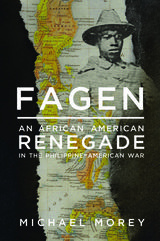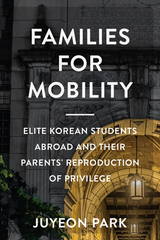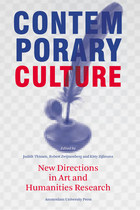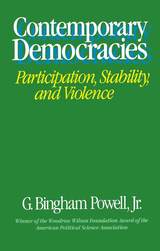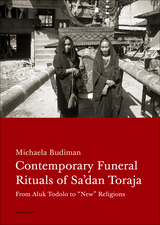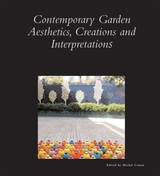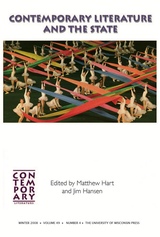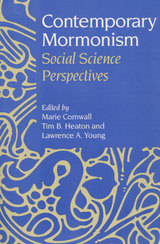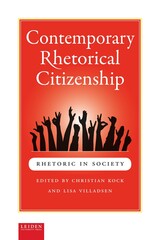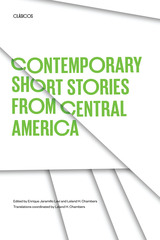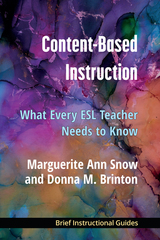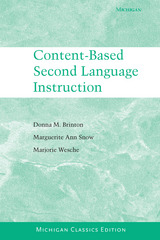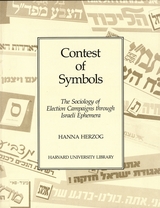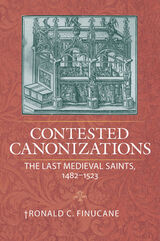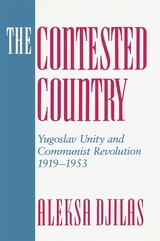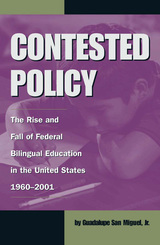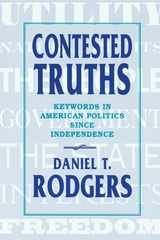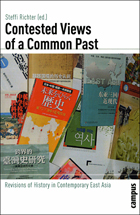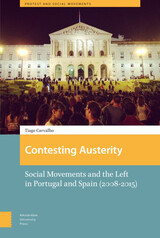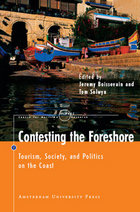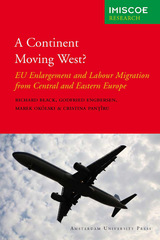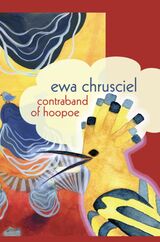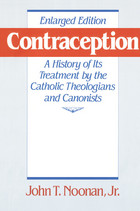 Contemporary Chinese Law: Research Problems and Perspectives
Jerome Alan Cohen
Harvard University Press, 1970 Recently scholars have become increasingly aware that the study of Chinese law can provide new insight into the forces actually at work in Chinese society in different epochs. In an effort to encourage and facilitate the study of this subject, the thirteen essays of this volume deal with the methodology of studying the legal system of the People's Republic, describe the available research materials, and analyze the problems presented in making the materials of Chinese law intelligible to Western readers. They also review foreign works on Chinese law and explore the difficulties involved in translation and in comparing the Chinese system to our own and to that of the Soviet Union.
Mr. Cohen's thoughtful introduction provides an excellent survey of the worldwide development of studies of Chinese law. It also delineates the nature of the essays that he and the eleven other scholars have contributed to the volume.
 Contemporary Colonialities: Kurds and Kashmiris
Dibyesh Anand and Nitasha Kaul
University of Westminster Press, 2025 We live in a world dominated by states and statist knowledge; this is a world where, for multiple institutional and political reasons, it is rare to speak of more than one stateless nation, and there is a conspicuous neglect of non-Western colonial practices. This volume brings together scholarship on two peoples associated with 'conflict' but who we argue are best described as 'stateless nations': Kurds and Kashmiris. Both these contexts raise important questions relating to coloniality, sovereignty, statehood, self-determination and human rights, and yet they have never been studied together. Our intervention challenges the 'sovereignty privilege' in International Relations and calls upon postcolonial and decolonial studies to take anti-colonialism seriously by focusing on contemporary stateless nations. The Kurdish and Kashmiri conflicts are more than power-laden contestations by states over territories; they are colonialities of power experienced by embodied individuals and involve mobilised communities of stateless nations with different gendered and political vulnerabilities. "This book addresses the complex issue of colonialism and nationalism among the Kurds who live in Turkey and the Kashmiris who live in the valley of Kashmir. For those wishing to understand the respective political, religious and social challenges of both groups, this book is essential reading." Victoria Schofield, author of Kashmir in the Crossfire and Kashmir in Conflict
Contemporary Culture: New Directions in Art and Humanities Research
Edited by Judith Thissen, Robert Zwijnenberg, and Kitty Zijlmans
Amsterdam University Press, 2013 Are the humanities still relevant in the twenty-first century? In the context of pervasive economic liberalism and shrinking budgets, the importance of humanities research for society is increasingly put into question. This volume claims that the humanities do indeed matter by offering empirically grounded critical reflections on contemporary cultural practices, thereby opening up new ways of understanding social life and new directions in humanities scholarship. The contributors argue that the humanities can regain their relevance for society, pose new questions and provide fresh answers, while maintaining their core values: critical reflection, historical consciousness and analytical distance.
Contemporary Democracies: Participation, Stability, and Violence
G. Bingham Powell Jr.
Harvard University Press, 1982 Why do some democracies succeed while others fail? In seeking an answer to this classic problem, G. Bingham Powell, Jr., examines the record of voter participation, government stability, and violence in 29 democracies during the 1960s and 1970s. The core of the book and its most distinguishing feature is the treatment of the role of political parties in mobilizing citizens and containing violence.
 Contemporary Design Education in Australia: Creating Transdisciplinary Futures
Edited by Lisa Scharoun, Deanna Meth, Philip Crowther, et al.
Intellect Books, 2023 New essays on education for the future of the design industry.
This book offers a range of approaches to teaching higher education design students to learn to design collaboratively and creatively, through transdisciplinary, multidisciplinary, cross-disciplinary, and interdisciplinary learning experiences. It highlights that the premise of traditional disciplinary silos does little to advance the competencies needed for contemporary design and non-linear career paths and emphasizes the importance of higher education being responsive to changes in society, including fluctuating market demands, economic variations, uncertainties, and globalization. Chapters highlight approaches that address this changing landscape, to meet student, industry, and societal needs and reflect a range of design education contexts in which the authors have taught, with a focus on experiences at the Queensland University of Technology (QUT), Brisbane, Australia, but also including collaborations and comparative discussions elsewhere in Australia and globally, including Europe, Asia, the Middle East, and the United States.
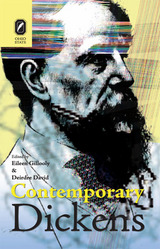 Contemporary Dickens
Edited by Eileen Gillooly and Deirdre David
Ohio State University Press, 2008 Edited by Eileen Gillooly and Deirdre David, Contemporary Dickens is a collection of essays that presents some of the most intriguing work being undertaken in Dickens studies today. Through an emphasis on the nineteenth-century origins of our current critical preoccupations and ways of knowing, these essays reveal Dickens to be our contemporary. The contributors argue that such issues as gender and sexuality, environmentalism, and the construction of national identity were frequently explored and sometimes problematically resolved by Dickens himself. They also illuminate the importance of Dickens’s place in our current reassessment of critical methodologies. Drawing freely upon a variety of reading strategies (materialist, deconstructive, new historical, psychoanalytic, and feminist), the essays disclose new aspects of Dickens’s engagements with a number of Victorian concerns—moral philosophy, the psychology of the emotions, and life writing among them—that have once again emerged as significant objects of study in early-twenty-first century criticism. Looking at such familiar topics from fresh perspectives, Contemporary Dickens is an original and challenging contribution to Dickens studies in particular and Victorian criticism in general. Contemporary Dickens will appeal to general readers and students of Victorian culture, as well as specialists in nineteenth-century literature, cultural studies, literary formalism, psychology, and gender studies.
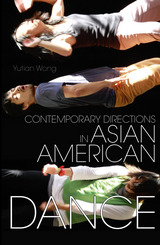 Contemporary Directions in Asian American Dance
Edited by Yutian Wong
University of Wisconsin Press, 2018 The definition of Asian American dance is as contested as the definition of “Asian American.” The term encompasses not only a range of national origins but also a dazzling variety of theoretical frameworks, disciplinary methods, and genres—from traditional to postmodern to hip hop.
The contributors to this volume address such topics as the role of the 1960s Asian American Movement in creating Japanese American taiko groups, and the experience of internment during World War II influencing butoh dance in Canada. Essays about artists such as Jay Hirabayashi, Alvin Tolentino, Shen Wei, Kun-Yang Lin, Yasuko Yokoshi, Eiko & Koma, Sam Kim, Roko Kawai, and Denise Uyehara look closely at the politics of how Asian aesthetics are set into motion and marketed. The volume includes first-person narratives, interviews, ethnography, cultural studies, performance studies, and comparative ethnic studies.
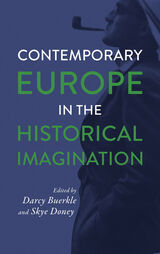 Contemporary Europe in the Historical Imagination
Edited by Darcy Buerkle and Skye Doney
University of Wisconsin Press, 2023 George L. Mosse (1918–99) was one of the most influential cultural and intellectual historians of modern Europe. A refugee from Nazi Germany, he was an early leader in the study of fascism and the history of sexuality and masculinity, authoring more than two dozen books. In Contemporary Europe in the Historical Imagination, an international assembly of leading scholars explore Mosse’s enduring methodologies in German studies and modern European cultural history. Considering Mosse’s life and work historically and critically, the book begins with his intellectual biography and goes on to reread his writings in light of historical developments since his death, and to use, extend, and contend with Mosse’s legacy in new contexts he may not have addressed or even foreseen.
The volume wrestles with intertwined questions that continue to emerge from Mosse’s pioneering research, including: What role do sexual and racial stereotypes play in European political culture before and after 1945? How are gender and Nazi violence bound together? And what does commemoration reveal about national culture? Importantly, the contributors pose questions that are inspired by Mosse’s work but that he did not directly examine. For example, to what extent were Nazism and Italian Fascism colonial projects? How have popular radical right parties reinforced and reimagined ethnonationalism and nativism? And how did Nazi perpetrators construct a moral system that accommodated genocide? Much like Mosse’s own work, the chapters in this book inspire new interventions into the history of gender and sexuality, Jewish identity during the rise of the Third Reich, and the many reincarnations of fascist pageantry and mass politics.
 Contemporary Feminist Fiction and a Case for Expanding Rhetorical Narratology
Katherine J. Weese
Ohio State University Press, 2025 In Contemporary Feminist Fiction and a Case for Expanding Rhetorical Narratology, Katherine J. Weese explores intersections among rhetorical, unnatural, and feminist narrative theories and post-postmodern theory to argue that an expanded rhetorical poetics offers the most comprehensive model for illuminating recent works that employ unnatural devices for feminist purposes. This pluralist narratological framework is a vital counterpoint to theorists’ tendency to read twentieth- and twenty-first-century novels through a post-postmodernist or metamodernist lens that overlooks unnatural, feminist, and rhetorical narrative theories.
Examining Ali Smith’s The Accidental and Hotel World, Barbara Kingsolver’s The Poisonwood Bible, Toni Morrison’s Beloved, Kate Atkinson’s A God in Ruins and Life After Life, and Ruth Ozeki’s A Tale for the Time Being, Weese demonstrates how various narratological theories inform rather than compete with one another. Through an expanded rhetorical poetics, including a refined version of James Phelan’s MTS (mimetic, thematic, synthetic) model, she reframes post-postmodern theorists’ concerns with communicative function through a narratological lens to make the case that exploring the rhetorical function of unnatural devices challenges and extends the claims of narrow metamodern readings.
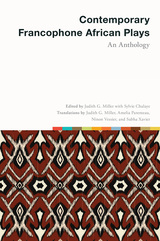 Contemporary Francophone African Plays: An Anthology
Judith G. Miller
Bucknell University Press, 2024 Bringing together in English translation eleven Francophone African plays dating from 1970 to 2021, this essential collection includes satirical portraits of colonizers and their collaborators (Bernard Dadié’s Béatrice du Congo; Sony Labou Tansi’s I, Undersigned, Cardiac Case; Sénouvo Agbota Zinsou’s We’re Just Playing) alongside contemporary works questioning diasporic identity and cultural connections (Koffi Kwahulé’s SAMO: A Tribute to Basquiat and Penda Diouf’s Tracks, Trails, and Traces…). The anthology memorializes the Rwandan genocide (Yolande Mukagasana’s testimony from Rwanda 94), questions the status of women in entrenched patriarchy (Werewere Liking’s Singuè Mura: Given That a Woman…), and follows the life of Elizabeth Nietzsche, who perverted her brother’s thought to colonize Paraguay (José Pliya’s The Sister of Zarathustra). Gustave Akakpo’s The True Story of Little Red Riding Hood and Kossi Efoui’s The Conference of the Dogs offer parables about what makes life livable, while Kangni Alem’s The Landing shows the dangers of believing in a better life, through migration, outside of Africa.
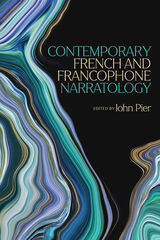 Contemporary French and Francophone Narratology
Edited by John Pier
Ohio State University Press, 2020 The essays included in this collection seek to take the pulse of recent developments in narratological research in the French-speaking countries. Theorists in these countries heavily participated in and shaped narratology, an outgrowth of the structuralist movement during the 1960s and 1970s. While US, German, and Scandinavian theorists took the forefront in the 1990s, narratology in France faded into the background. It was not until the turn of the century that a new interest in narratological issues among French researchers emerged. Activity in the field has since intensified, spurred on, in part, by the realization that narratology cannot be summed up by its formalist and structuralist origins. Well-versed in French narrative theory, both classical and more recent, the authors in this collection also draw on scholarship coming from other research traditions. The result is that these contributions offer a number of syntheses and perspectives representative of recent French-language scholarship in the field that readers may not be familiar with or that provide them with further insight into subjects they may have encountered in other contexts. This volume will leave readers with a greater awareness of the directions taken by present-day French-language narratology as well as new and developing themes in narrative theory generally. Contributors Raphaël Baroni, Denis Bertrand, Olivier Caïra, Claude Calame, Benoît Hennaut, Françoise Lavocat, Sylvie Patron, John Pier, Françoise Revaz, and Richard Saint-Gelais
Contemporary Funeral Rituals of Sa'dan Toraja: From Aluk Todolo to "New" Religions
Michaela Budiman
Karolinum Press, 2013 The Sa’dan Toraja are an ethnic group who live primarily on the Indonesian island of Sulawesi. This rigorous academic study by noted expert Michaela Budiman examines the deep cultural shifts among the Toraja during the last century through the lens of their most important ritual— funerals. This book specifically addresses the conversion of the Toraja from their indigenous religion, Aluk Todolo, to Christianity and how this shift is reflected in their contemporary funeral practices and understanding of both death and grief.
Contemporary Garden Aesthetics, Creations and Interpretations
Michel Conan
Harvard University Press, 2007 The present renewal of garden art demands a new approach to garden aesthetics. This book considers exceptional creations around the world and proposes new forms of garden experience.
Using a variety of critical perspectives, the authors demonstrate a renewal of garden design and new directions for garden aesthetics, analyzing projects by Fernando Chacel (Brazil), Andy Goldsworthy (Great Britain), Charles Jencks (Great Britain), Patricia Johanson (U.S.), Dieter Kienast (Switzerland), Bernard Lassus (France), and Mohammed Shaheer (India). The first half of the volume begins with an argument for a return to John Dewey’s focus on “Art as Experience,” while the second half concludes with a debate on the respective roles of cognition and the senses, and of science and the visual arts.
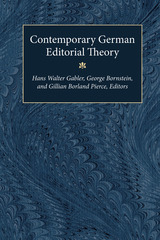 Contemporary German Editorial Theory
Hans Walter Gabler, George Bornstein, and Gillian Borland Pierce, Editors
University of Michigan Press, 1995 Over the past decade, Anglo-American notions of textual construction and editorial theory have begun major paradigm shifts. Many of the key emergent issues of Anglo-American debate -- such as theories of versions - -are already familiar in German theory. In other respects, including systematic reflection on the design and function of editorial apparatus, the German debate has already produced paradigms and procedures as yet unformulated in English. Contemporary German Editorial Theory makes available for the first time in English ten major essays by seven German theorists, together with an original introductory meditation by Hans Walter Gabler, editor of the celebrated edition of James Joyce's Ulysses. The volume thus participates in the paradigm shift in editorial theory that has led both to theoretical reconception of the field and to groundbreaking practical results. Topics discussed include the distinction between historical record and editor's interpretation, the display of multiple versions, concepts of authorization and intention, and the relations of textual theory to approaches like deconstruction and semiotics. The book also includes suggestions for further reading in both languages and a glossary of technical terms.Bringing together the heretofore separate Anglo-American and German approaches will strengthen each separately and prepare the way for a new hybrid combining the advantages of both orientations. Contributors are Hans Zeller, Miroslav Červenka, Elisabeth Höpker-Herberg, Gunter Martens, Henning Boetius, Siegfried Scheibe, and Gerhard Seidel.
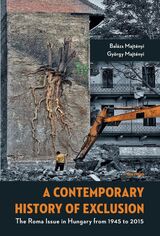 A Contemporary History of Exclusion: The Roma Issue in Hungary from 1945 to 2015
György Majtényi
Central European University Press, 2016 The volume presents the changing situation of the Roma in the second half of the 20th century and examines the politics of the Hungarian state regarding minorities by analyzing legal regulations, policy documents, archival sources and sociological surveys. In the first phase analyzed (1945-61), the authors show the efforts of forced assimilation by the communist state. The second phase (1961-89) began with the party resolution denying nationality status to the Roma. Gypsy culture was equivalent with culture of poverty that must be eliminated. Forced assimilation through labor activities continued. The Roma adapted to new conditions and yet kept their distinct identity. From the 1970s, Roma intellectuals began an emancipatory movement, and its legacy is felt until this day. Although the third phase (1989-2010) brought about freedoms and rights for the Roma, with large sums spent on various Roma-related programs, the situation on the ground nevertheless did not improve. Segregation and marginalization continues, and it is rampant. The authors powerfully conclude: while Roma became part of the political community, they are still not part of the national one. Subjects: Romanies—Hungary. Romanies—Hungary—Social conditions. Marginality, Social—Hungary. Romanies—Legal status, laws, etc.—Hungary. Minorities—Government policy—Hungary. Hungary—Ethnic relations. Hungary—Social policy.
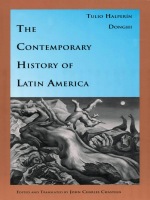 The Contemporary History of Latin America
Tulio Halperín Donghi
Duke University Press, 1993 For a quarter of a century, Tulio Halperín Donghi's Historia Contemporánea de América Latina has been the most influential and widely read general history of Latin America in the Spanish-speaking world. Unparalleled in scope, attentive to the paradoxes of Latin American reality, and known for its fine-grained interpretation, it is now available for the first time in English. Revised and updated by the author, superbly translated, this landmark of Latin American historiography will be accessible to an entirely new readership.
Beginning with a survey of the late colonial landscape, The Contemporary History of Latin America traces the social, economic, and political development of the region to the late twentieth century, with special emphasis on the period since 1930. Chapters are organized chronologically, each beginning with a general description of social and economic developments in Latin America generally, followed by specific attention to political matters in each country. What emerges is a well-rounded and detailed picture of the forces at work throughout Latin American history.
This book will be of great interest to all those seeking a general overview of modern Latin American history, and its distinctive Latin American voice will enhance its significance for all students of Latin American history.
 Contemporary Hong Kong Government and Politics, Third Edition
Edited by Wai-man Lam, Percy Luen-tim Lui, and Wilson Wong
Hong Kong University Press, 2024 An updated edition of a close and comprehensive look at modern Hong Kong politics up to the present.
In its third edition, Contemporary Hong Kong Government and Politics analyzes Hong Kong’s basic political institutions, mediating institutions, political actors, specific policy areas, and its relationships with the mainland and the international community. All chapters have either been significantly updated or rewritten by new contributors. This edition presents a comprehensive and systematic analysis of the main continuities and changes after the 2019 Anti-Extradition Law Amendment Bill. It examines various aspects of the Hong Kong government and politics such as the executive, the legislature, the judiciary, the civil service, district councils, and advisory and statutory bodies. It also investigates the structures of the wider society with particular attention to political parties and elections, civil society, political identity and political culture, the mass media, and public opinions.
 A Contemporary Introduction to Thomistic Metaphysics
Michael Gorman
Catholic University of America Press, 2023 A Contemporary Introduction to Thomistic Metaphysics provides the reader with an introductory presentation of key themes in Thomistic metaphysics. There are many such books, but this one is, to use a phrase Michael Gorman has adopted, “analytic-facing,” i.e., it presents things in dialogue with analytic philosophy. Sometimes that means disagreeing with analytic proposals (for example, possible worlds), and sometimes it means agreeing with them (for instance, making ample use of Ryle’s notion of “systematically misleading expressions”).
What’s more, it (gently) takes a somewhat deflationary attitude towards many things metaphysicians like to talk about, such as accidents, universals, and the like. By “deflationary” Gorman means that such items are taken seriously, but their ontological status is taken down a notch: features, universals, possible worlds, and other such things are understood in terms of what substances are and what substances are. Substances are ”basic beings,” and other things are what they are only in relation to substances. Of course this is Aristotle 101, but metaphysicians, Aristotelians included, often slip into treating non-substances as mini-substances, and Gorman pushes back against this throughout.
A Contemporary Introduction to Thomistic Metaphysics begins by explaining what philosophy is, what metaphysics is, and how these relate to other kinds of thinking. It then moves through a series of topics, ending with a brief look at applications of metaphysical thinking in theology.
 Contemporary Irish Drama and Cultural Identity
Margaret Llewellyn-Jones
Intellect Books, 2013 Within the last ten years there has been a renaissance in Irish drama from both sides of the border, including award-winning work which has transfered to London and New York, and has toured Britain as well as Europe and Australia. This book explores the dynamics of the relationship between these representations of Ireland and the fluid nature of cultural identity, especially during a period of economic and political change. Although the book establishes the historical context for contemporary Irish drama, and does include discussion of some of the earlier works of Brian Friel, Frank MacGuinness and Tom Murphy, the emphasis lies on their more recent work from 1980, and especially upon work created by new writers performed during the 1990's, during the emergence of the 'Celtic tiger economy' in the Republic, and the Peace Process in the North. Key themes provide the structure of the book, which examines especially those theatrical strategies which have been associated with the performance of identity, particularly in a post-colonial situation. References are also made to interviews with writers, performers, directors and groups, as well as performances seen across Ireland and Britain. Contemporary critical perspectives from post-colonial theory to psychoanalysis and performance praxis are deployed, but in an accessible way. In contrast to the tensions associated with the colonising relationship between Ireland and Britain, the relationship between Ireland and Europe are considered in terms of cultural and economic influences and performance practices, and that between Ireland and America in terms of the 'dream of the West', the diaspora and tourism.
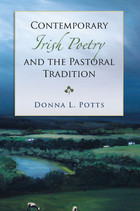 Contemporary Irish Poetry and the Pastoral Tradition
Donna L. Potts
University of Missouri Press, 2011 In Contemporary Irish Poetry and the Pastoral Tradition, Donna L. Potts closely examines the pastoral genre in the work of six Irish poets writing today. Through the exploration of the poets and their works, she reveals the wide range of purposes that pastoral has served in both Northern Ireland and the Republic: a postcolonial critique of British imperialism; a response to modernity, industrialization, and globalization; a way of uncovering political and social repercussions of gendered representations of Ireland; and, more recently, a means for conveying environmentalism’s more complex understanding of the value of nature. Potts traces the pastoral back to its origins in the work of Theocritus of Syracuse in the third century and plots its evolution due to cultural changes. While all pastoral poems share certain generic traits, Potts makes clear that pastorals are shaped by social and historical contexts, and Irish pastorals in particular were influenced by Ireland’s unique relationship with the land, language, and industrialization due to England’s colonization. For her discussion, Potts has chosen six poets who have written significant collections of pastoral poetry and whose work is in dialogue with both the pastoral tradition and other contemporary pastoral poets. Three poets are men—John Montague, Seamus Heaney, Michael Longley—while three are women—Eavan Boland, Medbh McGuckian, Nuala Ní Dhomhnaill. Five are English-language authors, while the sixth—Ní Dhomhnaill—writes in Irish. Additionally, some of the poets hail from the Republic, while others originate from Northern Ireland. Potts contends that while both Irish Republic and Northern Irish poets respond to a shared history of British colonization in their pastorals, the 1921 partition of the country caused the pastoral tradition to evolve differently on either side of the border, primarily because of the North’s more rapid industrialization; its more heavily Protestant population, whose response to environmentalism was somewhat different than that of the Republic’s predominantly Catholic population; as well the greater impact of the world wars and the Irish Troubles. In an important distinction from other studies of Irish poetry, Potts moves beyond the influence of history and politics on contemporary Irish pastoral poetry to consider the relatively recent influence of ecology. Contemporary Irish poets often rely on the motif of the pastoral retreat to highlight various environmental threats to those retreats—whether they be high-rises, motorways, global warming, or acid rain. Potts concludes by speculating on the future of pastoral in contemporary Irish poetry through her examination of more recent poets—including Moya Cannon and Paula Meehan—as well as other genres such as film, drama, and fiction.
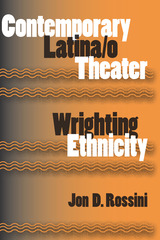 Contemporary Latina/o Theater: Wrighting Ethnicity
Jon D. Rossini
Southern Illinois University Press, 2008 In Contemporary Latina/o Theater, Jon D. Rossini explores the complex relationship between theater and the creation of ethnicity in an unprecedented examination of six Latina/o playwrights and their works: Miguel Piñero, Luis Valdez, Guillermo Reyes, Octavio Solis, José Rivera, and Cherríe Moraga. Rossini exposes how these writers use the genre as a tool to reveal and transform existing preconceptions about their culture. Through “wrighting”—the triplicate process of writing plays, righting misconceptions about ethnic identity, and creating an entirely new way of understanding Latina/o culture—these playwrights directly intervene in current conversations regarding ethnic identity, providing the tools for audiences to reexplore their previously held perspectives outside the theater. Examining these writers and their works in both cultural and historical contexts, Rossini reveals how playwrights use the liminal space of the stage—an area on the thresholds of both theory and reality—to “wright” new insights into Latina/o identity. They use the limits of the theater itself to offer practical explorations of issues that could otherwise be discussed only in highly theoretical terms. Rossini traces playwrights’ methods as they address some of the most challenging issues facing contemporary Latinas/os in America: from the struggles for ethnic solidarity and the dangers of a community based in fear, to stereotypes of Latino masculinity and the problematic fusion of ethnicity and politics. Rossini discusses the looming specter of the border in theater, both as a conceptual device and as a literal reality—a crucial subject for modern Latinas/os, given recent legislation and other actions. Throughout, the author draws intriguing comparisons to the cultural limbo in which many Latinas/os find themselves today. An indispensable volume for anyone interested in drama and ethnic studies, Contemporary Latina/o Theater underscores the power of theatricality in exploring and rethinking ethnicity. Rossini provides the most in-depth analysis of these plays to date, offering a groundbreaking look at the ability of playwrights to correct misconceptions and create fresh perspectives on diversity, culture, and identity in Latina/o America.
Contemporary Literature and the State: A special issue of Contemporary Literature 49:4 (Winter 2008)
Matthew Hart
University of Wisconsin Press, 2009 Contemporary Literature and the State challenges the critical opposition between the monolithic state and the individual artist. The volume collects essays on writers as different as Samuel Beckett and Ngozi Adichie and covers historical and geographical contexts from Yorkshire to Singapore, San Francisco to Cape Town. Featuring new and established critical voices, Contemporary Literature and the State is an important new contribution to debates about the politics of literature, coming at a time when state power appears both more arbitrary and more necessary than ever.
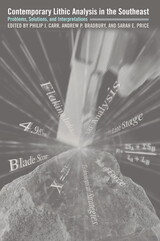 Contemporary Lithic Analysis in the Southeast: Problems, Solutions, and Interpretations
Philip J. Carr
University of Alabama Press, 2012 Representing work by a mixture of veterans and a new generation of lithic analysts, Contemporary Lithic Analysis in the Southeast explores fresh ideas while reworking and pushing the limits of traditional methods and hypotheses. The variability in the southeastern lithic landscape over space and through time makes it a dynamic and challenging region for archaeologists. Demonstrating a holistic approach and using a variety of methods, this volume aims to derive information regarding prehistoric lifeways from lithic assemblages. The contributors use data from a wide temporal span and a variety of sites across the Southeast, ranging from Texas to South Carolina and from Florida to Kentucky. Not merely cautionary tales, these case studies demonstrate the necessity of looking beyond the bag of lithic material sitting in the laboratory to address the key questions in the organization of prehistoric lithic technologies. How do field-collection strategies bias our interpretations? What is therelationship between technological strategies and tool design? How can inferences regarding social and economic strategies be made from lithic assemblages? Contributors
William Andrefsky Jr. / Andrew P. Bradbury / Philip J. Carr / CarolynConklin / D. Randall Cooper / Jason L.Edmonds / Jay D. Franklin / Albert C.Goodyear III / Joel Hardison / Lucinda M. Langston / D. Shane Miller / George H.Odell / Charlotte D. Pevny / Tara L. Potts /Sarah E. Price / Douglas Sain / Sarah C.Sherwood / Ashley M. Smallwood /Paul Thacker
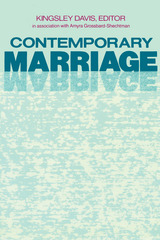 Contemporary Marriage
Kingsley Davis
Russell Sage Foundation, 1985 This fascinating symposium is based on an assumption that no longer seems to need justification: that the institution of marriage is today experiencing profound changes. But the nature of those changes—their causes and consequences—is very much in need of explication. The experts contributing to this volume bring a wide range of perspectives—sociological, anthropological, economic, historical, psychological, and legal—to the problem of marriage in modern society. Together these essays help illuminate a form of relationship that is both vulnerable and resilient, biological and social, a reflection of and an influence on other social institutions. Contemporary Marriage begins with an important assessment of the revolution in marital behavior since World War II, tracing trends in marriage age, cohabitation, divorce, and fertility. The focus here is primarily on the United States and on idustrial societies in general. Later chapters provide intriguing case studies of particular countries. There is a recurrent interest in the impact on marriage of modernization itself, but a number of essays probe influences other than industrial development, such as strong cultural and historical patterns or legislation and state control. Beliefs and expectations about marriage are explored, and human sexuality and gender roles are also considered as factors in the nature of marriage. Contemporary Marriage offers a rich spectrum of approaches to a problem of central importance. The volume will reward an equally broad spectrum of readers interested in the meaning and future of marriage in our society.
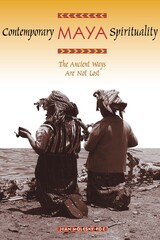 Contemporary Maya Spirituality: The Ancient Ways Are Not Lost
By Jean Molesky-Poz
University of Texas Press, 2006 Since the mid-1980s, when Guatemala returned to civilian rule and achieved relative peace and stability, the Maya have begun openly expressing their spiritual beliefs and practices. Jean Molesky-Poz draws on in-depth dialogues with Maya Ajq'ijab' (keepers of the ritual calendar), her own participant observation, and inter-disciplinary resources to offer a comprehensive, innovative, and well-grounded understanding of contemporary Maya spirituality and its theological underpinnings. She reveals significant continuities between contemporary and ancient Maya worldviews and spiritual practices. Molesky-Poz opens with a discussion of how the public emergence of Maya spirituality is situated within the religious political history of the Guatemalan highlands, particularly the recent pan-Maya movement. She investigates Maya cosmovision and its foundational principles, as expressed by Ajq'ijab'. At the heart of this work, Ajq'ijab' interpret their obligation, lives, and spiritual work. In subsequent chapters, Molesky-Poz explores aspects of Maya spirituality—sacred geography (the reciprocal relationship between the earth and humans, sacred places, and the significance of the cross or quatrefoil map), sacred time (how the 260-day sacred calendar is "the heart of the wisdom of the Maya," the matrix of Maya culture), and ritual practice (the distinct way and method of ancestral study, with special attention to fire ceremonialism). She confirms contemporary Maya spirituality as a faith tradition with elaborate historical roots that has significance for individual, collective, and historical lives, reaffirming its own public space and legal right to be practiced.
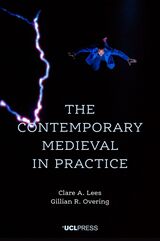 The Contemporary Medieval in Practice
Claire A. Lees and Gillian R. Overing
University College London, 2019 Contemporary art can provide medievalists with innovative ways to reframe the past. Meanwhile, medievalists offer contemporary art insights into cultural works of the past that have been reworked in the present.
Speculative and nontraditional, The Contemporary Medieval in Practice adapts the conventional scholarly essay to reflect its interdisciplinary subject. Creative critical writing encourages the introduction of dialogue, poetry, and short essays within scholarly style, and this, the authors argue, makes it an ideal format for exploring innovative pathways from the contemporary to the medieval. Discussing urgent critical discourses and cultural practices, such as the study of the environment and the ethics of understanding bodies, identities, and histories, this short, accessible book focuses on early medieval British culture, or Anglo-Saxon studies, and its relation with, use of, and reworking in contemporary visual, poetic, and material culture after 1950.
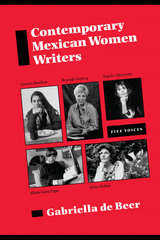 Contemporary Mexican Women Writers: Five Voices
By Gabriella de Beer
University of Texas Press, 1996 Mexican women writers moved to the forefront of their country's literature in the twentieth century. Among those who began publishing in the 1970s and 1980s are Maria Luisa Puga, Silvia Molina, Brianda Domecq, Carmen Boullosa, and Angeles Mastretta. Sharing a range of affinities while maintaining distinctive voices and outlooks, these are the women whom Gabriella de Beer has chosen to profile in Contemporary Mexican Women Writers. De Beer takes a three-part approach to each writer. She opens with an essay that explores the writer's apprenticeship and discusses her major works. Next, she interviews each writer to learn about her background, writing, and view of herself and others. Finally, de Beer offers selections from the writer's work that have not been previously published in English translation. Each section concludes with a complete bibliographic listing of the writer's works and their English translations. These essays, interviews, and selections vividly recreate the experience of being with the writer and sharing her work, hearing her tell about and evaluate herself, and reading the words she has written. The book will be rewarding reading for everyone who enjoys fine writing.
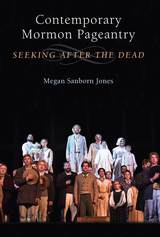 Contemporary Mormon Pageantry: Seeking After the Dead
Megan Sanborn Jones
University of Michigan Press, 2018 In Contemporary Mormon Pageantry, theater scholar Megan Sanborn Jones looks at Mormon pageants, outdoor theatrical productions that celebrate church theology, reenact church history, and bring to life stories from the Book of Mormon. She examines four annual pageants in the United States-the Hill Cumorah Pageant in upstate New York, the Manti Pageant in Utah, the Nauvoo Pageant in Illinois, and the Mesa Easter Pageant in Arizona. The nature and extravagance of the pageants vary by location, with some live orchestras, dancing, and hundreds of costumed performers, mostly local church members. Based on deep historical research and enhanced by the author's interviews with pageant producers and cast members as well as the author's own experiences as a participant-observer, the book reveals the strategies by which these pageants resurrect the Mormon past on stage. Jones analyzes the place of the productions within the American theatrical landscape and draws connections between the Latter-day Saints theology of the redemption of the dead and Mormon pageantry in the three related sites of sacred space, participation, and spectatorship. Using a combination of religious and performance theory, Jones demonstrates that Mormon pageantry is a rich and complex site of engagement between theater, theology, and praxis that explores the saving power of performance.
Contemporary Mormonism: SOCIAL SCIENCE PERSPECTIVES
Edited by Marie Cornwall, Tim B. Heaton, and Lawrence A. Young
University of Illinois Press, 1994 Contemporary Mormonism is the first collection of sociological essays to focus exclusively on Mormons. Featuring the work of the major scholars conducting social science research on Mormons today, this volume offers refreshing new perspectives not only on Mormonism but also on the nature of successful religious movements, secularization and assimilation, church growth, patriarchy and gender roles, and other topics. This first paperback edition includes a new introduction assessing the current state of Mormon scholarship and the effect of the globalization of the LDS Church on scholarly research about Mormonism.
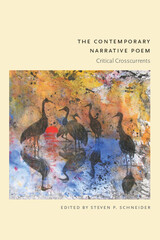 The Contemporary Narrative Poem: Critical Crosscurrents
Steven P. Schneider
University of Iowa Press, 2012 Over the past thirty years, narrative poems have made a comeback against the lyric approach to poetry that has dominated the past century. Drawing on a decade of conferences and critical seminars on the topic, The Contemporary Narrative Poem examines this resurgence of narrative and the cultural and literary forces motivating it. Gathering ten essays from poet-critics who write from a wide range of perspectives and address a wide range of works, the collection transcends narrow conceptions of narrative, antinarrative, and metanarrative. The authors ask several questions: What formal strategies do recent narrative poems take? What social, cultural, and epistemological issues are raised in such poems? How do contemporary narrative poems differ from modernist narrative poems? In what ways has history been incorporated into the recent narrative poetry? How have poets used the lyric within narrative poems? How do experimental poets redefine narrative itself through their work? And what role does consciousness play in the contemporary narrative poem? The answers they supply will engage every poet and student of poetry.
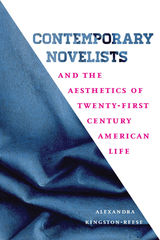 Contemporary Novelists and the Aesthetics of Twenty-First Century American Life
Alexandra Kingston-Reese
University of Iowa Press, 2020 Contemporary Novelists and the Aesthetics of Twenty-First Century American Life gives us a new way to view contemporary art novels, asking the key question: How do contemporary writers imagine aesthetic experience? Examining the works of some of the most popular names in contemporary fiction and art criticism, including Zadie Smith, Teju Cole, Siri Hustvedt, Ben Lerner, Rachel Kushner, and others, Alexandra Kingston-Reese finds that contemporary art novels are seeking to reconcile the negative feelings of contemporary life through a concerted critical realignment in understanding artistic sensibility, literary form, and the function of the aesthetic. Kingston-Reese reveals how contemporary writers refract and problematize aesthetic experience, illuminating an uneasiness with failure: firstly, about the failure of aesthetic experiences to solve and save; and secondly, the literary inability to articulate the emotional dissonance caused by aesthetic experiences now.
 Contemporary Opera in Flux
Edited by Yayoi U. Everett
University of Michigan Press, 2024 In twelve essays, Contemporary Opera in Flux discusses a series of shifts that, taken together, have radically redefined the production and reception of opera. Focusing on productions involving late twentieth- and twenty-first century scores and libretti, the contributors draw on conversations with members of creative teams and studies of archival material, dipping into a historical record that remains in flux as composers, librettists, directors, and designers revisit existing work and create anew. The contributors to this volume push the boundaries of contemporary opera scholarship by examining works that disrupt operatic conventions; tackle sociopolitical issues such as drug trafficking, racial injustice, and cultural trauma; and advance underrepresented works by female, African-American, Asian, and avant-garde composers around the globe.
Contemporary Opera in Flux bridges the gaps between expanding literature on opera, theater, new music, postmodern dramaturgy, and posthuman aesthetics, while also confronting larger questions of identity, representation, and narrative agency that are at the forefront of contemporary music scholarship. This collection of essays engages critically with the past out of a conviction that, amid general public perceptions of opera as anachronistic or elitist, contemporary opera has emerged as an artistic incubator for experimentation.
 Contemporary Perspectives in the Philosophy of Language
Peter A. French, Theodore E. Uehling Jr., and Howard K. Wettstein, Editors
University of Minnesota Press, 1979
Contemporary Perspectives in the Philosophy of Language was first published in 1983. Minnesota Archive Editions uses digital technology to make long-unavailable books once again accessible, and are published unaltered from the original University of Minnesota Press editions.
This volume, an expanded edition of the philosophy of language issue of the journal Midwest Studies in Philosophy (1977), includes essays by some of the foremost exponents of the most influential current approaches to the philosophy of language. There are new contributions to this edition by Keith S. Donnellan, Jerrold J. Katz, Barbara Partee, John Searle, Richmond Thomason and Zeno Vendler. Essays drawn from the original edition are by W. V. Quine, Keith S Donnellan, Stephen Schiffer, Donnis W. Stampe, Baruch A Brody, Panayot Butchvarov, Fred I. Dretske, Jaegwon Kim, David Shwayder, J. O. Urmson, Michael Levin, David E. Cooper, John Wallace, Hector-Neri Castaneda, Howard K Wettstein, Herbert Hochberg, Nelson Goodman, Wilfrid Sellars, Michael Root, Bruce Aune, Donald Davidson, and Saul Kripke.
Of special interest in the original edition was Kripke's paper "Speaker's Reference and Semantic Reference, Descriptions, and Anaphora," Presents a rebuttal to Kripke's essay and attempts to establish referential attributive distinction as semantically significant.
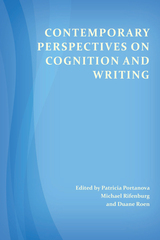 Contemporary Perspectives on Cognition and Writing
Patricia Portanova
University Press of Colorado, 2017 Perspectives on Writing series
Co-Published with CSU Open Press
Since the 1980s, even as international writing scholars have embraced cognitive science, the number of studies building on research in writing and cognition has decreased in the United States. Despite this decline, significant interest and ongoing research in this critical area continues. Contemporary Perspectives on Cognition and Writing explores the historical context of cognitive studies, the importance to our field of studies in neuroscience, the applicability of habits of mind, and the role of cognition in literate development and transfer. These works—each of which offers a timely contribution to research, teaching, and learning in the composition classroom—are book-ended by a foreword and afterword by cognition and writing pioneers John Hayes and Linda Flower. This collection, as a result, offers a historical marker of where we were in cognitive studies and where we might go.
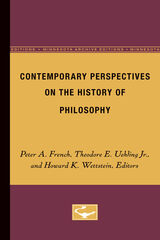 Contemporary Perspectives on the History of Philosophy
Peter A. French, Theodore E. Uehling Jr., and Howard K. Wettstein, Editors
University of Minnesota Press, 1983
Contemporary Perspectives on the History of Philosophy was first published in 1983. Minnesota Archive Editions uses digital technology to make long-unavailable books once again accessible, and are published unaltered from the original University of Minnesota Press editions.
The authors of the 27 appears in Volume 8, Midwest Studies in Philosophy,have established reputations as historians of philosophy, but their vantage point, here, is from "contemporary perspectives" - they use contemporary analytic skills to examine problems and issues considered by past philosophers. The papers, arranged in historical order, fall into six groups: ancient philosophy (the Pythagoreans, Plato, and Aristotle); the seventeenth-century rationalists (Descartes, Leibniz and Spinoza); the empiricists (Locke, Berkeley, and Hume); Kant; the nineteenth century (Hegel, Schopenhauer, and Mill); and, in conclusion, an essay on Wittgenstein's Tractatus and two broad, retrospective papers entitled "Old Analyses of the Physical World and new Philosophies of Language" and "Moral Crisis and the History of Ethics."
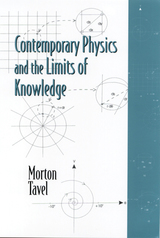 Contemporary Physics and the Limits of Knowledge
Tavel, Morton
Rutgers University Press, 2002 "An elegant read for anyone interested in understanding modern physics. Tavel has a genuine knack for making the difficult and obscure clear and exciting." --Joseph C. Pitt, author of Thinking about Technology "You will never look at scientific theories in the same way again." --John Hubiscz, North Carolina State University Introductory physics is not often a popular class among liberal arts majors. With its lively prose and analogies from the arts, humanities, and social sciences, however, Contemporary Physics and the Limits of Knowledge is guaranteed to enlighten and delight nonscience majors. Morton Tavel contends that every one of the six topics that he explores--symmetry, special and general relativity, statistical physics, quantum mechanics, and chaos--has played a role in telling us what we are unable to know about the physical world. He explains what each of the topics reveals about our attempts to pinpoint reality, and how each scientific revelation forces us to acknowledge a narrowing rather than a broadening of our knowledge. Chaos theory, for example, reveals a way to understand the randomness that seems so prevalent in natural phenomena such as weather. This development unifies our understanding of many phenomena that had been previously thought unrelated. Yet, chaos represents a significant diminution in what we can hope to predict about the course of natural events. It has increased our knowledge or understanding of a phenomena, but has seriously eroded our long-held, Newtonian vision of prediction and control. Tavel emphasizes the features of physics that make it a very human endeavor and serve to build bridges to all other intellectual disciplicnes.
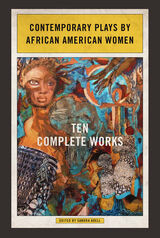 Contemporary Plays by African American Women: Ten Complete Works
Edited by Sandra Adell
University of Illinois Press, 2015 African American women have increasingly begun to see their plays performed from regional stages to Broadway. Yet many of these artists still struggle to gain attention. In this volume, Sandra Adell draws from the vital wellspring of works created by African American women in the twenty-first century to present ten plays by both prominent and up-and-coming writers. Taken together, the selections portray how these women engage with history as they delve into--and shake up--issues of gender and class to craft compelling stories of African American life. Gliding from gritty urbanism to rural landscapes, these works expand boundaries and boldly disrupt modes of theatrical representation. Selections: Blue Door, by Tanya Barfield; Levee James, by S. M. Shephard-Massat; Hoodoo Love, by Katori Hall; Carnaval, by Nikkole Salter; Single Black Female, by Lisa B. Thompson; Fabulation, or The Re-Education of Undine, by Lynn Nottage; BlackTop Sky, by Christina Anderson; Voyeurs de Venus, by Lydia Diamond; Fedra, by J. Nicole Brooks; and Uppa Creek: A Modern Anachronistic Parody in the Minstrel Tradition, by Keli Garrett.
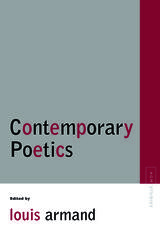 Contemporary Poetics
Louis Armand
Northwestern University Press, 2007 Exploring the boundaries of one of the most contested fields of literary study—a field that in fact shares territory with philology, aesthetics, cultural theory, philosophy, and even cybernetics—this volume gathers a body of critical writings that, taken together, broadly delineate a possible poetics of the contemporary. In these essays, the most interesting and distinguished theorists in the field renegotiate the contours of what might constitute "contemporary poetics," ranging from the historical advent of concrete poetry to the current technopoetics of cyberspace. Concerned with a poetics that extends beyond our own time, as a mere marker of present-day literary activity, their work addresses the limits of a writing "practice"—beginning with Stéphane Mallarmé in the late nineteenth century—that engages concretely with what it means to be contemporary.
Charles Bernstein's Swiftian satire of generative poetics and the textual apparatus, together with Marjorie Perloff's critical-historical treatment of "writing after" Bernstein and other proponents of language poetry, provides an itinerary of contemporary poetics in terms of both theory and practice. The other essays consider "precursors," recognizable figures within the histories or prehistories of contemporary poetics, from Kafka and Joyce to Wallace Stevens and Kathy Acker; "conjunctions," in which more strictly theoretical and poetical texts enact a concerted engagement with rhetoric, prosody, and the vicissitudes of "intelligibility"; "cursors," which points to the open possibilities of invention, from Augusto de Campos's "concrete poetics" to the "codework" of Alan Sondheim; and "transpositions," defining the limits of poetic invention by way of technology.
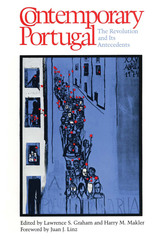 Contemporary Portugal: The Revolution and Its Antecedents
Edited by Lawrence S. Graham and Harry M. Makler
University of Texas Press, 1979 Despite worldwide interest in the Portuguese Revolution of 1974, Portugal remained for most people a little known and poorly understood country, neglected for years by social scientists. Editors Graham and Makler brought together for the first time in one substantive volume most of the leading social science experts on Portugal. The contributors' highly original research represents the best work generated by the International Conference Group on Modern Portugal at its two major conferences held in 1973 and 1976. The result is a comprehensive collection of essays discussing in detail the events leading up to the revolution, the causes of the military coup, and the movement of a society on the brink of revolutionary upheaval toward open, democratic parliamentary elections. As the first interdisciplinary study to span fifty years of Portuguese history from the Estado Novo of 1926 to the eventual social democratic republic, this book stands alone in its field. The specialist as well as the general reader will find insights into the dynamics of Portugal's people, politics, and economics.
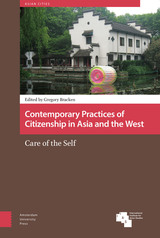 Contemporary Practices of Citizenship in Asia and the West: Care of the Self
Gregory Bracken
Amsterdam University Press, 2020 Contemporary Practices of Citizenship in Asia and the West: Care of the Self examines urban communities and societies in Asia and the West to shed much-needed light on issues that have emerged as the world experiences its new urban turn. An urbanized world should be an improving place, one that is better to live in, one where humans can flourish. This collection of essays examines contemporary practices of care of the self in cities in Asia and the West, including challenges to citizenship and even the right to the city itself. Written by a range of academics from different backgrounds (from architecture and urbanism, anthropology, social science, psychology, gender studies, history, and philosophy), their trans- and multidisciplinary approaches shed valuable light on what are sometimes quite old problems, leading to fresh perspectives and new ways of dealing with them. One thing that unites all of these papers is their people-centred approach, because, after all, a city is its people.
Contemporary Rhetorical Citizenship
Lisa Villadsen
Amsterdam University Press, 2015 "Being a citizen is not just about holding a passport or being allowed to vote. It is also about how we communicate with each other about common societal issues. Rhetorical citizenship is about how we as citizens participate in society by means of discourse. How do we talk and write about civic issues? How are we addressed? How do we listen? This book presents studies from different academic fields of theoretical issues raised by public discourse, focusing on understanding and evaluating how its many manifestations both reflect, shape, and challenge the society it is a part of. The book also presents analyses of examples from around the world of civic communication, ranging from public hearings about same-sex marriage over polemical letters to the editor to public displays of knitting as a protest form."
Contemporary Short Stories from Central America
Edited by Enrique Jaramillo Levi and Leland H. Chambers
University of Texas Press, 1993 This volume collects some of the best short fiction from the six Spanish-speaking countries of Central America—Guatemala, Honduras, El Salvador, Nicaragua, Costa Rica, and Panama. Selected from stories written between 1963 and 1988, it is a broad representation of active Central American writers. Many of the stories are quite sophisticated and utilize elements of the absurd or techniques of magical realism. Some stories deal with war—the unending struggle against dictators and military power that engrosses Central Americans. Others explore the realm of the writer's imagination. Some of the writers included are Augusto Monterroso (Guatemala), Carmen Naranjo and Samuel Rovinski (Costa Rica), Rosa María Britton and Jaime García Saucedo (Panama), and Alfonso Quijada Urías (El Salvador).
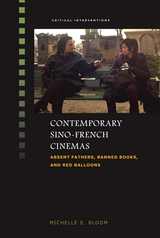 Contemporary Sino-French Cinemas: Absent Fathers, Banned Books, and Red Balloons
Michelle E. Bloom
University of Hawaii Press, 2016 Transnational cinemas are eclipsing national cinemas in the contemporary world, and Sino-French films exemplify this phenomenon through the cinematic coupling of the Sinophone and the Francophone, linking France not just with the Chinese mainland but also with the rest of the Chinese-speaking world. Sinophone directors most often reach out to French cinema by referencing and adapting it. They set their films in Paris and metropolitan France, cast French actors, and sometimes use French dialogue, even when the directors themselves don't understand it. They tend to view France as mysterious, sexy, and sophisticated, just as the French see China and Taiwan as exotic.
As Michelle E. Bloom makes clear, many films move past a simplistic opposition between East and West and beyond Orientalist and Occidentalist cross-cultural interplay. Bloom focuses on films that have appeared since 2000 such as Tsai Ming-liang's What Time Is It There? , Hou Hsiao-hsien's Flight of the Red Balloon, and Dai Sijie's Balzac and the Little Chinese Seamstress. She views the work of these well-known directors through a Sino-French optic, applying the tropes of métissage (or biraciality), intertextuality, adaptation and remake, translation, and imitation to shed new light on their work. She also calls attention to important, lesser studied films: Taiwanese director Cheng Yu-chieh's Yang Yang, which depicts the up-and-coming Taiwanese star Sandrine Pinna as a mixed race beauty; and Emily Tang Xiaobai's debut film Conjugation, which contrasts Paris and post-Tiananmen Square Beijing, the one an incarnation of liberty, the other a place of entrapment. Bloom's insightful analysis also probes what such films reveal about their Taiwanese and Chinese creators.
Scholars have long studied Sino-French literature, but this inaugural full-length work on Sino-French cinema maps uncharted territory, offering a paradigm for understanding other cross-cultural interminglings and tools to study transnational cinema and world cinema. The Sino-French, rich and multifaceted, linguistically, culturally, and ethnically, constitutes an important part of film studies, Francophone studies, Sinophone studies and myriad other fields. This is a must-read for students, scholars, and lovers of film.
35 black & white illustrations
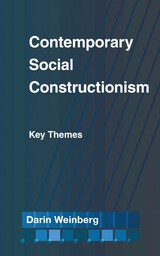 Contemporary Social Constructionism: Key Themes
Darin Weinberg
Temple University Press, 2015 In Contemporary Social Constructionism, Darin Weinberg provides a detailed, critical overview of the key themes of this school of thought, which explains how phenomena and ways of thinking develop in their social contexts. Weinberg traces the multiple roots of social constructionism, and shows how it has been used, critiqued, and refined within the social and human sciences. Contemporary Social Constructionism illuminates how constructionist social science developed in relation to positivism, critical and hermeneutic philosophy, and feminism and then goes on to distinguish the concept from postmodernism and deconstructionism. In addition, Weinberg shows how social constructionists have contributed to our understanding of biology, the body, self-knowledge, and social problems. The result is a contemporary statement of social constructionism that shores up its scientific veracity and demonstrates its analytic power, promise, and influence. The book concludes with a look toward the future of the concept and its use.
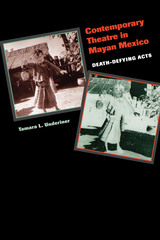 Contemporary Theatre in Mayan Mexico: Death-Defying Acts
By Tamara L. Underiner
University of Texas Press, 2004 From the dramatization of local legends to the staging of plays by Shakespeare and other canonical playwrights to the exploration of contemporary sociopolitical problems and their effects on women and children, Mayan theatre is a flourishing cultural institution in southern Mexico. Part of a larger movement to define Mayan self-identity and reclaim a Mayan cultural heritage, theatre in Mayan languages has both reflected on and contributed to a growing awareness of Mayans as contemporary cultural and political players in Mexico and on the world's stage. In this book, Tamara Underiner draws on fieldwork with theatre groups in Chiapas, Tabasco, and Yucatán to observe the Maya peoples in the process of defining themselves through theatrical performance. She looks at the activities of four theatre groups or networks, focusing on their operating strategies and on close analyses of selected dramatic texts. She shows that while each group works under the rubric of Mayan or indigenous theatre, their works are also in constant dialogue, confrontation, and collaboration with the wider, non-Mayan world. Her observations thus reveal not only how theatre is an agent of cultural self-definition and community-building but also how theatre negotiates complex relations among indigenous communities in Mayan Mexico, state governments, and non-Mayan artists and researchers.
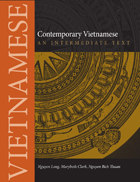 Contemporary Vietnamese: An Intermediate Text
Nguyen B. Thuan
Northern Illinois University Press, 2012 This textbook presumes knowledge of the contents of Spoken Vietnamese for Beginners or an understanding of the basic vocabulary and sentence structures of Vietnamese. Its aim is to build on that understanding through the development of general conversation skills and reading comprehension. The book follows the format of Spoken Vietnamese for Beginners as well: each lesson opens with conversations, a second section explains and gives additional examples of sentence structures and expressions, and a third section offers exercises based on the conversations as well as various readings. A fourth section provides grounding in expanded vocabulary.
The conversations in this textbook revolve around a foreign student coming to Vietnam to study. In the conversations, people share opinions across cultures and ask for information ranging from the practicalities of travel to cultural awareness. The vocabulary covered here touches on health, economics, etiquette, and religion.
The conversations and exercises in this textbook will be made available online as audio files. The book and accompanying audio—an integral component to Contemporary Vietnamese—can be used either with a teacher or for self-study. Language professors and their students—or those learning Vietnamese on their own—will appreciate the accessible approach and manageable size of this textbook.
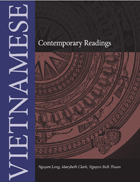 Contemporary Vietnamese Readings
Nguyen B. Thuan
Northern Illinois University Press, 2012 This textbook is intended for advanced intermediate students preparing for work or research in Vietnam or with materials written in Vietnamese. It acquaints them with a range of written styles, expands their lexical range in a variety of topics, develops reading comprehension skills, and expands their awareness of Vietnamese culture and values.
Contemporary Vietnamese Readings incorporates authentic reading materials such as street signs, banners, advertisements, news articles from north and south Vietnamese newspapers and magazines, and excerpts from novels and short stories. The materials are categorized under such themes as the Vietnamese land and its people, society and culture, current affairs, the environment, health and safety, demography and family planning, politics, diplomacy and law, economics and finance, literature, and Vietnamese women. The wide variety of different readings and genres represented in this textbook assume prior mastery of basic Vietnamese vocabulary and sentence structures at a level equivalent to completing a beginning and intermediate textbook series.
Language professors and their students, or anyone seeking a more advanced understanding of Vietnamese—or more nuanced understanding of Vietnamese culture—will appreciate the instructional value of Contemporary Vietnamese Readings.
 Content-Based Instruction in Foreign Language Education: Models and Methods
Stephen Stryker and Betty Lou Leaver, Editors
Georgetown University Press, 1997 This book offers concrete and practical ideas for implementing content-based instruction—using subject matter rather than grammar—through eleven case studies of cutting-edge models in a broad variety of languages, academic settings, and levels of proficiency. The highly innovative models illustrate content-based instruction programs for both commonly and less-commonly taught languages—Arabic, Croatian, French, German, Indonesian, Italian, Russian, Serbian, and Spanish—and for proficiency levels ranging from beginners to fluent speakers. They include single-teacher and multi-teacher contexts and such settings as typical language department classrooms, specialty schools, intensive language programs, and university programs in foreign languages across the curriculum. All of the contributors are pioneers and practitioners of content-based instruction, and the methods they present are based on actual classroom experiences. Each describes the rationale, curriculum design, materials, and evaluation procedures used in an actual curriculum and discusses the implications of the approach for adult language acquisition.
Content-Based Instruction: What Every ESL Teacher Needs to Know
Marguerite Ann Snow and Donna M. Brinton
University of Michigan Press, 2019 This book introduces readers to the concept of Content-Based Instruction (CBI) through a brief history and countless examples of the many ways this approach can be applied across settings and programs. Whether readers want to deepen their understanding of CBI or get ideas for their own teaching situation, this book provides an overview of CBI and the process of implementing it. The book discusses the three prototype models (theme-based, sheltered, and adjunct), new models (sustained content language teaching, content and language-integrated learning, English-medium instruction, adjunct models, and other hybrid models), and a research-based rationale for using CBI in the classroom. Each section includes reflection questions designed to guide readers to consider how best to implement CBI in their course and program.
Content-Based Second Language Instruction: Michigan Classics Edition
Donna M. Brinton, Marguerite Ann Snow, and Marjorie Wesche
University of Michigan Press, 2003 In the Michigan Classics Edition of Content-Based Second Language Instruction, the authors provide updates on the field of CBI in second language acquisition since 1989.
While the core of the book remains the same, new features discuss important CBI-related research and modifications to the pedagogy in the past many years.
Content-Based Second Language Instruction, Michigan Classics Edition, now includes:
a new preface
a glossary of key terms
an updated bibliography
an epilogue highlighting the major developments in the field since 1989.
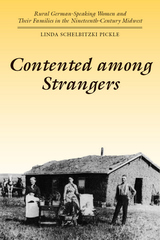 Contented among Strangers: Rural German-Speaking Women and Their Families in the Nineteenth-Century Midwest
Linda Schelbitzki Pickle
University of Illinois Press, 1995 German-Americans make up one of the largest ethnic groups in the United States, yet their very success at assimilating has also made them one of the least visible. Contented among Strangers examines the central role German-speaking women in rural areas of the Midwest played in preserving their ethnic and cultural identity. Even while living far from their original homelands, these women applied traditional European patterns of rural family life and values to their new homes in Illinois, Iowa, Kansas, Missouri, and Nebraska. As a result they were more content with their modest lives than were their Anglo-American counterparts. Through personal recollections--including interesting diary material translated by the author, church and community documents, and migration and census data--Pickle reveals the diversity and richness of the women's experiences.
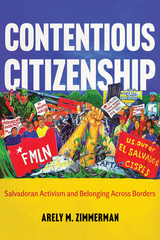 Contentious Citizenship: Salvadoran Activism and Belonging Across Borders
Arely M. Zimmerman
University of Arizona Press, 2026 Contentious Citizenship reshapes how we understand belonging, identity, and political participation in the context of migration. Drawing on decades of Salvadoran activism from the 1980s solidarity movement to the post–civil war era, Arely M. Zimmerman offers a powerful ethnographic account of how migrants challenge exclusionary state practices and redefine citizenship on their own terms using transnational networks and revolutionary politics that transcend borders.
Drawing on nearly fifty interviews with activists who fled El Salvador, Zimmerman traces how political refugees carried with them strategies of resistance and community organizing that shaped social justice movements in the United States. The book addresses the political turmoil and grassroots mobilizations in El Salvador, the sanctuary movement of the 1980s, contemporary activism, and the impact of women’s strategies and forms of resistance.
Essential reading for scholars and students of migration, Central American studies, and political movements, Contentious Citizenship is a bold intervention into contemporary debates on identity, legality, and resistance. Zimmerman’s work honors the ingenuity and resilience of Salvadoran activists and invites readers to consider what it means to belong.
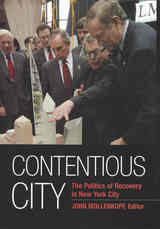 Contentious City: The Politics of Recovery in New York City
John Mollenkopf
Russell Sage Foundation, 2005 Few public projects have ever dealt with economic and emotional issues as large as those surrounding the rebuilding of lower Manhattan following the terrorist attack of September 11, 2001. Picking up the pieces involved substantial challenges: deciding how to memorialize one of America's greatest tragedies, how to balance the legal claim of landowners against the moral claim of survivors who want a say in the future of Ground Zero, and how to rebuild the Trade Center site while preserving the sacredness and solemnity that Americans now attribute to the area. All the while, the governor, the mayor, the Port Authority, and the leaseholder competed with one another to advance their own interests and visions of the redevelopment, while at least leaving the impression that the decisions were the public's to make. In Contentious City, editor John Mollenkopf and a team of leading scholars analyze the wide-ranging political dimensions of the recovery process. Contentious City takes an in-depth look at the competing interests and demands of the numerous stakeholders who have sought to influence the direction of the recovery process. Lynne Sagalyn addresses the complicated institutional politics behind the rebuilding, which involve a newly formed development commission seeking legitimacy, a two-state transportation agency whose brief venture into land ownership puts it in control of the world's most famous 16 acres of land, and a private business group whose affiliation with the World Trade Center places it squarely in a fight for billions of dollars in insurance funds. Arielle Goldberg profiles five civic associations that sprouted up to voice public opinion about the redevelopment process. While the groups did not gain much leverage over policy outcomes, Goldberg argues that they were influential in steering the agenda of decision-makers and establishing what values would be prioritized in the development plans. James Young, a member of the jury that selected the design for the World Trade Center site memorial, discusses the challenge of trying to simultaneously memorialize a tragic event, while helping those who suffered find renewal and move on with their lives. Editor John Mollenkopf contributes a chapter on how the September 11 terrorist attacks altered the course of politics in New York, and how politicians at the city and state level adapted to the new political climate after 9/11 to win elected office. Moving forward after the destruction of the Twin Towers was a daunting task, made more difficult by the numerous competing claims on the site, and the varied opinions on how it should be used in the future. Contentious City brings together the voices surrounding this intense debate, and helps make sense of the rival interests vying for control over one of the most controversial urban development programs in history. A Russell Sage Foundation September 11 Initiative Volume
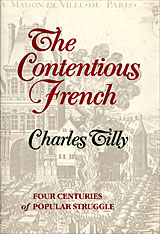 The Contentious French
Charles Tilly
Harvard University Press, 1986 In a dazzling new interpretation of four hundred years of modern French history, Charles Tilly focuses not on kings and courtiers but on the common people of village and farm buffeted by the inexorable advance of large-scale capitalism and the consolidation of a powerful nation-state. Tilly, author of The Vendée and many other books, chooses the contention of the masses as his medium in painting this vivid picture of the people's growing ability and willingness to fight injustice, challenge exploitation, and claim their own place in the hierarchy of power.
Contention is not necessarily disorder. The more we look at contention, says Tilly, the more we discover order created by the rooting of collective action in everyday social life through a continuous process of signaling, negotiation, and struggle. In seventeenth-century France, ordinary people did not know how to demonstrate, rally, or strike, but they had standard procedures for expelling a tax collector, undermining a corrupt official, and shaming moral offenders. By the end of the eighteenth century, French people were experimenting with delegations, public meetings, and popular justice. Through the nineteenth century, with the growth of an industrial proletariat, they developed an extensive repertoire of strikes, demonstrations, and direct attacks on landlords and capitalists, as well as conflicts setting worker against worker. In the twentieth century, scenarios of protest expanded to even larger-scale forms such as mass meetings, electoral campaigns, and broad-based social movements.
Rather than arguing these developments in the abstract, The Contentious French provides lively descriptions of real events, with pauses to make sense of their patterns. The result is a view of politics with the common struggle for power at its core and the changing structure of power as its envelope.
The Contentious French is bound to be controversial, and therefore required reading for specialists in European history, social movements, and collective action. Its fresh approach will also appeal to students and general readers.
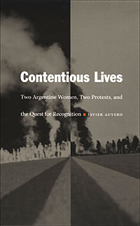 Contentious Lives: Two Argentine Women, Two Protests, and the Quest for Recognition
Javier Auyero
Duke University Press, 2003 Contentious Lives examines the ways popular protests are experienced and remembered, individually and collectively, by those who participate in them. Javier Auyero focuses on the roles of two young women, Nana and Laura, in uprisings in Argentina (the two-day protest in the northwestern city of Santiago del Estero in 1993 and the six-day road blockade in the southern oil towns of Cutral-co and Plaza Huincul in 1996) and the roles of the protests in their lives. Laura was the spokesperson of the picketers in Cutral-co and Plaza Huincul; Nana was an activist in the 1993 protests. In addition to exploring the effects of these episodes on their lives, Auyero considers how each woman's experiences shaped what she said and did during the uprisings, and later, the ways she recalled the events. While the protests were responses to the consequences of political corruption and structural adjustment policies, they were also, as Nana’s and Laura’s stories reveal, quests for recognition, respect, and dignity. Auyero reconstructs Nana’s and Laura’s biographies through oral histories and diaries. Drawing on interviews with many other protesters, newspaper articles, judicial records, government reports, and video footage, he provides sociological and historical context for their stories. The women’s accounts reveal the frustrations of lives overwhelmed by gender domination, the deprivations brought about by hyper-unemployment and the withering of the welfare component of the state, and the achievements and costs of collective action. Balancing attention to large-scale political and economic processes with acknowledgment of the plurality of meanings emanating from personal experiences, Contentious Lives is an insightful, penetrating, and timely contribution to discussions of popular resistance and the combined effects of globalization, neoliberal economic policies, and political corruption in Argentina and elsewhere.
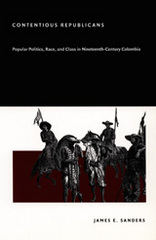 Contentious Republicans: Popular Politics, Race, and Class in Nineteenth-Century Colombia
James E. Sanders
Duke University Press, 2004 Contentious Republicans explores the mid-nineteenth-century rise of mass electoral democracy in the southwestern region of Colombia, a country many assume has never had a meaningful democracy of any sort. James E. Sanders describes a surprisingly rich republicanism characterized by legal rights and popular participation, and he explains how this vibrant political culture was created largely by competing subaltern groups seeking to claim their rights as citizens and their place in the political sphere. Moving beyond the many studies of nineteenth-century nation building that focus on one segment of society, Contentious Republicans examines the political activism of three distinct social and racial groups: Afro-Colombians, Indians, and white peasant migrants. Beginning in the late 1840s, subaltern groups entered the political arena to forge alliances, both temporary and enduring, with the elite Liberal and Conservative Parties. In the process, each group formed its own political discourses and reframed republicanism to suit its distinct needs. These popular liberals and popular conservatives bargained for the parties’ support and deployed a broad repertoire of political actions, including voting, demonstrations, petitions, strikes, boycotts, and armed struggle. By the 1880s, though, many wealthy Colombians of both parties blamed popular political engagement for social disorder and economic failure, and they successfully restricted lower-class participation in politics. Sanders suggests that these reactionary developments contributed to the violence and unrest afflicting modern Colombia. Yet in illuminating the country’s legacy of participatory politics in the nineteenth century, he shows that the current situation is neither inevitable nor eternal.
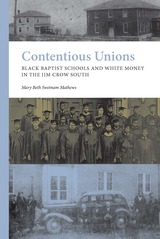 Contentious Unions: Black Baptist Schools and White Baptist Money in the Jim Crow South
Mary Beth Swetnam Mathews
University of Tennessee Press, 2024 “A significant work of scholarship that tells us not just about these particular places, but more importantly about the world of Black higher education in the decades before the civil rights movement.”—Paul Harvey, Distinguished Professor of History, University of Colorado, Colorado Springs
In Contentious Unions: Black Baptist Schools and White Baptist Money in the Jim Crow South, Mary Beth Swetnam Mathews interweaves the stories of the founding and development of Richmond Theological Seminary (Virginia), Central City College (Macon, Georgia), and American Baptist Theological Seminary (Nashville, Tennessee)—colleges that saw challenges, complexities, and hard-won accomplishments in the Post-Reconstruction era. Her study begins just after the Civil War, when one of these institutions provided educational opportunities for newly freed slaves, and follows the fortunes of the schools through the 1960s.
Mathews reveals the financial, curricular, and identity struggles of schools that came into being and survived under difficult circumstances. The institutions relied on funding from White Baptists, but also had to fight against control and exploitation from those who helped them financially. Though each school evolved with a different identity and educational mission, Mathews concludes that “they could be simultaneously symbols of racial independence as well as victims of white supremacy.”
As “oppositional spaces,” these schools gave their communities access to the ground floor of the civil rights movement, and the author highlights their connections to some of the more famous activists such as John R. Lewis, Jo Ann Gibson Robinson, and Gordon P. Hancock. Ultimately, Mathews’s book is a fascinating and complex account that uses the history of these three institutions to illuminate the origins of the long struggle for civil rights.
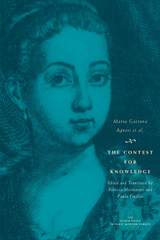 The Contest for Knowledge: Debates over Women's Learning in Eighteenth-Century Italy
Maria Gaetana Agnesi, Diamante Medaglia Faini, Aretafila Savini de' Rossi, and the Accademia de' Ricovrati
University of Chicago Press, 2005 At a time when women were generally excluded from scholarly discourse in the intellectual centers of Europe, four extraordinary female letterate proved their parity as they lectured in prominent scientific and literary academies and published in respected journals. During the Italian Enlightenment, Maria Gaetana Agnesi, Giuseppa Eleonora Barbapiccola, Diamante Medaglia Faini, and Aretafila Savini de' Rossi were afforded unprecedented deference in academic debates and epitomized the increasing ability of women to influence public discourse.
The Contest for Knowledge reveals how these four women used the methods and themes of their male counterparts to add their voices to the vigorous and prolific debate over the education of women during the eighteenth century. In the texts gathered here, the women discuss the issues they themselves thought most urgent for the equality of women in Italian society specifically and in European culture more broadly. Their thoughts on this important subject reveal how crucial the eighteenth century was in the long history of debates about women in the academy.
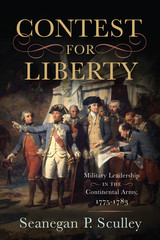 The Contest for Liberty: Military Leadership in the Continental Army, 1775–1783
Seanegan P. Sculley
Westholme Publishing, 2019 Winner of the 2019 Army Historical Foundation Distinguished Writing Award in Institutional History
How American Colonial Ideals Shaped Command, Discipline, and Honor in the U.S. Armed Forces
In the summer of 1775, a Virginia gentleman-planter was given command of a New England army laying siege to British-occupied Boston. With his appointment, the Continental Army was born. Yet the cultural differences between those serving in the army and their new commander-in-chief led to conflicts from the very beginning that threatened to end the Revolution before it could start. The key challenge for General George Washington was establishing the standards by which the soldiers would be led by their officers. What kind of man deserved to be an officer? Under what conditions would soldiers agree to serve? And how far could the army and its leaders go to discipline soldiers who violated those enlistment conditions? As historian Seanegan P. Sculley reveals in Contest for Liberty: Military Leadership in the Continental Army, 1775–1783, these questions could not be determined by Washington alone. His junior officers and soldiers believed that they too had a part to play in determining how and to what degree their superior officers exercised military authority and how the army would operate during the war. A cultural negotiation concerning the use of and limits to military authority was worked out between the officers and soldiers of the Continental Army; although an unknown concept at the time, it is what we call leadership today. How this army was led and how the interactions between officers and soldiers from the various states of the new nation changed their understandings of the proper exercise of military authority was finally codified in General Friedrich Wilhelm von Steuben’s The Regulations for the Order and Discipline of the Troops of the United States, first published in 1779. The result was a form of military leadership that recognized the autonomy of the individual soldiers, a changing concept of honor, and a new American tradition of military service.
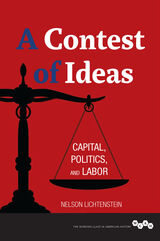 A Contest of Ideas: Capital, Politics and Labor
Nelson Lictenstein
University of Illinois Press, 2013 For more than thirty years Nelson Lichtenstein has deployed his scholarship--on labor, politics, and social thought--to chart the history and prospects of a progressive America. A Contest of Ideas collects and updates many of Lichtenstein's most provocative and controversial essays and reviews. These incisive writings link the fate of the labor movement to the transformations in the shape of world capitalism, to the rise of the civil rights movement, and to the activists and intellectuals who have played such important roles. Tracing broad patterns of political thought, Lichtenstein offers important perspectives on the relationship of labor and the state, the tensions that sometimes exist between a culture of rights and the idea of solidarity, and the rise of conservatism in politics, law, and intellectual life. The volume closes with portraits of five activist intellectuals whose work has been vital to the conflicts that engage the labor movement, public policy, and political culture.
 The Contest over National Security: FDR, Conservatives, and the Struggle to Claim the Most Powerful Phrase in American Politics
Peter Roady
Harvard University Press, 2024 “One of the most interesting books I have read on national security…Readable and intellectually stimulating.” —Peter Bergen, CNN National Security Analyst
A new history shows how FDR developed a vision of national security focused not just on protecting Americans against physical attack but also on ensuring their economic well-being—and how the nascent conservative movement won the battle to narrow its meaning, durably reshaping US politics.
Americans take for granted that national security comprises physical defense against attacks. But the concept of national security once meant something more. Franklin Roosevelt’s vision for national security, Peter Roady argues, promised an alternate path for the United States by devoting as much attention to economic want as to foreign threats. The Contest over National Security shows how a burgeoning conservative movement and power-hungry foreign policy establishment together defeated FDR’s plans for a comprehensive national security state and inaugurated the narrower approach to national security that has dominated ever since.
In the 1930s, Roosevelt and his advisors, hoping to save the United States from fascism and communism, argued that national security entailed protection from both physical attack and economic want. Roosevelt’s opponents responded by promoting a more limited national security state privileging military defense over domestic economic policy. Conservatives brought numerous concerns to bear through an enormous public relations offensive, asserting not just that Roosevelt’s plans threatened individual freedom but also that the government was less competent than the private sector and incapable of delivering economic security.
This contest to define the government’s national security responsibilities in law and in the public mind, Roady reveals, explains why the United States developed separate and imbalanced national security and welfare states, with far-reaching consequences. By recovering FDR’s forgotten vision, Roady restores a more expansive understanding of national security’s meanings as Americans today face the great challenges of their times.
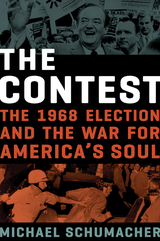 The Contest: The 1968 Election and the War for America's Soul
Michael Schumacher
University of Minnesota Press, 2021 A dramatic, deeply informed account of one of the most consequential elections and periods in American history
1968—rife with riots, assassinations, anti–Vietnam War protests, and realpolitik—was one of the most tumultuous years in the twentieth century, culminating in one of the most consequential presidential elections in American history. The Contest tells the story of that contentious election and that remarkable year. Bringing a fresh perspective to events that still resonate half a century later, this book is especially timely, giving us the long view of a turning point in American culture and politics. Author Michael Schumacher sets the stage with a deep look at the people with important roles in the unfolding drama: Lyndon B. Johnson, Robert F. Kennedy, Eugene McCarthy, George Wallace, Richard Nixon, and especially Hubert H. Humphrey, whose papers and journals afford surprising new insights. Following these politicians in the lead-up to the primaries, through the chaotic conventions, and down the home stretch to the general election, The Contest combines biographical and historical details to create a narrative as intimate in human detail as it is momentous in scope and significance. An election year when the competing forces of law and order and social justice were on the ballot, the Vietnam War divided the country, and the liberal regime begun with Franklin D. Roosevelt was on the defensive, 1968 marked a profound shift in the nation’s culture and sense of itself. Thorough in its research and spellbinding in the telling, Schumacher’s book brings sharp focus to that year and its lessons for our current critical moment in American politics.
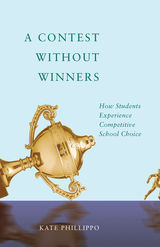 A Contest without Winners: How Students Experience Competitive School Choice
Kate Phillippo
University of Minnesota Press, 2019 Seeing the consequences of competitive school choice policy through students’ eyes While policymakers often justify school choice as a means to alleviate opportunity and achievement gaps, an unanticipated effect is increased competition over access to coveted, high-performing schools. In A Contest without Winners, Kate Phillippo follows a diverse group of Chicago students through the processes of researching, applying to, and enrolling in public high school. Throughout this journey, students prove themselves powerful policy actors who carry out and redefine competitive choice. Phillippo’s work amplifies the voices of students—rather than the parents, educators, public intellectuals, and policymakers who so often inform school choice research—and investigates how students interact with and emerge from competitive choice academically, developmentally, and civically. Through students’ experiences, she shows how competitive choice legitimates and exacerbates existing social inequalities; collides with students’ developmental vulnerability to messages about their ability, merit, and potential; and encourages young people’s individualistic actions as they come to feel that they must earn their educational rights. From urban infrastructure to income inequality to racial segregation, Phillippo examines the factors that shape students’ policy enactment and interpretation, as policymakers and educators ask students to compete for access to public resources. With competitive choice, even the winners—the lucky few admitted to their dream schools—don’t outright win. A Contest without Winners challenges meritocratic and market-driven notions of opportunity creation for young people and raises critical questions about the goals we have for public schooling.
 Contested Airwaves: American Radio at Home and Abroad, 1914-1946
Michael A. Krysko
University of Illinois Press, 2025 Controversial American-led radio initiatives sparked a kaleidoscope of conflicts and rivalries from the medium’s earliest days through the end of World War II. Michael A. Krysko explores how the medium engaged the knowledge, assumptions, and prejudices that fueled listeners’ and policymakers’ objections to foreign and unwelcome radio content. Krysko considers Americans’ antagonism toward non-English language broadcasting; issues of identity, geography, and sovereignty that propelled opposition to Mexico’s “border blaster” stations; how a project aimed at helping Cajun-speaking listeners became a French-only celebration of Acadian culture; a failed initiative to teach English to Latin Americans via shortwave broadcasting; enduring US-Panamanian conflicts over the control of radio in and around the Panama Canal; and how farmers from across the Southwest protested a radio treaty’s perceived preferential treatment of Cuba. Paying particular attention to the act of listening, Krysko shows how these initiatives illuminated and solidified divisions rooted in identity, nationalism, and prejudice. Clear and wide-ranging, Contested Airwaves reveals early radio’s place at the nexus of public programming, transnational relations, and its own evolution as a communication medium.
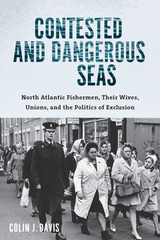 Contested and Dangerous Seas: North Atlantic Fishermen, Their Wives, Unions, and the Politics of Exclusion
Colin J. Davis
University of Massachusetts Press, 2019 Deep-sea fishing has always been a hazardous occupation, with crews facing gale-force winds, huge waves and swells, and unrelenting rain and snow. For those New England and British fishermen whose voyages took them hundreds of miles from the coastline, life was punctuated by strenuous work, grave danger, and frequent fear. Unsurprisingly, every fishing port across the world has memorials to those lost at sea.
During the 1960s and 1970s, these seafaring workers experienced new hardships. As modern fleets from many nations intensified their hunt for fish, they found themselves in increasing competition for disappearing prey. Colin J. Davis details the unfolding drama as New England and British fishermen and their wives, partners, and families reacted to this competition. Rather than acting as bystanders to these crises, the men and women chronicled in Contested and Dangerous Seas became fierce advocates for the health of the Atlantic Ocean fisheries and for their families' livelihoods.
 A Contested Borderland: Competing Russian and Romanian Visions of Bessarabia in the Second Half of the 19th and Early 20th Century
Andrei Cusco
Central European University Press, 2017 Bessarabia¿mostly occupied by modern-day republic of Moldova¿was the only territory representing an object of rivalry and symbolic competition between the Russian Empire and a fully crystallized nation-state: the Kingdom of Romania. This book is an intellectual prehistory of the Bessarabian problem, focusing on the antagonism of the national and imperial visions of this contested periphery. Through a critical reassessment and revision of the traditional historical narratives, the study argues that Bessarabia was claimed not just by two opposing projects of ‘symbolic inclusion,’ but also by two alternative and theoretically antagonistic models of political legitimacy. By transcending the national lens of Bessarabian / Moldovan history and viewing it in the broader Eurasian comparative context, the book responds to the growing tendency in recent historiography to focus on the peripheries in order to better understand the functioning of national and imperial states in the modern era.
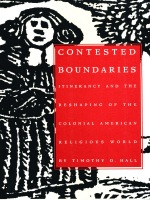 Contested Boundaries: Itinerancy and the Reshaping of the Colonial American Religious World
Timothy D. Hall
Duke University Press, 1994 The First Great Awakening in eighteenth-century America challenged the institutional structures and raised the consciousness of colonial Americans. These revivals gave rise to the practice of itinerancy in which ministers and laypeople left their own communities to preach across the countryside. In Contested Boundaries, Timothy D. Hall argues that the Awakening was largely defined by the ensuing debate over itinerancy. Drawing on recent scholarship in cultural and social anthropology, cultural studies, and eighteenth-century religion, he reveals at the center of this debate the itinerant preacher as a catalyst for dramatic change in the religious practice and social order of the New World.
This book expands our understanding of evangelical itinerancy in the 1740s by viewing it within the context of Britain’s expanding commercial empire. As pro- and anti-revivalists tried to shape a burgeoning transatlantic consumer society, the itinerancy of the Great Awakening appears here as a forceful challenge to contemporary assumptions about the place of individuals within their social world and the role of educated leaders as regulators of communication, order, and change. The most celebrated of these itinerants was George Whitefield, an English minister who made unprecedented tours through the colonies. According to Hall, the activities of the itinerants, including Whitefield, encouraged in the colonists an openness beyond local boundaries to an expanding array of choices for belief and behavior in an increasingly mobile and pluralistic society. In the process, it forged a new model of the church and its social world.
As a response to and a source of dynamic social change, itinerancy in Hall’s powerful account provides a prism for viewing anew the worldly and otherworldly transformations of colonial society. Contested Boundaries will be of interest to students and scholars of colonial American history, religious studies, and cultural and social anthropology.
Contested Canonizations: The Last Medieval Saints, 1482-1523
Ronald C. Finucane
Catholic University of America Press, 2011 This work, which forms an important bridge between medieval and Counter-Reformation sanctity and canonization, provides a richly contextualized analysis of the ways in which the last five candidates for sainthood before the Reformation came to be canonized.
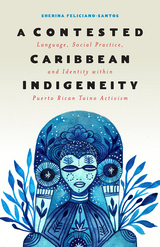 A Contested Caribbean Indigeneity: Language, Social Practice, and Identity within Puerto Rican Taíno Activism
Sherina Feliciano-Santos
Rutgers University Press, 2021 A Contested Caribbean Indigeneity is an in-depth analysis of the debates surrounding Taíno/Boricua activism in Puerto Rico and the Caribbean diaspora in New York City. Drawing on in-depth ethnographic research, media analysis, and historical documents, the book explores the varied experiences and motivations of Taíno/Boricua activists as well as the alternative fonts of authority they draw on to claim what is commonly thought to be an extinct ethnic category. It explores the historical and interactional challenges involved in claiming membership in, what for many Puerto Ricans, is an impossible affiliation. In focusing on Taíno/Boricua activism, the books aims to identify a critical space from which to analyze and decolonize ethnoracial ideologies of Puerto Ricanness, issues of class and education, Puerto Rican nationalisms and colonialisms, as well as important questions regarding narrative, historical memory, and belonging.
CONTESTED CASTLE: GOTHIC NOVELS AND THE SUBVERSION OF DOME
Kate Ferguson Ellis
University of Illinois Press, 1989 The Gothic novel emerged out of the romantic mist alongside a new conception of the home as a separate sphere for women. Looking at novels from Horace Walpole's Castle of Otranto to Mary Shelley's Frankenstein, Kate Ferguson Ellis investigates the relationship between these two phenomena of middle-class culture--the idealization of the home and the popularity of the Gothic--and explores how both male and female authors used the Gothic novel to challenge the false claim of home as a safe, protected place. Linking terror -- the most important ingredient of the Gothic novel -- to acts of transgression, Ellis shows how houses in Gothic fiction imprison those inside them, while those locked outside wander the earth plotting their return and their revenge.
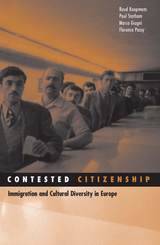 Contested Citizenship: Immigration and Cultural Diversity in Europe
Ruud Koopmans
University of Minnesota Press, 2005 From international press coverage of the French government’s attempt to prevent Muslims from wearing headscarves to terrorist attacks in Madrid and the United States, questions of cultural identity and pluralism are at the center of the world’s most urgent events and debates. Presenting an unprecedented wealth of empirical research garnered during ten years of a cross-cultural project, Contested Citizenship addresses these fundamental issues by comparing collective actions by migrants, xenophobes, and antiracists in Germany, Britain, France, the Netherlands, and Switzerland.
Revealing striking cross-national differences in how immigration and diversity are contended by different national governments, these authors find that how citizenship is constructed is the key variable defining the experience of Europe’s immigrant populations. Contested Citizenship provides nuanced policy recommendations and challenges the truism that multiculturalism is always good for immigrants. Even in an age of European integration and globalization, the state remains a critical actor in determining what points of view are sensible and realistic—and legitimate—in society.
Ruud Koopmans is professor of sociology at Free University, Amsterdam. Paul Statham is reader in political communications at the University of Leeds. Marco Giugni is a researcher and teacher of political science at the University of Geneva. Florence Passy is assistant professor of political science at the University of Lausanne, Switzerland.
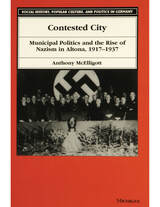 Contested City
Anthony McElligott
University of Michigan Press, 1998 In the wake of the First World War, many Germans saw the future of their nation as contingent on a vision of municipal progress. In this well-researched study, Anthony McElligott uses an analysis of local politics to decipher the fate of the Weimar Republic. Focusing on the industrial city of Altona, McElligott locates his discussion of the contradictions of the Weimar "local state" along two axes--first, persistent financial, policy, and political conflict between the central and the local state and, second, the conflicts within the Weimar local state between the displaced and resentful middle/lower-middle class and the newly enfranchised working class. Social Democrats used their considerable political influence at the level of local government to pursue progressive social policies, local experiments in "practical socialism." Socialist programs, however, alienated middle and lower middle-class voters without guaranteeing the support of all workers, since the dwindling financial resources of local governments made it impossible to extend the benefits of the new social programs to many of the unskilled and poorer sections of the working class. Ultimately, the translation of the democratic republican vision into active policy provoked the conservative push for a reassertion of central authority in the state. McElligott probes beneath the level of formal, local party conflicts to reconstruct the "politics of everyday life" at the street level. This study will be of wide interest to historians and political scientists. Anthony McElligott is Lecturer in Modern History, University of St. Andrews, Scotland.
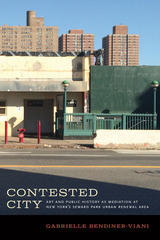 Contested City: Art and Public History as Mediation at New York's Seward Park Urban Renewal Area
Gabrielle Bendiner-Viani
University of Iowa Press, 2018 2020 Brendan Gill Prize finalist
For forty years, as New York’s Lower East Side went from disinvested to gentrified, residents lived with a wound at the heart of the neighborhood, a wasteland of vacant lots known as the Seward Park Urban Renewal Area (SPURA). Most of the buildings on the fourteen-square-block area were condemned in 1967, displacing thousands of low-income people of color with the promise that they would soon return to new housing—housing that never came. Over decades, efforts to keep out affordable housing sparked deep-rooted enmity and stalled development, making SPURA a dramatic study of failed urban renewal, as well as a microcosm epitomizing the greatest challenges faced by American cities since World War II. Artist and urban scholar Gabrielle Bendiner-Viani was invited to enter this tense community to support a new approach to planning, which she accepted using collaboration, community organizing, public history, and public art. Having engaged her students at The New School in a multi-year collaboration with community activists, the exhibitions and guided tours of her Layered SPURA project provided crucial new opportunities for dialogue about the past, present, and future of the neighborhood. Simultaneously revealing the incredible stories of community and activism at SPURA, and shedding light on the importance of collaborative creative public projects, Contested City bridges art, design, community activism, and urban history. This is a book for artists, planners, scholars, teachers, cultural institutions, and all those who seek to collaborate in new ways with communities.
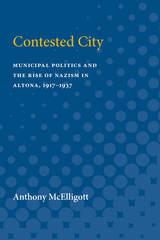 Contested City: Municipal Politics and the Rise of Nazism in Altona, 1917-1937
Anthony McElligott
University of Michigan Press, 1998 In the wake of the First World War, many Germans saw the future of their nation as contingent on a vision of municipal progress. In this well-researched study, Anthony McElligott uses local politics as an analytical tool to decipher the bigger picture of the fate of the Weimar Republic.Focusing on the industrial city of Altona, McElligott locates his discussion of the contradictions of the Weimar "local state" along two axes—first, persistent financial, policy, and political conflict between the central and the local state; and, second, the conflicts within the Weimar local state between the displaced and resentful middle classes and the newly enfranchised working class.The Social Democrats used their considerable political influence at the local level to pursue progressive social policies. However, these local experiments in "practical socialism" alienated middle- and lower-middle-class voters without guaranteeing the support of all workers, since dwindling financial resources made it impossible to extend the benefits of the new social programs to many of the unskilled and poorer sections of the working class. Ultimately, the translation of the democratic republican vision into active policy provoked the conservative push for reassertion of central authority in the state.McElligott probes beneath the level of formal party conflicts to reconstruct the "politics of everyday life" at the street level. This study will be of wide interest to historians and political scientists.
 Contested Commodities
Margaret Jane Radin
Harvard University Press, 2001 Not only are there willing buyers for body parts or babies, Radin observes, but some desperately poor people would be willing sellers, while better-off people find such trades abhorrent. Radin observes that many such areas of contested commodification reflect a persistent dilemma in liberal society: we value freedom of choice and simultaneously believe that choices ought to be restricted to protect the integrity of what it means to be a person. She views this tension as primarily the result of underlying social and economic inequality, which need not reflect an irreconcilable conflict in the premises of liberal democracy.
As a philosophical pragmatist, the author therefore argues for a conception of incomplete commodification, in which some contested things can be bought and sold, but only under carefully regulated circumstances. Such a regulatory regime both symbolizes the importance of nonmarket value to personhood and aspires to ameliorate the underlying conditions of inequality.
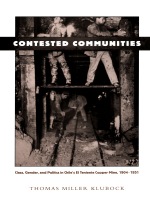 Contested Communities: Class, Gender, and Politics in Chile’s El Teniente Copper Mine, 1904-1951
Thomas Miller Klubock
Duke University Press, 1998 In Contested Communities Thomas Miller Klubock analyzes the experiences of the El Teniente copper miners during the first fifty years of the twentieth century. Describing the everyday life and culture of the mining community, its impact on Chilean politics and national events, and the sense of self and identity working-class men and women developed in the foreign-owned enclave, Klubock provides important insights into the cultural and social history of Chile.
Klubock shows how a militant working-class community was established through the interplay between capitalist development, state formation, and the ideologies of gender. In describing how the North American copper company attempted to reconfigure and reform the work and social-cultural lives of men and women who migrated to the mine, Klubock demonstrates how struggles between labor and capital took place on a gendered field of power and reconstituted social constructions of masculinity and femininity. As a result, Contested Communities describes more accurately than any previous study the nature of grassroots labor militancy, working-class culture, and everyday politics of gender relations during crucial years of the Chilean Popular Front in the 1930s and 1940s.
The Contested Country: Yugoslav Unity and Communist Revolution, 1919-1953
Aleksa Djilas
Harvard University Press, 1991 Published amid the unraveling of the second Yugoslavia, The Contested Country lays bare the roots of the idea of Yugoslav unity--its conflict with the Croatian and Serbian national ideologies and its peculiar alliance with liberal and progressive, especially Communist, ideologies.
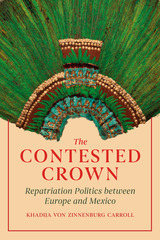 The Contested Crown: Repatriation Politics between Europe and Mexico
Khadija von Zinnenburg Carroll
University of Chicago Press, 2022 Following conflicting desires for an Aztec crown, this book explores the possibilities of repatriation.
In The Contested Crown, Khadija von Zinnenburg Carroll meditates on the case of a spectacular feather headdress believed to have belonged to Montezuma, emperor of the Aztecs. This crown has long been the center of political and cultural power struggles, and it is one of the most contested museum claims between Europe and the Americas. Taken to Europe during the conquest of Mexico, it was placed at Ambras Castle, the Habsburg residence of the author’s ancestors, and is now in Vienna’s Welt Museum. Mexico has long requested to have it back, but the Welt Museum uses science to insist it is too fragile to travel.
Both the biography of a cultural object and a history of collecting and colonizing, this book offers an artist’s perspective on the creative potentials of repatriation. Carroll compares Holocaust and colonial ethical claims, and she considers relationships between indigenous people, international law and the museums that amass global treasures, the significance of copies, and how conservation science shapes collections. Illustrated with diagrams and rare archival material, this book brings together global history, European history, and material culture around this fascinating object and the debates about repatriation.
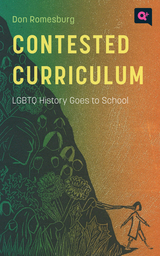 Contested Curriculum: LGBTQ History Goes to School
Don Romesburg
Rutgers University Press, 2025 Today, many states have proposed so-called “Don’t Say Gay” bills that prohibit public school teachers from mentioning LGBTQ topics in the classroom. But a few states, like California, have taken decisive steps in the other direction. They mandate inclusive education that treats LGBTQ history as essential to the curriculum. At once a history of an evolving movement and an activist handbook, Contested Curriculum navigates the rocky path to LGBTQ-inclusive K–12 history education in the United States and recounts the fight for a curriculum that recognizes the value of queer and trans lives.
What began in fits and starts in activism and educational materials across the late twentieth century led to the passage of California’s landmark FAIR Education Act in 2011, ensuring that LGBTQ history has a place in the K–12 classroom. Historian Don Romesburg, the lead scholar who worked with advocacy organizations to pass the act, recounts the decades-long struggle to integrate LGBTQ content into history education policy, textbooks, and classrooms. Looking at California and states that followed its lead, he assesses the challenges and opportunities presented by this new way of teaching history. Romesburg’s powerful case for LGBTQ-inclusive education is all the more urgent in this era of anti-gay book bans, regressive legislation, and attempts to diminish the vital role that inclusive and honest history education should play in a democratic nation.
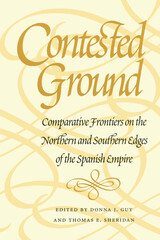 Contested Ground: Comparative Frontiers on the Northern and Southern Edges of the Spanish Empire
Edited by Donna J. Guy and Thomas E. Sheridan
University of Arizona Press, 1998 The Spanish empire in the Americas spanned two continents and a vast diversity of peoples and landscapes. Yet intriguing parallels characterized conquest, colonization, and indigenous resistance along its northern and southern frontiers, from the role played by Jesuit missions in the subjugation of native peoples to the emergence of livestock industries, with their attendant cowboys and gauchos and threats of Indian raids. In this book, nine historians, three anthropologists, and one sociologist compare and contrast these fringes of New Spain between 1500 and 1880, showing that in each region the frontier represented contested ground where different cultures and polities clashed in ways heretofore little understood. The contributors reveal similarities in Indian-white relations, military policy, economic development, and social structure; and they show differences in instances such as the emergence of a major urban center in the south and the activities of rival powers. The authors also show how ecological and historical differences between the northern and southern frontiers produced intellectual differences as well. In North America, the frontier came to be viewed as a land of opportunity and a crucible of democracy; in the south, it was considered a spawning ground of barbarism and despotism. By exploring issues of ethnicity and gender as well as the different facets of indigenous resistance, both violent and nonviolent, these essays point up both the vitality and the volatility of the frontier as a place where power was constantly being contested and negotiated.
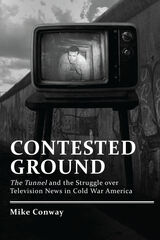 Contested Ground: The Tunnel and the Struggle over Television News in Cold War America
Mike Conway
University of Massachusetts Press, 2019 In 1962, an innovative documentary on a Berlin Wall tunnel escape brought condemnation from both sides of the Iron Curtain during one of the most volatile periods of the Cold War. The Tunnel, produced by NBC's Reuven Frank, clocked in at ninety minutes and prompted a range of strong reactions. While the television industry ultimately awarded the program three Emmys, the U.S. Department of State pressured NBC to cancel the program, and print journalists criticized the network for what they considered to be a blatant disregard of journalistic ethics.
It was not just The Tunnel's subject matter that sparked controversy, but the medium itself. The surprisingly fast ascendance of television news as the country's top choice for information threatened the self-defined supremacy of print journalism and the de facto cooperation of government officials and reporters on Cold War issues. In Contested Ground, Mike Conway argues that the production and reception of television news and documentaries during this period reveals a major upheaval in American news communications.
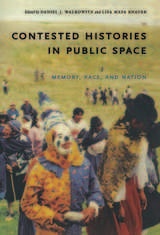 Contested Histories in Public Space: Memory, Race, and Nation
Daniel J. Walkowitz and Lisa Maya Knauer, eds.
Duke University Press, 2009 Contested Histories in Public Space brings multiple perspectives to bear on historical narratives presented to the public in museums, monuments, texts, and festivals around the world, from Paris to Kathmandu, from the Mexican state of Oaxaca to the waterfront of Wellington, New Zealand. Paying particular attention to how race and empire are implicated in the creation and display of national narratives, the contributing historians, anthropologists, and other scholars delve into representations of contested histories at such “sites” as a British Library exhibition on the East India Company, a Rio de Janeiro shantytown known as “the cradle of samba,” the Ellis Island immigration museum, and high-school history textbooks in Ecuador. Several contributors examine how the experiences of indigenous groups and the imperial past are incorporated into public histories in British Commonwealth nations: in Te Papa, New Zealand’s national museum; in the First Peoples’ Hall at the Canadian Museum of Civilization; and, more broadly, in late-twentieth-century Australian culture. Still others focus on the role of governments in mediating contested racialized histories: for example, the post-apartheid history of South Africa’s Voortrekker Monument, originally designed as a tribute to the Voortrekkers who colonized the country’s interior. Among several essays describing how national narratives have been challenged are pieces on a dispute over how to represent Nepali history and identity, on representations of Afrocuban religions in contemporary Cuba, and on the installation in the French Pantheon in Paris of a plaque honoring Louis Delgrès, a leader of Guadeloupean resistance to French colonialism.
Contributors. Paul Amar, Paul Ashton, O. Hugo Benavides, Laurent Dubois, Richard Flores, Durba Ghosh, Albert Grundlingh, Paula Hamilton, Lisa Maya Knauer, Charlotte Macdonald, Mark Salber Phillips, Ruth B. Phillips, Deborah Poole, Anne M. Rademacher, Daniel J. Walkowitz
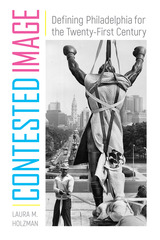 Contested Image: Defining Philadelphia for the Twenty-First Century
Laura M. Holzman
Temple University Press, 2019 Thomas Eakins’ 1875 painting, The Gross Clinic, the Rocky Statue, andthe Barnes Foundation are all iconic in Philadelphia for different reasons. But around the year 2000, this painting, this sculpture, and this entire art collection, respectively, generated extended—and heated—controversies about the “appropriate” location for each item. Contested Image revisits the debates that surrounded these works of visual culture and how each item changed through acts of reception—through the ways that viewers looked at, talked about, and used these objects to define their city. Laura Holzman investigates the negotiations and spirited debates that affected the city of Philadelphia’s identity and its public image. She considers how the region’s cultural resources reshaped the city’s reputation as well as delves into discussions about official efforts to boost local spirit. In tracking these “contested images,” Holzman illuminates the messy process of public envisioning of place and the ways in which public dialogue informs public meaning of both cities themselves and the objects of urban identity.
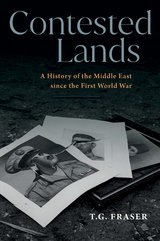 Contested Lands: A History of the Middle East From the First World War to the Present
T. G. Fraser
Haus Publishing, 2024 A history of the last century of tensions in the Middle East.
Until the First World War, the Ottoman Empire had dominated the Middle East for four centuries. Its collapse, coupled with the subsequent clash of European imperial policies, unleashed a surge of political feelings among the people of the Middle East as they vied for national self-determination. Over the century that followed, the region has become almost synonymous with unrest and conflict.
An accessible survey of the last century, Contested Lands tells the story of what happened in the Middle East and what it means today. T. G. Fraser analyzes the fault lines of the tension, including the damage brought by imperialism, the creation of the State of Israel, competition between secular rulers and emerging democratic and theocratic forces, and the rise of Arab Nationalism in the face of fraying regional alliances and the Islamic revival. Fraser offers a close look at how the events of the twenty-first century—the tragedy of 9/11, the Arab Spring, and Syria’s civil war—have combined with complex social and economic changes to transform the region. Untangling the history of the Middle East, this book offers a detailed and insightful picture of the region and why its heritage remains important today.
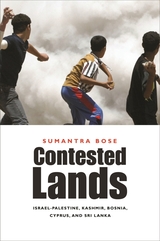 Contested Lands: Israel-Palestine, Kashmir, Bosnia, Cyprus, and Sri Lanka
Sumantra Bose
Harvard University Press, 2012 The search for durable peace in lands torn by ethno-national conflict is among the most urgent issues of international politics. Looking closely at five flashpoints of regional crisis, Sumantra Bose asks the question upon which our global future may depend: how can peace be made, and kept, between warring groups with seemingly incompatible claims? Global in scope and implications but local in focus and method, Contested Lands critically examines the recent or current peace processes in Israel-Palestine, Kashmir, Bosnia, Cyprus, and Sri Lanka for an answer.
Israelis and Palestinians, Turkish and Greek Cypriots, Bosnia's Muslims, Serbs, and Croats, Sinhalese and Tamil Sri Lankans, and pro-independence, pro-Pakistan, and pro-India Kashmiris share homelands scarred by clashing aspirations and war. Bose explains why these lands became zones of zero-sum conflict and boldly tackles the question of how durable peace can be achieved. The cases yield important general insights about the benefits of territorial self-rule, cross-border linkages, regional cooperation, and third-party involvement, and the risks of a deliberately gradual ("incremental") strategy of peace-building.
Rich in narrative and incisive in analysis, this book takes us deep into the heartlands of conflict--Jerusalem, Kashmir's Line of Control, the divided cities of Mostar in Bosnia and Nicosia in Cyprus, Sri Lanka's Jaffna peninsula. Contested Lands illuminates how chronic confrontation can yield to compromise and coexistence in the world's most troubled regions--and what the United States can do to help.
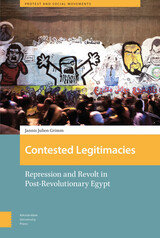 Contested Legitimacies: Repression and Revolt in Post-Revolutionary Egypt
Jannis Julien Grimm
Amsterdam University Press, 2022 Since the overthrow of President Mursi in mid-2013, Egypt has witnessed an authoritarian rollback and shrinking spaces for civil society. Nationalist discourses have villified popular protest and channelled pressure for reform into a state-centric model of governance. Despite this hostile environment for social mobilization, protest has persisted. Contested Legitimacies explores this resilience of contentious politics through a multimethod approach that is attuned to the physical and discursive interactions among key players in Egypt’s protest arena. Drawing from a unique archive of sources, it investigates the rise and fall of different coalitions of contenders, from the Tamarod uprising against Mursi, to the Anti-Coup resistance against the military coup, to the challenges posed by the Tiran and Sanafir island campaign to Al-Sisi's regime. It highlights the decisive impact of battles fought in a discursive arena on the conditions of possibility for street politics: In postrevolutionary Egypt, a contest over the meaning of political legitimacy cemented political polarization, limited social movements’ coalition choices, and ultimately paved the way for a restoration of autocracy.
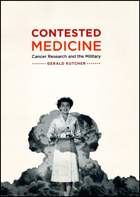 Contested Medicine: Cancer Research and the Military
Gerald Kutcher
University of Chicago Press, 2009 In the 1960s University of Cincinnati radiologist Eugene Saenger infamously conducted human experiments on patients with advanced cancer to examine how total body radiation could treat the disease. But, under contract with the Department of Defense, Saenger also used those same patients as proxies for soldiers to answer questions about combat effectiveness on a nuclear battlefield.
Using the Saenger case as a means to reconsider cold war medical trials, Contested Medicine examines the inherent tensions at the heart of clinical studies of the time. Emphasizing the deeply intertwined and mutually supportive relationship between cancer therapy with radiation and military medicine, Gerald Kutcher explores post–World War II cancer trials, the efforts of the government to manage clinical ethics, and the important role of military investigations in the development of an effective treatment for childhood leukemia. Whereas most histories of human experimentation judge research such as Saenger’s against idealized practices, Contested Medicine eschews such an approach and considers why Saenger’s peers and later critics had so much difficulty reaching an unambiguous ethical assessment. Kutcher’s engaging investigation offers an approach to clinical ethics and research imperatives that lays bare many of the conflicts and tensions of the postwar period.
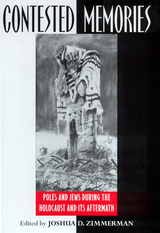 Contested Memories: Poles and Jews during the Holocaust and Its Aftermath
Zimmerman, Joshua D.
Rutgers University Press, 2003 Few issues have divided Poles and Jews more deeply than the Nazi occupation of Poland during the Second World War and the subsequent slaughter of almost ninety percent of Polish Jewry. Many Jewish historians have argued that, during the occupation, Poles at best displayed indifference to the fate of the Jews and at worst were willing accomplices of the Nazis. Many Polish scholars, however, deny any connection between the prewar culture of antisemitism and the wartime situation. They emphasized that Poles were also victims of the Nazis and, for the most part, tried their best to protect the Jews.
This collection of essays, representing three generations of Polish and Jewish scholars, is the first attempt since the fall of Communism to reassess the existing historiography of Polish-Jewish relations just before, during, and after the Second World War. In the spirit of detached scholarly inquiry, these essays fearlessly challenge commonly held views on both sides of the debates. The authors are committed to analyzing issues fairly and to reaching a mutual understanding. Contributors cover six topics:
1. The prewar legacy
2. The deterioration of Polish-Jewish relations during the first years of the war
3. Institutional Polish responses to the Nazi Final Solution
4. Poles and the Polish nation through Jewish eyes
5. The destruction of European Jewry and Polish popular opinion
6. Polish-Jewish relations since 1945
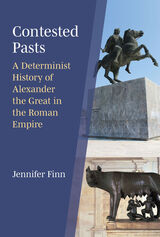 Contested Pasts: A Determinist History of Alexander the Great in the Roman Empire
Jennifer Finn
University of Michigan Press, 2022 Taking as a key turning point the self-fashioning of the first Roman emperor Augustus, author Jennifer Finn revisits the idea of “universal history” in Polybius, Justin, and Diodorus, combined with the Stoic philosophy of determinism present in authors like Plutarch and Arrian. Finn endeavors to determine the ways in which Roman authors manipulated narratives about Alexander’s campaigns—and even other significant events in Mediterranean history—to artificially construct a past to which the Romans could attach themselves as a natural teleological culmination. In doing so, Contested Pasts uses five case studies to reexamine aspects of Alexander’s campaigns that have received much attention in modern scholarship, providing new interpretations of issues such as: his connections to the Trojan and Persian wars; the Great Weddings at Susa; the battle(s) of Thermopylae in 480 BCE and 191 BCE and Alexander's conflict at the Persian Gates; the context of his “Last Plans”;” the role of his memory in imagining the Roman Civil Wars; and his fictitious visit to the city of Jerusalem. While Finn demonstrates throughout the book that the influence for many of these narratives likely originated in the reign of Alexander or his Successors, nevertheless these retroactive authorial manipulations force us to confront the fact that we may have an even more opaque understanding of Alexander than has previously been acknowledged. Through the application of a mnemohistorical approach, the book seeks to provide a new understanding of the ways in which the Romans—and people in the purview of the Romans—conceptualized their own world with reference to Alexander the Great.
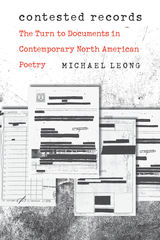 Contested Records: The Turn to Documents in Contemporary North American Poetry
Michael Leong
University of Iowa Press, 2020 Why have so many contemporary poets turned to source material, from newspapers to governmental records, as inspiration for their poetry? How can citational poems offer a means of social engagement? Contested Records analyzes how some of the most well-known twenty-first century North American poets work with fraught documents. Whether it’s the legal paperwork detailing the murder of 132 African captives, state transcriptions of the last words of death row inmates, or testimony from miners and rescue workers about a fatal mine disaster, author Michael Leong reveals that much of the power of contemporary poetry rests in its potential to select, adapt, evaluate, and extend public documentation. Examining the use of documents in the works of Kenneth Goldsmith, Vanessa Place, Amiri Baraka, Claudia Rankine, M. NourbeSe Philip, and others, Leong reveals how official records can evoke a wide range of emotions—from hatred to veneration, from indifference to empathy, from desire to disgust. He looks at techniques such as collage, plagiarism, re-reporting, and textual outsourcing, and evaluates some of the most loved—and reviled—contemporary North American poems. Ultimately, Leong finds that if bureaucracy and documentation have the power to police and traumatize through the exercise of state power, then so, too, can document-based poetry function as an unofficial, counterhegemonic, and popular practice that authenticates marginalized experiences at the fringes of our cultural memory.
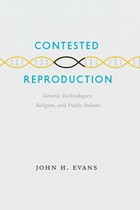 Contested Reproduction: Genetic Technologies, Religion, and Public Debate
John H. Evans
University of Chicago Press, 2010 Scientific breakthroughs have led us to a point where soon we will be able to make specific choices about the genetic makeup of our offspring. In fact, this reality has arrived—and it is only a matter of time before the technology becomes widespread.
Much like past arguments about stem-cell research, the coming debate over these reproductive genetic technologies (RGTs) will be both political and, for many people, religious. In order to understand how the debate will play out in the United States, John H. Evans conducted the first in-depth study of the claims made about RGTs by religious people from across the political spectrum, and Contested Reproduction is the stimulating result.
Some of the opinions Evans documents are familiar, but others—such as the idea that certain genetic conditions produce a “meaningful suffering” that is, ultimately, desirable—provide a fascinating glimpse of religious reactions to cutting-edge science. Not surprisingly, Evans discovers that for many people opinion on the issue closely relates to their feelings about abortion, but he also finds a shared moral language that offers a way around the unproductive polarization of the abortion debate and other culture-war concerns. Admirably evenhanded, Contested Reproduction is a prescient, profound look into the future of a hot-button issue.
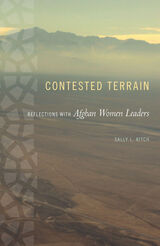 Contested Terrain: Reflections with Afghan Women Leaders
Sally L Kitch
University of Illinois Press, 2014 Sally L. Kitch explores the crisis in contemporary Afghan women’s lives by focusing on two remarkable Afghan professional women working on behalf of their Afghan sisters. Kitch's compelling narrative follows the stories of Judge Marzia Basel and Jamila Afghani from 2005 through 2013, providing an oft-ignored perspective on the personal and professional lives of Afghanistan's women. Contending with the complex dynamics of a society both undergoing and resisting change, Basel and Afghani speak candidly--and critically--of matters like international intervention and patriarchal Afghan culture, capturing the ways in which immense possibility alternates and vies with utter hopelessness. Strongly rooted in feminist theory and interdisciplinary historical and geopolitical analysis, Contested Terrain sheds new light on the struggle against the powerful forces that affect Afghan women's education, health, political participation, livelihoods, and quality of life. The book also suggests how a new dialogue might be started--in which women from across geopolitical boundaries might find common cause for change and rewrite their collective stories.
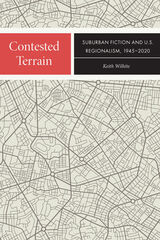 Contested Terrain: Suburban Fiction and U.S. Regionalism, 1945-2020
Keith Wilhite
University of Iowa Press, 2022 Contested Terrain explores suburban literature between two moments of domestic crisis: the housing shortage that gave rise to the modern era of suburbanization after World War II, and the mortgage defaults and housing foreclosures that precipitated the Great Recession. Moving away from scholarship that highlights the alienating, placeless quality of suburbia, Wilhite argues that we should reimagine suburban literature as part of a long literary tradition of U.S. regional writing that connects the isolation and exclusivity of the domestic realm to the expansionist ideologies of U.S. nationalism and the environmental imperialism of urban sprawl. Wilhite produces new, unexpected readings of works by Sinclair Lewis, Lorraine Hansberry, Richard Yates, Patricia Highsmith, Don DeLillo, Jonathan Franzen, Jeffrey Eugenides, Chang-rae Lee, Richard Ford, Jung Yun, and Patrick Flanery. Contested Terrain demonstrates how postwar suburban nation-building ushered in an informal geography that recalibrated notions of national identity, democratic citizenship, and domestic security to the scale of the single-family home.
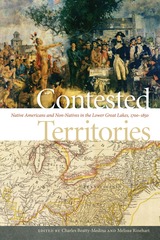 Contested Territories: Native Americans and Non-Natives in the Lower Great Lakes, 1700-1850
Charles Beatty-Medina
Michigan State University Press, 2012 A remarkable multifaceted history, Contested Territories examines a region that played an essential role in America's post-revolutionary expansion—the Lower Great Lakes region, once known as the Northwest Territory. As French, English, and finally American settlers moved westward and intersected with Native American communities, the ethnogeography of the region changed drastically, necessitating interactions that were not always peaceful. Using ethnohistorical methodologies, the seven essays presented here explore rapidly changing cultural dynamics in the region and reconstruct in engaging detail the political organization, economy, diplomacy, subsistence methods, religion, and kinship practices in play. With a focus on resistance, changing worldviews, and early forms of self-determination among Native Americans, Contested Territories demonstrates the continuous interplay between actor and agency during an important era in American history.
 Contested Territory: Mapping Peru in the Sixteenth and Seventeenth Centuries
Heidi V. Scott
University of Notre Dame Press, 2009
Landscape is never static, but changes continuously when seen in relation to human occupation, movement, labor, and discourse. Contested Territory explores the ways in which Peru's early colonial landscapes were experienced and portrayed, especially by the Spanish conquerors but also by their conquered subjects. It focuses on the role played by indigenous groups in shaping the Spanish experiences of landscapes, the diverse geographical images of Peru and ways in which these were constructed and contested, and what this can tell us about the nature of colonial relations in post-conquest Peru. This exceptional study, which draws from archival records and sources such as cartographies, offers a richly nuanced view of the complexity of colonial relations. It will be read with appreciation by those interested in Spanish history, geography, and colonialism.
"Heidi Scott's eloquently written, straightforward, and original analysis perceptively highlights how cultural preconceptions, ambitions, and desires and shifting networks of power, agency, and interest shaped on-going negotiations over the perceptions, meaning, and use of landscape and geographical knowledge. Through social and political contextualization of a text's origins and her emphasis on the mundane, she shows that Hispanic and Amerindian populations gave diverse and frequently conflicting meaning to Andean landscapes and territories. The book will, I predict, long serve as a model and inspiration to others interested in colonial history and geography, anthropology, and environmental studies." --Susan Ramirez, Texas Christian University
"Scott's thesis of landscape creation is nuanced and sophisticated, convincing and compelling, one most befitting a geographer: she is very much interested in, and attuned to, regional as well as local variations. Few anthropologists or historians exhibit the sensitivities to space and scale that Scott demonstrates in piecing together her argument." --W. George Lovell, Queen's University
"A fine and timely study on an important topic, this well-researched and well-written book will be an excellent addition to scholarship on colonial studies. . . . [Scott's] selection of texts is both original and exciting. She clearly expands the field of analysis of the complex workings of geography within the early Spanish colonial context." --Beatriz Pastor, Dartmouth College
Contested Truths: Keywords in American Politics since Independence
Daniel T. Rodgers
Harvard University Press Contention, argument, and power have always been the tradition in American political talk. Any country that began in a revolution was bound to have this history. But the language of argument uses particular words with particular, sometimes shifting, meanings and to know what they are and what they meant over time is a critical contribution to political history. It is true that politicians may act as though they are part of no particular ideological tradition, but history shows that, more often than not, they use an understood meaning to enhance their actions. As Daniel T. Rodgers shows in this book, rhetoric has consequences.
Contested Views of a Common Past: Revisions of History in Contemporary East Asia
Edited by Steffi Richter
Campus Verlag, 2008 In contemporary East Asia, rapid social and political changes have led to multiple shifts in historical perspective. Recent history, marked by the experience of colonialism and wars, has become an object of intense debate both within and among Japan, South Korea, China, and Taiwan. Contested Views of a Common Past brings together renowned scholars to analyze historical revisionism in politics, historiography, education, and the media. Drawing on a number of theoretical, cross-national, and comparative perspectives, these essays demonstrate how and why historical events have been reevaluated in specific social, political, and cultural contexts. History is thus revealed not only as a source and expression of various nationalisms, but also as a starting point for trans-national understanding and reconciliation.
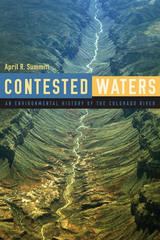 Contested Waters: An Environmental History of the Colorado River
April R. Summitt
University Press of Colorado, 2013 "To fully understand this river and its past, one must examine many separate pieces of history scattered throughout two nations--seven states within the United States and two within Mexico--and sort through a large amount of scientific data. One needs to be part hydrologist, geologist, economist, sociologist, anthropologist, and historian to fully understand the entire story. Despite this river's narrow size and meager flow, its tale is very large indeed." -From the conclusion The Colorado River is a vital resource to urban and agricultural communities across the Southwest, providing water to 30 million people. Contested Waters tells the river's story-a story of conquest, control, division, and depletion. Beginning in prehistory and continuing into the present day, Contested Waters focuses on three important and often overlooked aspects of the river's use: the role of western water law in its over-allocation, the complexity of power relationships surrounding the river, and the concept of sustainable use and how it has been either ignored or applied in recent times. It is organized in two parts, the first addresses the chronological history of the river and long-term issues, while the second examines in more detail four specific topics: metropolitan perceptions, American Indian water rights, US-Mexico relations over the river, and water marketing issues. Creating a complete picture of the evolution of this crucial yet over-utilized resource, this comprehensive summary will fascinate anyone interested in the Colorado River or the environmental history of the Southwest.
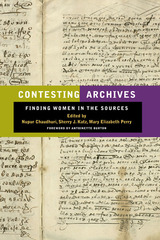 Contesting Archives: Finding Women in the Sources
Edited by Nupur Chaudhuri, Sherry J. Katz, and Mary Elizabeth Perry
University of Illinois Press, 2010 The contributors of Contesting Archives challenge the assumption that an archive is a neutral, immutable, and a historical repository of information. Instead, these historians view it as a place where decisions are made about whose documents--and therefore whose history--is important. Finding that women's voices and their texts were often obscured or lost altogether, they have developed many new methodologies for creating unique archives and uncovering more evidence by reading documents "against the grain," weaving together many layers of information to reveal complexities and working collectively to reconstruct the lives of women in the past. Global in scope, this volume demonstrates innovative research on diverse women from the sixteenth century to the present in Spain, Mexico, Tunisia, India, Iran, Poland, Mozambique, and the United States. Addressing gender, race, class, nationalism, transnationalism, and migration, these essays' subjects include indigenous women of colonial Mexico, Muslim slave women, African American women of the early twentieth century, Bengali women activists of pre-independence India, wives and daughters of Qajar rulers in Iran, women industrial workers in communist Poland and socialist Mozambique, and women club owners in modern Las Vegas. A foreword by Antoinette Burton adroitly synthesizes the disparate themes woven throughout the book. Contributors are Janet Afary, Maryam Ameli-Rezai, Antoinette Burton, Nupur Chaudhuri, Julia Clancy-Smith, Mansoureh Ettehadieh, Malgorzata Fidelis, Joanne L. Goodwin, Kali Nicole Gross, Daniel S. Haworth, Sherry J. Katz, Elham Malekzadeh, Mary Elizabeth Perry, Kathleen Sheldon, Lisa Sousa, and Ula Y. Taylor.
Contesting Austerity: Social Movements and the Left in Portugal and Spain (2008-2015)
Tiago Carvalho
Amsterdam University Press, 2022 Contesting Austerity compares the contentious responses to austerity in Portugal and Spain between 2008 and 2015. While in Spain a sustained wave of mobilisation lasted for three years and led to a transformation of the party system, in Portugal social movements mobilised only in specific instances, trade unions dominated protest and institutional change was limited. Contesting Austerity shows that trajectories and outcomes in these countries are linked to the nature and configurations of the players in the mobilisation process.
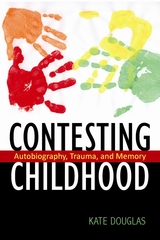 Contesting Childhood: Autobiography, Trauma, and Memory
Douglas, Kate
Rutgers University Press, 2010 The late 1990s and early 2000s witnessed a surge in the publication and popularity of autobiographical writings about childhood. Linking literary and cultural studies, Contesting Childhood draws on a varied selection of works from a diverse range of authorsùfrom first-time to experienced writers. Kate Douglas explores Australian accounts of the Stolen Generation, contemporary American and British narratives of abuse, the bestselling memoirs of Andrea Ashworth, Augusten Burroughs, Robert Drewe, Mary Karr, Frank McCourt, Dave Pelzer, and Lorna Sage, among many others. Drawing on trauma and memory studies and theories of authorship and readership, Contesting Childhood offers commentary on the triumphs, trials, and tribulations that have shaped this genre. Douglas examines the content of the narratives and the limits of their representations, as well as some of the ways in which autobiographies of youth have become politically important and influential. This study enables readers to discover how stories configure childhood within cultural memory and the public sphere.
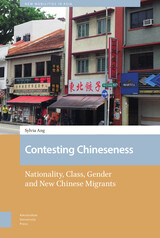 Contesting Chineseness: Nationality, Class, Gender and New Chinese Migrants
Sylvia Ang
Amsterdam University Press, 2022 Nearly eleven million Chinese migrants live outside of China. While many of these faces of China’s globalization headed for the popular Western destinations of the United States, Australia and Canada, others have been lured by the booming Asian economies. Compared with pre-1949 Chinese migrants, most are wealthier, motivated by a variety of concerns beyond economic survival and loyal to the communist regime. The reception of new Chinese migrants, however, has been less than warm in some places. In Singapore, tensions between Singaporean-Chinese and new Chinese arrivals present a puzzle: why are there tensions between ethnic Chinese settlers and new Chinese arrivals despite similarities in phenotype, ancestry and customs? Drawing on rich empirical data from ethnography and digital ethnography, Contesting Chineseness: Nationality, Class, Gender and New Chinese Migrants investigates this puzzle and details how ethnic Chinese subjects negotiate their identities in an age of contemporary Chinese migration and China’s ascent.
 Contesting Clio's Craft: New Directions and Debates in Canadian History
Edited by Christopher Dummitt and Michael Dawson
University of London Press, 2009 This book offers innovative thoughts on present and future approaches to the study of the Canadian past. Moving beyond the political vs. social history debates that have dominated the field since the 1970s, these essays suggest novel questions and approaches while delving into recently overlooked subjects. The authors place a particular emphasis on international, transnational, and comparative approaches to the past. Essays cover such topics as the Atlantic World, oral history, postcolonialism, public history, historical periodization, Canada's place in the British Empire, and French-English relations. The art of history as a discipline and practice is also discussed. A must read for Canadian historians, Contesting Clio's Craft will also appeal to international scholars interested in these issues and curious about the contribution that Canadian history has made to the broader history of the Americas. Contributors include Michael Dawson (St.Thomas University), Michel Ducharme (University of British Columbia), Christopher Dummitt (Trent University), Magda Fahrni (Universite du Quebec a Montreal) Catherine Gidney (St.Thomas University), Steven High (Concordia University),Adele Perry (University of Manitoba), Katie Pickles (University of Canterbury), and Andrew Smith (Laurentian University).
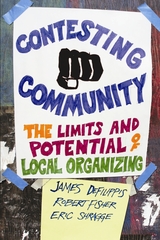 Contesting Community: The Limits and Potential of Local Organizing
DeFilippis, James
Rutgers University Press, 2010 What do community organizations and organizers do, and what should they do? For the past thirty years politicians, academics, advocates, and activists have heralded community as a site and strategy for social change. In contrast, Contesting Community paints a more critical picture of community work which, according to the authors--in both theory and practice--has amounted to less than the sum of its parts. Their comparative study of efforts in the United States, the United Kingdom, and Canada describes and analyzes the limits and potential of this work.
Covering dozens of groups, including ACORN, Brooklyn's Fifth Avenue Committee, and the Immigrant Workers Centre in Montreal, and discussing alternative models, this book is at once historical and contemporary, global and local. Contesting Community addresses one of the vital issues of our day--the role and meaning of community in people's lives and in the larger political economy.
 Contesting Copyright: A History of Intellectual Property in East Central Europe and the Balkans
Augusta Dimou
Central European University Press, 2025 The creative sector, including the cultural industry, is key for today’s economy. Copyright has the capacity to fix the roles and tasks of the actors involved and determine the direction of cash flows within this sector. The study of the evolution of copyright helps understand and adjust the regulation and commercialization of creative labor. Augusta Dimou provides a thoroughly researched, interdisciplinary and comparative study of the historical development of copyright regimes in three countries – Czechoslovakia, Yugoslavia, and Bulgaria. She examines the function and significance of copyright in the institutionalization, development, and regulation of modern culture in East Central Europe and the Balkans during the diverse political regimes of the modern era, and at the interface between the various nationalization and globalization processes of the 20th century. The bulk of the exposition deals with the first half of the twentieth century with a final chapter providing a summary history of copyright under communism. The author presents the development of copyright in East Central Europe in the context of the European and global history of intellectual property and the creative industries. The study considers the expansion of copyright in the multiple contexts (social, economic political, cultural, technological, ideological, legal) that sustained its rise and development.
 Contesting Cosmopolitan Europe: Euroscepticism, Crisis and Borders
James Foley
Amsterdam University Press, 2022 The project of European integration has undergone a succession of shocks, beginning with the Eurozone crisis, followed by reactions to the sudden growth of irregular migration, and, most recently, the Coronavirus pandemic. These shocks have politicised questions related to the governance of borders and markets that for decades had been beyond the realm of contestation. For some time, these questions have been spilling over into domestic and European electoral politics, with the rise of “populist” and Eurosceptic parties. Increasingly, however, the crises have begun to reshape the liberal narrative that have been central to the European project. This book charts the rise of contestation over the meaning of “Europe”, particularly in light of the Coronavirus crisis and Brexit. Drawing together cutting edge, interdisciplinary scholarship from across the continent, it questions not merely the traditional conflict between European and nationalist politics, but the impact of contestation on the assumed “cosmopolitan” values of Europe.
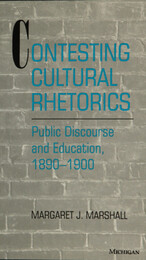 Contesting Cultural Rhetorics: Public Discourse and Education, 1890-1900
Margaret J. Marshall
University of Michigan Press, 1995 Contesting Cultural Rhetorics is a groundbreaking and original study that demonstrates how "education" is viewed as a contested term and a set of contested practices in American culture because it is inevitably linked to highly contested, value-laden terms. An examination of the public discourse of education not only reveals the ideologies and conceptions embedded in educative acts and institutions but also provides a means of examining how education itself functions in American culture as a site of contest between ideologies, values, and the constitution of individual and nation. Margaret J. Marshall's analysis employs a range of contemporary theorists from Bakhtin to Foucault and draws on a number of disciplinary perspectives, including law, history, and ethnography, where scholars have been examining discursive practices and where rhetoric is understood to be a means of examining cultural conceptions and embedded ideologies. Through these lenses she examines four influential and popular texts of the 1890s that serve to illuminate current public debates on education: Joseph Mayer Rice's articles in Forum, a well-respected magazine; Matthew Arnold's introduction to a government report; W. E. B. Du Bois's "A Negro Schoolmaster in the New South;" and Jane Addams's "A Function of the Social Settlement." Neither a history of education nor a typical literary analysis of the texts in question, this book considers the rhetorical stance of authors, the constitution of audience and subject, and the use of references and narratives as devices of authority. Taken together, these texts reveal the complicated public discussion of education in the 1890s—a period of transformation in culture, schooling, and the organization of knowledge. Moreover, they reveal the rhetorical structure of many of the questions Americans ask about education today: who should be educated, by whom, for what purposes, using what methods or materials? What of the past should we pass on to the future, and how? Contesting Cultural Rhetorics will be useful to readers interested in the history of education and nineteenth-century popular culture, as well as those involved in current debates on education and public policy.
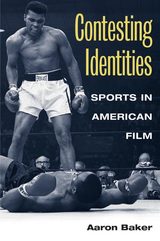 Contesting Identities: Sports in American Film
Aaron Baker
University of Illinois Press, 2003 Analysis of race, class and gender in American sports films Since the earliest days of the silent era, American filmmakers have been drawn to the visual spectacle of sports and their compelling narratives of conflict, triumph, and individual achievement. In Contesting Identities Aaron Baker examines how these cinematic representations of sports and athletes have evolved over time--from The Pinch Hitter and Buster Keaton's College to White Men Can't Jump, Jerry Maguire, and Girlfight. He focuses on how identities have been constructed and transcended in American society since the early twentieth century. Whether depicting team or individual sports, these films return to that most American of themes, the master narrative of self-reliance. Baker shows that even as sports films tackle socially constructed identities like class, race, ethnicity, sexuality, and gender, they ultimately underscore transcendence of these identities through self-reliance. Looking at films from almost every sporting genre--with a particular focus on movies about boxing, baseball, basketball, and football--Contesting Identities maps the complex cultural landscape depicted in American sports films and the ways in which stories about "subaltern" groups winning acceptance by the mainstream majority can serve to reinforce the values of that majority. In addition to discussing the genre's recurring dramatic tropes, from the populist prizefighter to the hot-headed rebel to the "manly" female athlete, Baker also looks at the social and cinematic impacts of real-life sports figures from Jackie Robinson and Babe Didrikson Zaharias to Muhammad Ali and Michael Jordan.
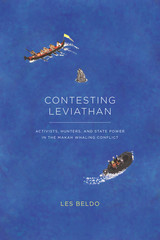 Contesting Leviathan: Activists, Hunters, and State Power in the Makah Whaling Conflict
Les Beldo
University of Chicago Press, 2019 In 1999, off the coast of the Pacific Northwest, the first gray whale in seven decades was killed by Makah whalers. The hunt marked the return of a centuries-old tradition and, predictably, set off a fierce political and environmental debate. Whalers from the Makah Indian Tribe and antiwhaling activists have clashed for over twenty years, with no end to this conflict in sight.
In Contesting Leviathan, anthropologist Les Beldo describes the complex judicial and political climate for whale conservation in the United States, and the limits of the current framework in which whales are treated as “large fish” managed by the National Marine Fisheries Service. Emphasizing the moral dimension of the conflict between the Makah, the US government, and antiwhaling activists, Beldo brings to light the lived ethics of human-animal interaction, as well as how different groups claim to speak for the whale—the only silent party in this conflict. A timely and sensitive study of a complicated issue, this book calls into question anthropological expectations regarding who benefits from the exercise of state power in environmental conflicts, especially where indigenous groups are involved. Vividly told and rigorously argued, Contesting Leviathan will appeal to anthropologists, scholars of indigenous culture, animal activists, and any reader interested in the place of animals in contemporary life.
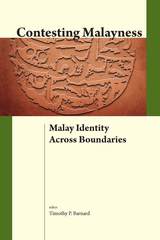 Contesting Malayness: Malay Identity Across Boundaries
Edited by Timothy P. Barnard
National University of Singapore Press, 2014 People who call themselves Malay - Melayu - are found in many countries, united by a notional shared identity but divided by political boundaries, divergent histories, variant dialects and peculiarities of local experience. While the term 'Malay' is widely used and readily understood in Southeast Asia, it remains elusive and open to varying interpretations. "Malay" as an identity, or nationality, is one of the most challenging and perplexing concepts in the multi-ethnic world of Southeast Asia. This book assembles research on the theme of how Malays have identified themselves in time and place, developed by a wide range of scholars. The authors include Malaysian anthropologist Shamsul A.B., Indonesian poet Tenas Effendy, and linguists and historians based in Australia, the Netherlands, Singapore and the U.S.A. While the authors describe some of the historical and cultural patterns that make up the Malay world, taken as a whole their work demonstrates the impossibility of offering a definition or even a description of 'Melayu' that is not rife with omissions and contradictions.
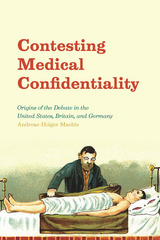 Contesting Medical Confidentiality: Origins of the Debate in the United States, Britain, and Germany
Andreas-Holger Maehle
University of Chicago Press, 2016 Medical confidentiality is an essential cornerstone of effective public health systems, and for centuries societies have struggled to maintain the illusion of absolute privacy. In this age of health databases and increasing connectedness, however, the confidentiality of patient information is rapidly becoming a concern at the forefront of worldwide ethical and political debate.
In Contesting Medical Confidentiality, Andreas-Holger Maehle travels back to the origins of this increasingly relevant issue. He offers the first comparative analysis of professional and public debates on medical confidentiality in the United States, Britain, and Germany during the late nineteenth and early twentieth centuries, when traditional medical secrecy first came under pressure from demands of disclosure in the name of public health. Maehle structures his study around three representative questions of the time that remain salient today: Do physicians have a privilege to refuse court orders to reveal confidential patient details? Is there a medical duty to report illegal procedures to the authorities? Should doctors breach confidentiality in order to prevent the spread of disease? Considering these debates through a unique historical perspective, Contesting Medical Confidentiality illuminates the ethical issues and potentially grave consequences that continue to stir up public debate.
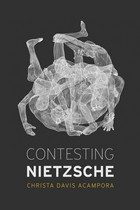 Contesting Nietzsche
Christa Davis Acampora
University of Chicago Press, 2013 A brilliant exploration of a significant and understudied aspect of Nietzsche’s philosophy.
In this groundbreaking work, Christa Davis Acampora offers a profound rethinking of Friedrich Nietzsche’s crucial notion of the agon. Analyzing an impressive array of primary and secondary sources and synthesizing decades of Nietzsche scholarship, she shows how the agon, or contest, organized core areas of Nietzsche’s philosophy, providing a new appreciation of the subtleties of his notorious views about power. By focusing so intensely on this particular guiding interest, she offers an exciting, original vantage from which to view this iconic thinker: Contesting Nietzsche. Though existence—viewed through the lens of Nietzsche’s agon—is fraught with struggle, Acampora illuminates what Nietzsche recognized as the agon’s generative benefits. It imbues the human experience with significance, meaning, and value. Analyzing Nietzsche’s elaborations of agonism—his remarks on types of contests, qualities of contestants, and the conditions in which either may thrive or deteriorate—she demonstrates how much the agon shaped his philosophical projects and critical assessments of others. The agon led him from one set of concerns to the next, from aesthetics to metaphysics to ethics to psychology, via Homer, Socrates, Saint Paul, and Wagner. In showing how one obsession catalyzed so many diverse interests, Contesting Nietzsche sheds fundamentally new light on some of this philosopher’s most difficult and paradoxical ideas.
Contesting Publics: Feminism, Activism, Ethnography
Lynne Phillips and Sally Cole
Pluto Press, 2014 Through ethnographic cases and activists’ narratives, Contesting Publics analyses the challenges feminists face as they seek to engage with new spaces of participatory democracy in Latin America.
Lynne Phillips and Sally Cole analyse how new silences, exclusions and re-inscriptions of inequalities have emerged alongside these new spaces of participation. The book re-examines the relationship between public and private and speaks to a larger theoretical question: what is the meaning of 'the public' within democracy projects?
Contesting Publics considers current debates among feminists from different generations on the merits of a variety of strategies, goals and issues, drawing out vital lessons for students, researchers and activists in anthropology, gender studies and Latin American studies.
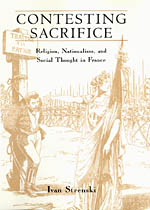 Contesting Sacrifice: Religion, Nationalism, and Social Thought in France
Ivan Strenski
University of Chicago Press, 2002 From the counter-reformation through the twentieth century, the notion of sacrifice has played a key role in French culture and nationalist politics. Ivan Strenski traces the history of sacrificial thought in France, starting from its origins in Roman Catholic theology. Throughout, he highlights not just the dominant discourse on sacrifice but also the many competing conceptions that contested it.
Strenski suggests that the annihilating spirituality rooted in the Catholic model of Eucharistic sacrifice persuaded the judges in the Dreyfus Case to overlook or play down his possible innocence because a scapegoat was needed to expiate the sins of France and save its army from disgrace. Strenski also suggests that the French army's strategy in World War I, French fascism, and debates over public education and civic morals during the Third Republic all owe much to Catholic theology of sacrifice and Protestant reinterpretations of it. Pointing out that every major theorist of sacrifice is French, including Bataille, Durkheim, Girard, Hubert, and Mauss, Strenski argues that we cannot fully understand their work without first taking into account the deep roots of sacrificial thought in French history.
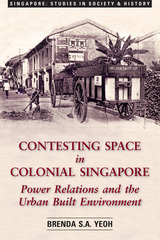 Contesting Space in Colonial Singapore: Power Relations and the Urban Built Environment
Brenda S.A. Yeoh
National University of Singapore Press, 2003 In the British colonial city of Singapore, municipal authorities and Asian communities faced off over numerous issue. As the city expanded, disputes arose in connection with sanitation, housing, street names, control over pedestrian 'five-foot-ways', and sacred spaces such as burial grounds. Brenda Yeoh's Contesting Space in Colonial Singapore details these conflicts and how they shaped the city. The British administration structured the private and public environments of the city with an eye toward shaping human behaviour, following scientific principles and the lessons of urban planning in other parts of the world. For the Asian communities, Singapore was the place where they lived according to their own values, priorities and resources. The two perceptions of the city frequently clashed, and the author reads the cityscape of Singapore as the result of this contest between discipline and resistance. Drawing on meticulous research and a theoretically sophisticated use of cultural and social geography, post-colonial historical discourse, and social theory, the author offers a compelling picture of a critical stage in Singapore's past. It is an important contribution to the study of colonial cities and an indispensable resource for understanding the shape of modern Singapore.
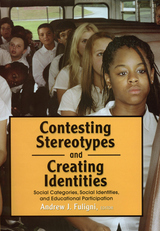 Contesting Stereotypes and Creating Identities: Social Categories, Social Identities, and Educational Participation
Andrew J. Fuligni
Russell Sage Foundation, 2007 Since the end of legal segregation in schools, most research on educational inequality has focused on economic and other structural obstacles to the academic achievement of disadvantaged groups. But in Contesting Stereotypes and Creating Identities, a distinguished group of psychologists and social scientists argue that stereotypes about the academic potential of some minority groups remain a significant barrier to their achievement. This groundbreaking volume examines how low institutional and cultural expectations of minorities hinder their academic success, how these stereotypes are perpetuated, and the ways that minority students attempt to empower themselves by redefining their identities. The contributors to Contesting Stereotypes and Creating Identities explore issues of ethnic identity and educational inequality from a broad range of disciplinary perspectives, drawing on historical analyses, social-psychological experiments, interviews, and observation. Meagan Patterson and Rebecca Bigler show that when teachers label or segregate students according to social categories (even in subtle ways), students are more likely to rank and stereotype one another, so educators must pay attention to the implicit or unintentional ways that they emphasize group differences. Many of the contributors contest John Ogbu's theory that African Americans have developed an "oppositional culture" that devalues academic effort as a form of "acting white." Daphna Oyserman and Daniel Brickman, in their study of black and Latino youth, find evidence that strong identification with their ethnic group is actually associated with higher academic motivation among minority youth. Yet, as Julie Garcia and Jennifer Crocker find in a study of African-American female college students, the desire to disprove negative stereotypes about race and gender can lead to anxiety, low self-esteem, and excessive, self-defeating levels of effort, which impede learning and academic success. The authors call for educational institutions to diffuse these threats to minority students' identities by emphasizing that intelligence is a malleable rather than a fixed trait. Contesting Stereotypes and Creating Identities reveals the many hidden ways that educational opportunities are denied to some social groups. At the same time, this probing and wide-ranging anthology provides a fresh perspective on the creative ways that these groups challenge stereotypes and attempt to participate fully in the educational system.
 Contesting Symbolic Landscape in Jerusalem: Jewish/Islamic Conflict over the Museum of Tolerance at Mamilla Cemetery
Yitzhak Reiter
Sussex Academic Press, 2022 In 2006 a dispute broke out regarding an initiative by the Simon Wiesenthal Center in Los Angeles (backed by Israeli authorities) to construct a Museum of Tolerance (MoT) in West Jerusalem. The museum was to be built on a plot of land that in the past had been part of the historic Muslim Mamilla Cemetery, which since the 1980s has served as a municipal parking lot. Debate centred on whether construction of a museum dedicated to human dignity on Muslim cemeterial land was justified. The Northern Islamic Movement and a group of 70 academics and eight Israeli civil society organizations (including rabbis) opposed the project, but their petition to Israel's High Court of Justice failed. Yitzhak Reiter presents the public and legal dilemmas at the individual level (an act of insensitivity to the Muslim minority in Jerusalem); at the political level (the right of equal treatment by the state and the right to administer holy properties [waqf] according to religious law and rulings of shari'a [Islamic law] courts); and at the universal level (can conflict over a holy place be addressed objectively from the ideological/political positions that the place symbolizes, and is a secular civil court competent/appropriate to adjudicate a religious conflict). Research for this book integrates a multi-disciplinary approach involving history, identity politics, and conflict resolution. Sources include documents obtained from the Shari'a Court of Jerusalem and Israel's High Court of Justice, as well as Islamic law and Israeli civil law literature, reports of experts submitted to the courts, and personal participation of the author, including discussions with key players and informants. The Mamilla dispute reflects a microcosm of conflicts over religious and national symbols of cultural heritage as well as Jewish majority-Arab minority tensions within Israel.
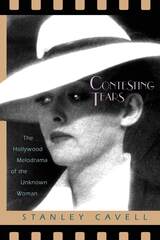 Contesting Tears: The Hollywood Melodrama of the Unknown Woman
Stanley Cavell
University of Chicago Press, 1996 What is marriage? Can a relationship dedicated to equality, friendship, and mutual education flower in an atmosphere of romance? What are the paths between loving another and knowing another? Stanley Cavell identified a genre of classic American films that engaged these questions in his study of comedies of remarriage, Pursuits of Happiness. With Contesting Tears, Cavell demonstrates that a contrasting genre, which he calls "the melodrama of the unknown woman," shares a surprising number and weave of concerns with those comedies.
Cavell provides close readings of four melodramas he finds definitive of the genre: Letter from an Unknown Woman, Gaslight, Now Voyager, and Stella Dallas. The women in these melodramas, like the women in the comedies, demand equality, shared education, and transfiguration, exemplifying for Cavell a moral perfectionism he identifies as Emersonian. But unlike the comedies, which portray a quest for a shared existence of expressiveness and joy, the melodramas trace instead the woman's recognition that in this quest she is isolated. Part of the melodrama concerns the various ways the men in the films (and the audiences of the films) interpret and desire to force the woman's consequent inaccessibility.
"Film is an interest of mine," Stanley Cavell has written, "or say a love, not separate from my interest in, or love of, philosophy." In Contesting Tears Cavell once again brilliantly unites his two loves, using detailed and perceptive musings on melodrama to reflect on philosophical problems of skepticism, psychoanalysis, and perfectionism. As he shows, the fascination and intelligence of such great stars as
Ingrid Bergman, Bette Davis, and Barbara Stanwyck illuminate, as they are illuminated by, the topics and events of these beloved and enduring films.
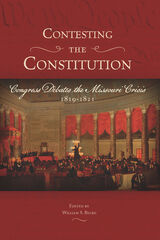 Contesting the Constitution: Congress Debates the Missouri Crisis, 1819-1821
William S. Belko
University of Missouri Press, 2021 The admission of Missouri to the Union quickly became a constitutional crisis of the first order, inciting an intensive reexamination of the U.S. Constitution by the U.S. Congress. The heart of the question in need of resolution was whether that body possessed the authority to place conditions on a territory—in this instance Missouri—regarding restrictions on slavery—before its admittance to the Union.
The larger question with which the legislators grappled were the limits of the Constitution’s provisions granting Congress the authority to affect the institution of slavery—both where it already existed and where it could expand. The issue—what would come to be known as the Missouri Crisis—severely tested the still young republic and, some four decades later, would all but rend it asunder. This timely collection of original essays thoughtfully engages the intersections of history and constitutional law, and is certain to find eager readers among historians, legal scholars, political scientists, as well as many who call Missouri home.
Contributing Authors:
William S. Belko
Christopher Childers
John Eastman
Brook Poston
John R. Van Atta
Contesting the Foreshore: Tourism, Society and Politics on the Coast
Edited by Jeremy Boissevain and Tom Selwyn
Amsterdam University Press, 2005 This collection of essays examines social, political, and economic relations in primarily European coastal locations through the lens of tourism. The contributors explore the intersecting interests of fishing, tourism, and development and the conflict among local communities and market forces, all of which are infused with the symbolism of the sea as a place of mystery and danger. From the tensions between Cornish villagers and city visitors to the explosion of resort development in Gran Canaria, the authors consider the relationship between local residents, businesses, and tourist newcomers as they vie for status, influence, and, ultimately, for space.
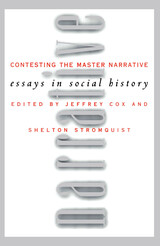 Contesting the Master Narrative: Essays In Social History
Jeffrey Cox
University of Iowa Press, 1998 Social historians today are calling into question the persuasiveness of the master narratives that have dominated our stories about the past. Motivated now by personal and professional commitments to solving problems by telling stories, not by epistemological and ontological certitude, social historians are constructing alternative narratives relevant to an expanded, more inclusive audience. The essays in this thoughtful volume reflect an explicit self-consciousness about historians' choices of narrative strategies, a new skepticism of the rhetorical strategies embedded in all scholarly arguments, and a recognition that every historian has a point of view.
Critically examining past master narratives in light of emerging alternatives, these essayists ask us to reevaluate the stories we tell, the narrative traditions within which they are situated, and the audiences they are designed to persuade. The first essays explore the gendered character of social history rhetoric by exposing alternative, feminist traditions of social scientific and social historical writing. The second section focuses on alternative narrative traditions of historical writing in non-European contexts, specifically India, Japan, and China. And the third group spotlights the rhetorical uses of synthesis in the writings of social historians.
The essays feature the range of narrative possibilities available to historians who have become self-critical about the pervasive use of unexamined master narratives; they show how limited that tradition can be compared with the diverse alternatives derived from, for example, gendered traditions of Latin American travel writers of the nineteenth century, Victorian women's historical writing, or the lively subaltern tradition in Indian social history. Together they argue not for the abandonment of historical materialism or the elimination of all master narratives but for the reinvigoration of social history through the use of new and more persuasive arguments based on alternative narratives.
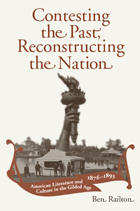 Contesting the Past, Reconstructing the Nation: American Literature and Culture in the Gilded Age, 1876-1893
Benjamin A. Railton
University of Alabama Press, 2007 Fables of American history embodied in Gilded Age literature
In this study of Gilded Age literature and culture, Ben Railton proposes that in the years after Reconstruction, America’s identity was often contested through distinct and competing conceptions of the nation’s history. He argues that the United States moved toward unifying and univocal historical narratives in the years between the Centennial and Columbian Expositions, that ongoing social conflict provided sites for complications of those narratives, and that works of historical literature offer some of the most revealing glimpses into the nature of those competing visions.
Gilded Age scholarship often connects the period to the 20th-century American future, but Railton argues that it is just as crucial to see how the era relates to the American past. He closely analyzes the 1876 and 1893 Expositions, finding that many of the period’s central trends, from technology to imperialism, were intimately connected to particular visions of the nation’s history. Railton’s concern is with four key social questions: race, Native Americans, women, and the South. He provides close readings of a number of texts for the ways they highlight these issues. He examines established classics (The Adventures of Huck Finn and The Bostonians); newer additions to the canon (The Conjure Woman, Life Among the Piutes, The Story of Avis); largely forgotten best-sellers (Uncle Remus, The Grandissimes); unrecovered gems (Ploughed Under, Where the Battle Was Fought); and autobiographical works by Douglass and Truth, poems by Harper and Piatt, and short stories by Woolson and Cook.
These readings, while illuminating the authors themselves, contribute to ongoing conversations over historical literature’s definition and value, and a greater understanding of not only American society in the Gilded Age, but also debates on our shared but contested history that remain very much alive in the present.
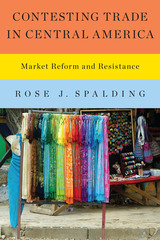 Contesting Trade in Central America: Market Reform and Resistance
By Rose J. Spalding
University of Texas Press, 2014 In 2004, the United States, five Central American countries, and the Dominican Republic signed the Central American Free Trade Agreement (CAFTA), signaling the region’s commitment to a neoliberal economic model. For many, however, neoliberalism had lost its luster as the new century dawned, and resistance movements began to gather force. Contesting Trade in Central America is the first book-length study of the debate over CAFTA, tracing the agreement’s drafting, its passage, and its aftermath across Central America. Rose J. Spalding draws on nearly two hundred interviews with representatives from government, business, civil society, and social movements to analyze the relationship between the advance of free market reform in Central America and the parallel rise of resistance movements. She views this dynamic through the lens of Karl Polanyi’s “double movement” theory, which posits that significant shifts toward market economics will trigger oppositional, self-protective social countermovements. Examining the negotiations, political dynamics, and agents involved in the passage of CAFTA in Costa Rica, El Salvador, and Nicaragua, Spalding argues that CAFTA served as a high-profile symbol against which Central American oppositions could rally. Ultimately, she writes, post-neoliberal reform “involves not just the design of appropriate policy mixes and sequences, but also the hard work of building sustainable and inclusive political coalitions, ones that prioritize the quality of social bonds over raw economic freedom.”
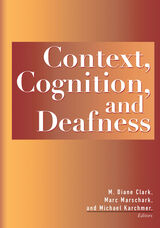 Context, Cognition, and Deafness
M. Diane Clark
Gallaudet University Press, 2001 In past studies of the effect of environment and social settings upon the cognitive development of deaf children, results frequently were confounded by conflicting conclusions related to the particpants' varying degrees of hearing loss. Context, Cognition, and Deafness: An Introduction takes an interdisciplinary approach that clarifies these disparate findings by analyzing many methodologies. Editors M. Diane Clark, Marc Marschark, and Michael Karchmer, widely respected scholars in their own right, have assembled work by a varying cast of renowned researchers to elucidate the effects of family, peers, and schools on deaf children.
To integrate the often contrasting approaches of clinical and cultural researchers, this sharply focused volume has called upon experts in anthropology, psychology, linguistics, basic visual sensory processes, education, cognition, and neurophysiology to share complementary observations. One of William C. Stokoe's last contributions, "Deafness, Cognition, and Language" leads fluidly into Jeffrey P. Praden's analysis of clinical assessments of deaf people's cognitive abilities. Margaret Wilson expands on the impace of sign language expertise on visual perception.
Context, Cognition, and Deafness also shows that theory can intersect practice, as displayed by editor Marschark and Jennifer Lukomski in their research on literacy, cognition, and education. Amy R. Lederberg and Patricia E. Spencer have combined sequential designs in their study of vocabulary learning. Ethan Remmel, Jeffrey G. Bettger, and Amy M. Weinberg explore the theory of mind development. The emotional development of deaf children also received detailed consideration by Colin D. Gray, Judith A. Hosie, Phil A. Russell, and Ellen A. Ormel. Kathryn P. Meadow-Orlans delineates her perspective on the coming of age of deaf children in relation to their education and development. Marschark concludes with insightful impressions on the future of theory and application, an appropriate close to this exceptional, coherent volume.
M. Diane Clark is Professor in the Department of Psychology at Shippensburg University in Shippensburg, PA.
Marc Marschark is Professor in the Department of Research at the National Technical Institute for the Deaf in Rochester, NY.
Michael Karchmer is Professor in the Department of Education Foundations and Research and Director of the Gallaudet Research Institute at Gallaudet University.
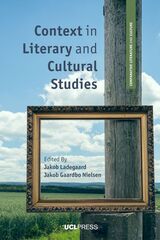 Context in Literary and Cultural Studies
Edited by Jakob Ladegaard and Jakob Gaardbo Nielsen
University College London, 2019 Context in Literary and Cultural Studies is an interdisciplinary volume that deals with the challenges of studying works of art and literature in their historical context today. The relationship between artworks and context has long been a central concern for aesthetic and cultural disciplines, and the question of context has been asked anew in all eras. Developments in contemporary culture and technology, as well as new theoretical and methodological orientations in the humanities, once again prompt us to rethink context in literary and cultural studies. This volume takes up that challenge.
Introducing readers to new developments in literary and cultural theory, Context in Literary and Cultural Studies connects all disciplines related to these areas to provide an interdisciplinary overview of the challenges different scholarly fields today meet in their studies of artworks in context. Spanning a number of countries and covering subjects from nineteenth-century novels to rave culture, the chapters together constitute an informed, diverse and wide-ranging discussion. The volume is written for scholarly readers at all levels in the fields of literary studies, comparative literature, cultural studies, art history, film, theater studies, and digital humanities.
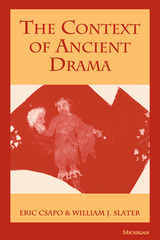 Context of Ancient Drama
Eric Csapo and William J. Slater
University of Michigan Press, 1995 Ancient theater has always caught contemporary interest, despite the eclectic nature of the surviving evidence. Tourists wander the remains of buildings at Epidauros and Athens, and generations of people have pondered Medea and Oedipus, yet it can be surprisingly difficult to find reliable, accessible information on these plays and their theaters. The Context of Ancient Drama remedies this situation. It provides, in modern English translation, documents that illustrate all aspects of the drama of antiquity, other than the text of the dramas themselves. For convenience the material is grouped in thematic sections, such as "music," or "judging." The illustrations give well-known examples of the kind of evidence that has survived to us. Plans of theaters are provided, to exemplify the outlines of the buildings' development, and an extensive glossary of terms offers information to the interested amateur and the theater specialist alike. The Context of Ancient Drama will be of interest to a wide spectrum of students and teachers. Theater historians, students of dramatic performance and the visual arts, and students and teachers in literature-in-translation courses will all find much that speaks to them.
The Context of Casuistry
James F. Keenan, SJ, and Thomas A. Shannon, Editors. Foreword by Albert R. Jonsen
Georgetown University Press, 1995
The Context of Self: A Phenomenological Inquiry Using Medicine as a Clue
Richard M. Zaner
Ohio University Press, 1981 This study takes up the challenge presented to philosophy in a dramatic and urgent way by contemporary medicine: the phenomenon of human life. Initiated by a critical appreciation of the work of Hans Jonas, who poses that issue as well, the inquiry is brought to focus on the phenomenon of embodiment, using relevant medical writing to help elicit its concrete dimensions. The explication of embodiment, aided by critical studies and inquiries into medical phenomena (autism, brain injury, terminal illness) make possible the development of the author’s original phenomenological theory of self, and its concrete relationships with the other self. This study attempts not only to show connections among the works of a number of thinkers in terms of central problems, but to demonstrate the mutual relevance of medicine and philosophy through concrete illustrations and analysis.
Context Providers: Conditions of Meaning in Media Arts
Margot Lovejoy, Christiane Paul, Victoria Vesna
Intellect Books, 2011 Context Providers explores the ways in which digital art and culture are challenging and changing the creative process and our ways of constructing meaning. The authors introduce the concept of artists as context providers—people who establish networks of information in a highly collaborative creative process, blurring boundaries between disciplines. Technological change has affected the function of art, the role of the artist, and the way artistic productions are shared, creating a need for flexible information filters as a framework for establishing meaning and identity. Context Providers considers the work of media artists today who are directly engaging the scientific community through collaboration, active dialogue, and creative work that challenges the scientific.
Contexts of Criticism
Harry Levin
Harvard University Press The essays forming this book by one of America's most astute critics in the field of comparative literature range from broad problems of critical theory and esthetic formulation to specific analyses of forms and texts, mainly prose but also poetry. Harry Levin has approached his subject from three different points of view: working definitions, historical and semantic attempts to define such central concepts of criticism as “classicism,” “realism,” and “tradition”; notations on novelists, reevaluations of Joyce, Proust, Balzac, Cervantes, Melville, and Hemingway; long views, discussion of such matters as the symbolic interpretation of literature, the development of literary criticism during the past century, and various European attitudes toward contemporary American writers.
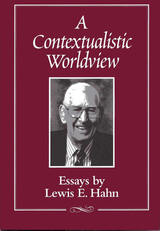 A Contextualistic Worldview: Essays by Lewis E. Hahn
Lewis E. Hahn
Southern Illinois University Press, 2001
This selection of articles by Lewis E. Hahn addresses the philosophical school of contextualism and four contemporary American philosophers: John Dewey, Henry Nelson Wieman, Stephen C. Pepper, and Brand Blanshard.
Stressing the relatively recent contextualistic worldview, which he considers one of the best world hypotheses, Hahn seeks to achieve a broad perspective within which all things may be given their due place. After providing a brief outline, Hahn explains contextualism in relation to other philosophies. In his opening chapter, as in later chapters, he expresses contextualism as a form of pragmatic naturalism. In spite of Hahn’s high regard for contextualism, however, he does not think it would be good if we were limited to a single worldview. “The more different views we have and the more different sources of possible light we have, the better our chances that some of these cosmic maps will shed light on our world and our place in it.”
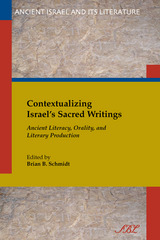 Contextualizing Israel's Sacred Writings: Ancient Literacy, Orality, and Literary Production
Brian B. Schmidt
SBL Press, 2015 An essential resource exploring orality and literacy in the pre-Hellenistic southern Levant and the Hebrew Bible
Situated historically between the invention of the alphabet, on the one hand, and the creation of ancient Israel's sacred writings, on the other, is the emergence of literary production in the ancient Levant. In this timely collection of essays by an international cadre of scholars, the dialectic between the oral and the written, the intersection of orality with literacy, and the advent of literary composition are each explored as a prelude to the emergence of biblical writing in ancient Israel. Contributors also examine a range of relevant topics including scripturalization, the compositional dimensions of orality and textuality as they engage biblical poetry, prophecy, and narrative along with their antecedents, and the ultimate autonomy of the written in early Israel. The contributors are James M. Bos, David M. Carr, André Lemaire, Robert D. Miller II, Nadav Na'aman, Raymond F. Person Jr., Frank H. Polak, Christopher A. Rollston, Seth L. Sanders, Joachim Schaper, Brian B. Schmidt, William M. Schniedewind, Elsie Stern, and Jessica Whisenant.
Features
- Addresses questions of literacy and scribal activity in the Levant and Negev
- Articles examine memory, oral tradition, and text criticism
- Discussion of the processes of scripturalization
A Continent Moving West?: EU Enlargement and Labour Migration from Central and Eastern Europe
Edited by Richard Black, Godfried Engbersen, Marek Okólski, and Cristina Pantîru
Amsterdam University Press, 2010
A Continent Moving West? argues that the conceptualization of migration as a one-way or long-term process is becoming increasingly wide of the mark. Rather, east-west labor migration in Europe, in common perhaps with other flows in and from other parts of the world, is diverse, fluid, and influenced by the dynamics of local and sector-specific labor markets and migration-related political regulations.
The papers in this book contribute to critical understanding of the east-west migration within the European Union after the 2004 enlargement, from the new to the old member states.
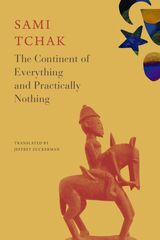 The Continent of Everything and Practically Nothing
Sami Tchak
Seagull Books, 2026 A Togolese novel that delivers a rich, intimate portrait of a scholar whose life is inextricably bound to Africa.
For French ethnologist Maurice Boyer, Africa is more than a place—it’s a dream, a puzzle, a mirror reflecting his desires and doubts. His years of fieldwork in Tèdi, Togo, where he lived among the Tem people and tried to illuminate their customs and rituals, marked him profoundly. Who was a friend and who was a foe? Which stories were true and which were illusions? As the years pass and the roles of Aurélie, his wife, and Safi, his former student, come into sharper view, Boyer finds himself wrestling not only with his own choices but with the legacy of knowledge itself.
In a novel framed as a profound postcolonial quest, Sami Tchak explores Africa’s rich, complex reality through this intimate story of a scholar wrestling with his own understanding of culture, knowledge, and history. The Continent of Everything and Practically Nothing grapples with whether assembling more data can truly capture the complexity of a continent, exposing how academic ambition, history, and emotion shape scholarship.
 Continental Conservation: Scientific Foundations Of Regional Reserve Networks
Edited by Michael E. Soulé and John Terborgh
Island Press, 1999 The Wildlands Project is a far-reaching effort by scientists and activists to develop better ways of protecting nature, wilderness, and biodiversity. Its ultimate goal is to establish an effective network of nature reserves throughout North America -- core conservation areas linked by corridors, and buffered, where appropriate, by lands that may also serve economic objectives. Continental Conservation represents the work of thirty leading experts-including Michael Soulé, John Terborgh, Reed Noss, Paul Paquet, Dan Simberloff, Rodolfo Dirzo, J. Michael Scott, Andrew Dobson, and others -- brought together by The Wildlands Project to examine the science underlying the design and management of these regional-scale networks. It provides conservationists and biologists with the latest scientific principles for protecting living nature at spatial scales that encompass entire regions and continents. Following an opening chapter that sets the stage by introducing major themes and the scientific and policy background, the contributors: - consider scale in the identification, selection, and design of biological reserves
- examine the role of top carnivores in regulating terrestrial ecosystems
- suggest the need for a paradigm shift in the field of ecological restoration
- consider the scientific details of implementing regional conservation in core areas, corridors, and in buffer zones
- discuss the need for megareserves and how to design them
The book ends by challenging the reader, whether scientist or advocate, to commit more time to the effort of saving nature. The authors argue that the very survival of nature is at stake, and scientists can no longer afford to stand behind a wall of austere objectivity. Continental Conservation is an important guidebook that can serve a vital role in helping fashion a radically honest, scientifically rigorous land-use agenda. It will be required reading for scientists and professionals at all levels involved with ecosystem and land management.
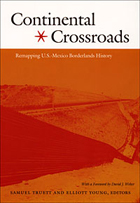 Continental Crossroads: Remapping U.S.-Mexico Borderlands History
Samuel Truett and Elliott Young, eds.
Duke University Press, 2004 Published in Cooperation with the William P. Clements Center for Southwest Studies, Southern Methodist University. The U.S.-Mexico borderlands have long supported a web of relationships that transcend the U.S. and Mexican nations. Yet national histories usually overlook these complex connections. Continental Crossroads rediscovers this forgotten terrain, laying the foundations for a new borderlands history at the crossroads of Chicano/a, Latin American, and U.S. history. Drawing on the historiographies and archives of both the U.S. and Mexico, the authors chronicle the transnational processes that bound both nations together between the early nineteenth century and the 1940s, the formative era of borderlands history. A new generation of borderlands historians examines a wide range of topics in frontier and post-frontier contexts. The contributors explore how ethnic, racial, and gender relations shifted as a former frontier became the borderlands. They look at the rise of new imagined communities and border literary traditions through the eyes of Mexicans, Anglo-Americans, and Indians, and recover transnational border narratives and experiences of African Americans, Chinese, and Europeans. They also show how surveillance and resistance in the borderlands inflected the “body politics” of gender, race, and nation. Native heroine Bárbara Gandiaga, Mexican traveler Ignacio Martínez, Kiowa warrior Sloping Hair, African American colonist William H. Ellis, Chinese merchant Lee Sing, and a diverse cast of politicos and subalterns, gendarmes and patrolmen, and insurrectos and exiles add transnational drama to the formerly divided worlds of Mexican and U.S. history. Contributors. Grace Peña Delgado, Karl Jacoby, Benjamin Johnson, Louise Pubols, Raúl Ramos, Andrés Reséndez, Bárbara O. Reyes, Alexandra Minna Stern, Samuel Truett, Elliott Young
 Continental Divide: Heidegger, Cassirer, Davos
Peter E. Gordon
Harvard University Press, 2010 In the spring of 1929, Martin Heidegger and Ernst Cassirer met for a public conversation in Davos, Switzerland. They were arguably the most important thinkers in Europe, and their exchange touched upon the most urgent questions in the history of philosophy: What is human finitude? What is objectivity? What is culture? What is truth?
Over the last eighty years the Davos encounter has acquired an allegorical significance, as if it marked an ultimate and irreparable rupture in twentieth-century Continental thought. Here, in a reconstruction at once historical and philosophical, Peter Gordon reexamines the conversation, its origins and its aftermath, resuscitating an event that has become entombed in its own mythology. Through a close and painstaking analysis, Gordon dissects the exchange itself to reveal that it was at core a philosophical disagreement over what it means to be human.
But Gordon also shows how the life and work of these two philosophers remained closely intertwined. Their disagreement can be understood only if we appreciate their common point of departure as thinkers of the German interwar crisis, an era of rebellion that touched all of the major philosophical movements of the day—life-philosophy, philosophical anthropology, neo-Kantianism, phenomenology, and existentialism. As Gordon explains, the Davos debate would continue to both inspire and provoke well after the two men had gone their separate ways. It remains, even today, a touchstone of philosophical memory.
This clear, riveting book will be of great interest not only to philosophers and to historians of philosophy but also to anyone interested in the great intellectual ferment of Europe’s interwar years.
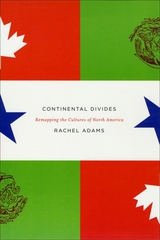 Continental Divides: Remapping the Cultures of North America
Rachel Adams
University of Chicago Press, 2009 North America is more a political and an economic invention than a place people call home. Nonetheless, the region shared by the United States and its closest neighbors, North America, is an intriguing frame for comparative American studies. Continental Divides is the first book to study the patterns of contact, exchange, conflict, and disavowal among cultures that span the borders of Canada, the United States, and Mexico. Rachel Adams considers a broad range of literary, filmic, and visual texts that exemplify cultural traffic across North American borders. She investigates how our understanding of key themes, genres, and periods within U.S. cultural study is deepened, and in some cases transformed, when Canada and Mexico enter the picture. How, for example, does the work of the iconic American writer Jack Kerouac read differently when his Franco-American origins and Mexican travels are taken into account? Or how would our conception of American modernism be altered if Mexico were positioned as a center of artistic and political activity? In this engaging analysis, Adams charts the lengthy and often unrecognized traditions of neighborly exchange, both hostile and amicable, that have left an imprint on North America’s varied cultures.
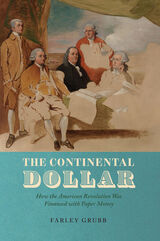 The Continental Dollar: How the American Revolution Was Financed with Paper Money
Farley Grubb
University of Chicago Press, 2023 An illuminating history of America’s original credit market.
The Continental Dollar is a revelatory history of how the fledgling United States paid for its first war. Farley Grubb upends the common telling of this story, in which the United States printed cross-colony money, called Continentals, to serve as an early fiat currency—a currency that is not tied to a commodity like gold, but rather to a legal authority. As Grubb details, the Continental was not a fiat currency, but a “zero-coupon bond”—a wholly different species of money. As bond payoffs were pushed into the future, the money’s value declined, killing the Continentals’ viability years before the Revolutionary War would officially end.
Drawing on decades of exhaustive mining of eighteenth-century records, The Continental Dollar is an essential origin story of the early American monetary system, promising to serve as the benchmark for critical work for decades to come.
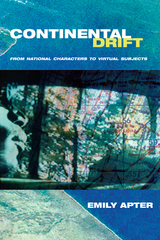 Continental Drift: From National Characters to Virtual Subjects
Emily Apter
University of Chicago Press, 1999 From xenophobic appropriations of Joan of Arc to Afro-futurism and cyberpunk, the "national" characters of the colonial era often seem to be dissolving into postnational and virtual subjects. In Continental Drift, Emily Apter deftly analyzes the French colonial and postcolonial experience as a case study in the erosion of belief in national destiny and the emergence of technologically mediated citizenship.
Among the many topics Apter explores are the fate of national literatures in an increasingly transnational literary climate; the volatile stakes of Albert Camus's life and reputation against the backdrop of Algerian civil strife; the use of literary and theatrical productions to "script" national character for the colonies; belly-dancing and aesthetic theory; and the impact of new media on colonial and postcolonial representation, from tourist photography to the videos of Digital Diaspora.
Continental Drift advances debates not just in postcolonial studies, but also in gender, identity, and cultural studies; ethnography; psychoanalysis; and performance studies.
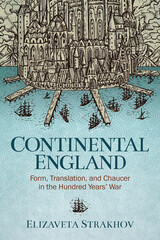 Continental England: Form, Translation, and Chaucer in the Hundred Years’ War
Elizaveta Strakhov
Ohio State University Press, 2022 Scholars have often viewed the Hundred Years’ War (c. 1337–1453) between England and France as sharpening animosity and isolationism. Further, medievalists have often characterized translator–source relationships as adversarial. In Continental England, Elizaveta Strakhov develops a new model, reparative translation, as a corrective to both formulations. Zeroing in on formes fixes poetry—and Chaucer as a leading practitioner—she shows that translation played two essential, interrelated roles: it became a channel for rebuilding fragmented communities, and it restored unity to Francophone cultural landscapes fractured by war. Further, used in particular to express England’s aspirational relationship to Francophone culture despite the ongoing war, translation became the means by which England negotiated a new vision of itself as Continental rather than self-contained. Chaucer’s own translation work and fusion of Francophone and Italian humanist influences in his poetry rendered him a paradigmatic figure for England’s new bid for Continental relevance. Interpreting Chaucer’s posthumous canonization as a direct result of reparative translation, Strakhov shows how England’s transition from island to Continental constituent problematizes our contemporary understandings of nation-bound authors and canons.
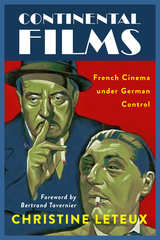 Continental Films: French Cinema under German Control
Christine Leteux
University of Wisconsin Press, 2022 From 1940 to 1944, the German-owned Continental Films dominated the French film landscape, producing thirty features throughout the Nazi occupation. Charged with producing entertaining and profitable films rather than propaganda, producer Alfred Greven employed some of the greatest French actors and most prestigious directors of the time, including Maurice Tourneur, Henri Decoin, Henri-Georges Clouzot, and Marcel Carné.
Using recently opened archival documents, including reams of testimony from the épuration (purification) hearings conducted shortly after the war, Christine Leteux has produced the most authoritative and complete history of the company and its impact on the French film industry—both during the war and after. She captures the wide range of responses to the firm from those who were eager to work for a company whose ideology matched their own, to others who reluctantly accepted contracts out of necessity, to those who abhorred the company but felt compelled to participate in order to protect family members from Nazi reprisals. She examines not only the formation and management of Continental Films but also the personalities involved, the fraught and often deadly political circumstances of the period, the critical reception of the films, and many of the more notorious and controversial events.
As Bertrand Tavernier explains in his foreword, Leteux overturns many of the preconceptions and clichés that have come to be associated with Continental Films. Published to rave reviews in French and translated by the author into English, this work shatters expectations and will reinvigorate study of a lesser-known but significant period of French film history.
 The Continental Model: Selected French Critical Essays of the Seventeenth Century in English Translation
Scott Elledge and Donald Schier, Editors
University of Minnesota Press, 1960 The Continental Model was first published in 1960. Minnesota Archive Editions uses digital technology to make long-unavailable books once again accessible, and are published unaltered from the original University of Minnesota Press editions. The pervasive influence of seventeenth-century French criticism upon eighteenth-century English criticism makes it important for students of English and comparative literature to be familiar with the most important of the French works. Professors Elledge and Schier bring together here, in translation, some of the best examples of the French essays. They have chosen particularly works that are not otherwise available in translation. Some of the translations are by contemporaries of the period. These are of works by d'Aubignac, Saint-Evremond, Huet, Rapin, Le Bossu, Bouhours, La Bruyere, and Fontenelle. Other selections have been translated by Professor Schier, and these include works of Chapelain, Sarasin, Scudery, Corneille, Bouhours, and Fontenelle. The editors provide brief and pertinent comment on each writer and his place in literary history. They have also annotated the essays in order to save time for the reader who encounters references to other literatures not immediately clear to him. The volume as a whole provides a comprehensive and balanced selection of critical texts which were known to, used by, and significant in their influence upon writers such as Dryden, Dennis, Addison, Swift, Pope, and others.
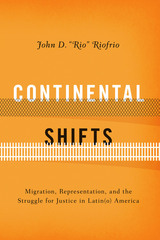 Continental Shifts: Migration, Representation, and the Struggle for Justice in Latin(o) America
By John D. "Rio" Riofrio
University of Texas Press, 2015 Applying a broad geographical approach to comparative Latino literary and cultural studies, Continental Shifts illuminates how the discursive treatment of Latinos changed dramatically following the enactment of NAFTA—a shift exacerbated by 9/11. While previous studies of immigrant representation have focused on single regions (the US/Mexico border in particular), specific genres (literature vs. political rhetoric), or individual groups, Continental Shifts unites these disparate discussions in a provocative, in-depth examination. Bringing together a wide range of groups and genres, this intercultural study explores novels by Latin American and Latino writers, a border film by Tommy Lee Jones and Guillermo Arriaga, “viral” videos of political speeches, popular television programming (particularly shows that feature incarceration and public shaming), and user-generated YouTube videos. These cultural products reveal the complexity of Latino representations in contemporary discourse. While tropes of Latino migrants as threatening, diseased foreign bodies date back to the nineteenth century, Continental Shifts marks the more pernicious, recent images of Latino laborers (legal and not) in a variety of contemporary media. Using vivid examples, John Riofrio demonstrates the connections between rhetorical and ideological violence and the physical and psychological violence that has more intensely plagued Latino communities in recent decades. Culminating with a consideration of the “American” identity, this eye-opening work ultimately probes the nation’s ongoing struggle to uphold democratic ideals amid dehumanizing multiethnic tension.
 Contingencies of Value: Alternative Perspectives for Critical Theory
Barbara H. Smith
Harvard University Press, 1988 Charges of abandoned standards issue from government offices; laments for the loss of the best that has been thought and said resound through university corridors. While revisionists are perplexed by questions of value, critical theory—haunted by the heresy of relativism—remains captive to classical formulas. Barbara Herrnstein Smith’s book confronts the conceptual problems and sociopolitical conflicts at the heart of these issues and raises their discussion to a new level of sophistication.
Polemical without being rancorous, Contingencies of Value mounts a powerful critique of traditional conceptions of value, taste, judgment, and justification. Through incisive discussions of works by, among others, David Hume, Immanuel Kant, Northrop Frye, Georges Bataille, Jacques Derrida, Richard Rorty, and Jürgen Habermas, Smith develops an illuminating alternative framework for the explanation of these topics.
All value, she argues, is radically contingent. Neither an objective property of things nor merely a subjective response to them, it is the variable effect of numerous interacting economies that is, systems of apportionment and circulation of “goods.” Aesthetic value, moral value, and the truth-value of judgments are no exceptions, though traditional critical theory, ethics, and philosophy of language have always tried to prove otherwise.
Smith deals in an original way with a wide variety of contemporary issues—from the relation between popular and high culture to the conflicting conception of human motives and actions in economic theory and classical humanism. In an important final chapter, she addresses directly the crucial problem of relativism and explains why a denial of the objectivity of value does not—as commonly feared and charged—produce either a fatuous egalitarianism or moral and political paralysis.
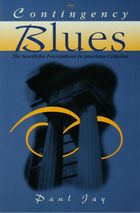 Contingency Blues: The Search For Foundations In American Criticism
Paul Jay
University of Wisconsin Press, 1997 From Emerson to Rorty, American criticism has grappled in one way or another with the problem of modernity—specifically, how to determine critical and cultural standards in a world where every position seems the product of an interpretation. Part intellectual history, part cultural critique, this provocative book is an effort to shake American thought out of the grip of the nineteenth century—and out of its contingency blues.
Paul Jay focuses his analysis on two strands of American criticism. The first, which includes Richard Poirier and Giles Gunn, has attempted to revive what Jay insists is an anachronistic pragmatism derived from Emerson, James, and Dewey. The second, represented most forcefully by Richard Rorty, tends to reduce American criticism to a metadiscourse about the contingent grounds of knowledge. In chapters on Emerson, Whitman, Santayana, Van Wyck Brooks, Dewey, and Kenneth Burke, Jay examines the historical roots of these two positions, which he argues are marked by recurrent attempts to reconcile transcendentalism and pragmatism. A forceful rejection of both kinds of revisionism, Contingency Blues locates an alternative in the work of the “border studies” critics, those who give our interest in contingency a new, more concrete form by taking a more historical, cultural, and anthropological approach to the invention of literature, subjectivity, community, and culture in a pan-American context.
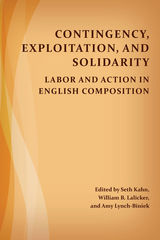 Contingency, Exploitation, and Solidarity: Labor and Action in English Composition
Seth Kahn
University Press of Colorado, 2017 Composition has been a microcosm of the corporatization of higher education for thirty years, with adjuncts often handling the hard work of writing instruction. We've learned enough to know that change is needed. Influenced by the efforts of organizations such as New Faculty Majority, Faculty Forward, PrecariCorps, and national faculty unions, this collection highlights action, describing efforts that have improved adjunct working conditions in English departments. The editors categorize these efforts into five threads: strategies for self-advocacy; organizing within and across ranks; professionalizing in complex contexts; working for local changes to workload, pay, and material conditions; and protecting gains. Contributors to this collection include contingent and tenure-line faculty from private, public, and community colleges, as well as writing program administrators and writing center faculty. Their voices address contingency, exploitation, and solidarity in activist terms deriving from institutional realities and cases. Collectively, they offer creative and constructive responses that can enact labor justice and champion the disciplinary energies of all members of our collegial community. Contributors: Janelle Adsit, Jacob Babb, Chris Blankenship, Rebekah Shultz Colby, Richard Colby, Anicca Cox, Sue Doe, Tracy Donhardt, Dawn Fels, Barbara Heifferon, Desirée M. Holter, Justin Jory, Jeffrey Klausman, Michelle LaFrance, Sarah Layden, Carol Lind, Maria Maisto, Amanda Martin, Mark McBeth, Tim McCormack, Joan Mullin, Dani Nier-Weber, Glenn Moomau, Michael Murphy, Anna K. Nardo, Rolf Norgaard, Courtney Adams Wooten, Lacey Wootton, Allison Laubach Wright
Contingency in Madagascar
Text by Stephen Muecke, Photographs by Max Pam
Intellect Books, 2012 As they set off for Madagascar in 2003, photographer Max Pam and writer Stephen Muecke adopted as their guiding principle the idea of contingency—central to which is the conscious embrace of risk and chance. In doing so, they established a new aesthetic in which image and text are inextricably linked to the notion of possibility. This stunning collection of photos and essays is the result of their vision, collectively illustrating the beauty and wisdom on offer in one of the world’s poorest nations. A contribution to the wave of new ethnography exemplified by Michael Taussig and Kathleen Stewart, these encounters with events, images, and experimental writing dramatize thoughts and feelings in the ongoing construction of place.
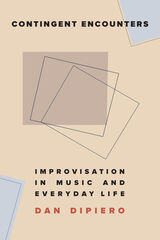 Contingent Encounters: Improvisation in Music and Everyday Life
Dan DiPiero
University of Michigan Press, 2022 Contingent Encounters offers a sustained comparative study of improvisation as it appears between music and everyday life. Drawing on work in musicology, cultural studies, and critical improvisation studies, as well as his own performing experience, Dan DiPiero argues that comparing improvisation across domains calls into question how improvisation is typically recognized. By comparing the music of Eric Dolphy, Norwegian free improvisers, Mr. K, and the Ingrid Laubrock/Kris Davis duo with improvised activities in everyday life (such as walking, baking, working, and listening), DiPiero concludes that improvisation appears as a function of any encounter between subjects, objects, and environments. Bringing contingency into conversation with the utopian strain of critical improvisation studies, DiPiero shows how particular social investments cause improvisation to be associated with relative freedom, risk-taking, and unpredictability in both scholarship and public discourse. Taking seriously the claim that improvisation is the same thing as living, Contingent Encounters overturns long-standing assumptions about the aesthetic and political implications of this notoriously slippery term.
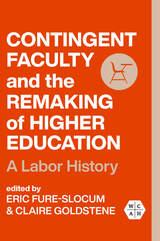 Contingent Faculty and the Remaking of Higher Education: A Labor History
Edited by Eric Fure-Slocum and Claire Goldstene
University of Illinois Press, 2024 An educational crisis from its origins to present-day experiences In the United States today, almost three-quarters of the people teaching in two- and four-year colleges and universities work as contingent faculty. They share the hardships endemic in the gig economy: lack of job security and health care, professional disrespect, and poverty wages that require them to juggle multiple jobs. This collection draws on a wide range of perspectives to examine the realities of the contingent faculty system through the lens of labor history. Essayists investigate structural changes that have caused the use of contingent faculty to skyrocket and illuminate how precarity shapes day-to-day experiences in the academic workplace. Other essays delve into the ways contingent faculty engage in collective action and other means to resist austerity measures, improve their working conditions, and instigate reforms in higher education. By challenging contingency, this volume issues a clear call to reclaim higher education’s public purpose. Interdisciplinary in approach and multifaceted in perspective, Contingent Faculty and the Remaking of Higher Education surveys the adjunct system and its costs. Contributors: Gwendolyn Alker, Diane Angell, Joe Berry, Sue Doe, Eric Fure-Slocum, Claire Goldstene, Trevor Griffey, Erin Hatton, William A. Herbert, Elizabeth Hohl, Miguel Juárez, Aimee Loiselle, Maria C. Maisto, Anne McLeer, Steven Parfitt, Jiyoon Park, Claire Raymond, Gary Rhoades, Jeff Schuhrke, Elizabeth Tandy Shermer, Steven Shulman, Joseph van der Naald, Anne Wiegard, Naomi R Williams, and Helena Worthen
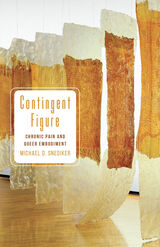 Contingent Figure: Chronic Pain and Queer Embodiment
Michael D. Snediker
University of Minnesota Press, 2021 A masterful synthesis of literary readings and poetic reflections, making profound contributions to our understanding of chronic pain At the intersection of queer theory and disability studies, acclaimed theorist Michael D. Snediker locates something unexpected: chronic pain. Starting from this paradigm-shifting insight, Snediker elaborates a bracing examination of the phenomenological peculiarity of disability, articulating a complex idiom of figuration as the lived substance of pain’s quotidian. This lexicon helps us differently inhabit both the theoretical and phenomenal dimensions of chronic pain and suffering by illuminating where these modes are least distinguishable. Suffused with fastidious close readings, and girded by a remarkably complex understanding of phenomenal experience, Contingent Figure resides in the overlap between literary theory and lyric experiment. Snediker grounds his exploration of disability and chronic pain in dazzling close readings of Herman Melville, Emily Dickinson, Henry James, and many others. Its juxtaposition of these readings with candid autobiographical accounts makes Contingent Figure an exemplary instance of literary theory as a practice of lyric attention. Thoroughly rigorous and anything but predictable, this stirring inquiry leaves the reader with a rich critical vocabulary indebted to the likes of Maurice Blanchot, Gilles Deleuze, D. O. Winnicott, and Eve Kosofsky Sedgwick. A master class in close reading’s inseparability from the urgency of lived experience, this book is essential for students and scholars of disability studies, queer theory, formalism, aesthetics, and the radical challenge of Emersonian poetics across the long American nineteenth century.
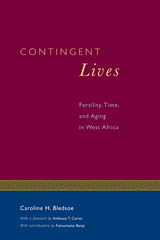 Contingent Lives: Fertility, Time, and Aging in West Africa
Caroline H. Bledsoe
University of Chicago Press, 2002 Most women in the West use contraceptives in order to avoid having children. But in rural Gambia and other parts of sub-Saharan Africa, many women use contraceptives for the opposite reason—to have as many children as possible.
Using ethnographic and demographic data from a three-year study in rural Gambia, Contingent Lives explains this seemingly counterintuitive fact by juxtaposing two very different understandings of the life course: one is a linear, Western model that equates aging and the ability to reproduce with the passage of time, the other a Gambian model that views aging as contingent on the cumulative physical, social, and spiritual hardships of personal history, especially obstetric trauma. Viewing each of these two models from the perspective of the other, Caroline Bledsoe produces fresh understandings of the classical anthropological subjects of reproduction, time, and aging as culturally shaped within women's conjugal lives. Her insights will be welcomed by scholars of anthropology and demography as well as by those working in public health, development studies, gerontology, and the history of medicine.
 Contingent Loyalties: State Agents in the Yunnan Borderlands (1856-1911)
Diana Zhidan Duan
Amsterdam University Press, 2024 From the mid-nineteenth-century Hui rebellions, which challenged centralised state control, to the early-twentieth-century revolutions, which led to Yunnan’s decades-long independence, local actors shaped the history of Yunnan through their extensive cross-border networks and contradictory roles in the attempted state consolidation of this contested area. Among the local elites, the state agents, both Han and non-Han, acted on behalf of the state in the borderlands’ affairs while seeking the balance between the interests of the state and their own communities. The state agents competed with each other while utilising and wrestling with the state authorities. The dynamic relationship between the state and local actors created another contested facet of modern Yunnan’s transformation. Competing narratives emerged when local actors negotiated and reconstructed their status within the contemporary Chinese nation-state. Bandits became heroes; separatists became patriots; a vibrant regional center became an isolated, exotic, and marginal province of the People’s Republic of China.
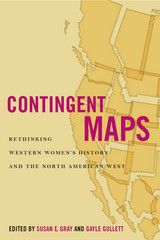 Contingent Maps: Rethinking Western Women's History and the North American West
Edited by Susan E. Gray and Gayle Gullett
University of Arizona Press, 2014 Contingent Maps is an appeal to all who read, write, and care about the history of women in the North American West. Susan E. Gray and Gayle Gullett, former co-editors of Frontiers: A Journal of Women Studies, argue that the discipline of Western women’s history, despite its many years of accomplishment, remains “the stepsister to both U.S. women’s history and the New Western history.” The problem, they assert, is one of place. Western women’s history remains unhappily chained to one place, Frederick Jackson Turner’s mythical frontier, where white civilization vanquished Indigenous savagery. Drawing on the work of feminist geographers, Gray and Gullett contend that the West is better understood as a place of many places.
Contingent Maps demonstrates how employing place as an analytical tool transforms Western women’s history. Gray and Gullett depict place as not only a physical location but as a way of understanding, as the spatial configuration of power relations that are always in flux. As a place and many places, the West is therefore always being constructed. All maps are contingent, as Gray and Gullett’s reading of the articles in this collection attest. Contingent Maps offers histories of Wests ranging from the nineteenth century to the near present. This synthesis of feminist history and geography has the potential to revitalize the field of Western women’s history.
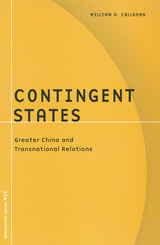 Contingent States: Greater China And Transnational Relations
William A. Callahan
University of Minnesota Press, 2004 In the 1990s, Greater China became the subject of debate as the site of either the danger of the “China threat” or the promise of Confucian capitalism. William A. Callahan argues that Greater China presents challenges not only to economic and political order but also to international relations theory. In fact, Greater China, though absent from geopolitical maps and international law, is very much present in economic and cultural exchange and exemplifies the contingent state of international politics. Callahan deconstructs the mainstream geopolitical and political-economic understandings of Greater China, tracing its emergence through an ethnographic analysis of four political “problems” in East Asia: the South China Sea disputes, Sino-Korean relations, the return of Hong Kong, and cross-straits relations. Callahan shows how bureaucrats, outlaws, tycoons, academics, workers, politicians, and hooligans alike produce Greater China through networks of relations in local, national, regional, global, and transnational space. Finally, Contingent States reveals how each of the “problems” provoked theoretical innovations that depart from standard conceptions of sovereignty, democracy, and the nation-state.William A. Callahan is senior lecturer of international politics and deputy director of the Center for Contemporary Chinese Studies at the University of Durham, England, and the author of Imagining Democracy: Reading “The Events of May” in Thailand and Pollwatching, Elections, and Civil Society in Southeast Asia.
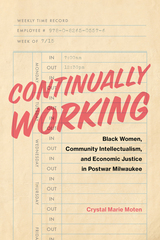 Continually Working: Black Women, Community Intellectualism, and Economic Justice in Postwar Milwaukee
Crystal Marie Moten
Vanderbilt University Press, 2023 Continually Working tells the stories of Black working women who resisted employment inequality in Milwaukee, Wisconsin, from the 1940s to the 1970s. The book explores the job-related activism of Black Midwestern working women and uncovers the political and intellectual strategies they used to critique and resist employment discrimination, dismantle unjust structures, and transform their lives and the lives of those in their community.
Moten emphasizes the ways in which Black women transformed the urban landscape by simultaneously occupying spaces from which they had been historically excluded and creating their own spaces. Black women refused to be marginalized within the historically white and middle‑class Milwaukee Young Women's Christian Association (MYWCA), an association whose mission centered on supporting women in urban areas. Black women forged interracial relationships within this organization and made it, not without much conflict and struggle, one of the most socially progressive organizations in the city. When Black women could not integrate historically white institutions, they created their own. They established financial and educational institutions, such as Pressley School of Beauty Culture, which beautician Mattie Pressley DeWese opened in 1946 as a result of segregation in the beauty training industry. This school served economic, educational, and community development purposes as well as created economic opportunities for Black women. Historically and contemporarily, Milwaukee has been and is still known as one of the most segregated cities in the nation. Black women have always contested urban inequality, by making space for themselves and others on the margins. In so doing, they have transformed both the urban landscape and urban history.
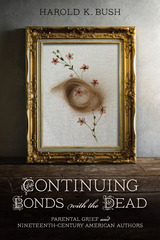 Continuing Bonds with the Dead: Parental Grief and Nineteenth-Century American Authors
Harold K. Bush
University of Alabama Press, 2016 Harold K. Bush's Continuing Bonds with the Dead examines the profound transfiguration that the death of a child wrought on the literary work of nineteenth-century American writers. Taking as his subjects Harriet Beecher Stowe, Abraham Lincoln, William Dean Howells, Mark Twain, and W. E. B. Du Bois, Bush demonstrates how the death of a child became the defining "before-and-after moment" in their lives as adults and as artists. In narrating their struggles, Bush maps the intense field of creative energy induced by reverberating waves of parental grief and the larger nineteenth-century culture of mortality and grieving. Bush explores in detail how each of these five writers grappled with and were altered by the loss of a child. He writes, for example, with moving insights about how the famed author of Adventures of Huckleberry Finn found himself adrift on a river of grief when meningitis struck down his daughter, Susy. In his deeply learned exploration of Twain's subsequent work, Bush illuminates how Twain wrote to cope with Susy's death, to make sense of her persistent presence in his life, and possibly to redeem her loss. Passionate and personal, Bush's insightful prose traces the paths of personal transformation each of these emblematic American writers took in order to survive the spiritual trauma of loss. The savage Civil War was America's shared "before and after moment," the pivot upon which the nation's future swung. Bush's account of these five writers' grief amplifies our understanding of America's evolving, national relationship to mourning from then to the present.
Continuing Care in a Community Hospital
Harold N. Willard and Stanislav V. Kasl
Harvard University Press, 1972 In this report on one of the first continuing care departments in the country, Dr. Harold Willard describes how he set up and directed a program in Thayer Hospital, Waterville, Maine, to provide the personnel and services necessary for improved care of patients with chronic illnesses. The community hospital, he maintains, must be the center for developing methods for health maintenance and care of the chronically ill. Two chapters by Dr. Stanislav Kasl provide a theoretical background for continuing care and discuss the importance of information from the behavioral sciences in the development and operation of continuing care programs.
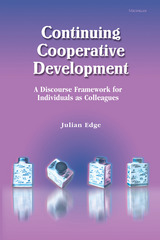 Continuing Cooperative Development: A Discourse Framework for Individuals as Colleagues
Julian Edge
University of Michigan Press, 2002 In Continuing Cooperative Development, a series of guided tasks helps the reader acquire specific skills of listening and responding that, in turn, help a speaker to express and articulate thoughts and plans that lie just beyond what they knew that they knew.
By adopting a certain style of speaking and listening to colleagues for agreed periods of time, motivated professionals can take individual control of their own development and increase the feeling of collegiality in their workplace. Continuing Cooperative Development draws on Edge's experience of more than ten years using this framework worldwide and provides authentic examples to guide the reader. This interactive framework is demonstrated in the book as part of a reflective teaching approach in response to everyday classroom problems, and also as part of a more formal, action-research approach to the formulation of local educational theory.
The key theme of this book is the power of non-judgmental discourse to facilitate the development of ideas and action, accessing both cognitive and emotional intelligence. The transcribed and interpreted data of authentic interactions from the Americas, Europe, and Asia serve as evidence for the argument and as guidelines for implementation.
The work is set in the field of TESOL, although its relevance reaches across discipline boundaries. The teachers featured in the book have duties ranging from the instruction of young learners to the supervision of doctoral research. The common denominator is that these people are motivated educators, committed to extending their own understanding and developing their own style of being an aware professional.
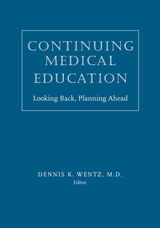 Continuing Medical Education: Looking Back, Planning Ahead
Edited by Dennis K. Wentz
Dartmouth College Press, 2011 Continuing medical education (CME) is a mainstay for ongoing learning by practicing physicians. Often considered the third and final phase of medical education, CME differs significantly from earlier phases of training. Unlike medical school and residency/fellowship, CME requires physicians to respond voluntarily to their educational needs; there is no specified curriculum, and practice settings are all different. The essays in this volume tell the history and evolution of CME in the United States and Canada, but also look toward future issues and developments. Contributors from a diverse array of institutions explore CME’s emergence from undergraduate medical education and its separate growth and development, key events and breakthroughs, lessons learned, conflicts, and predictions about the future in their area of expertise. Addressing critical issues, such as industry support for CME, the volume offers a vital tool for continuing medical education professionals, physicians, administrators, and all health care practitioners interested in the future of continuous education and quality patient care.
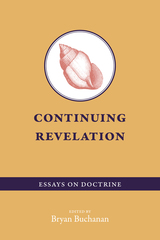 Continuing Revelation: Essays on Doctrine
Bryan Buchanan
Signature Books, 2021 Determining what is and what is not Mormon doctrine is a difficult endeavor. The Church of Jesus Christ of Latter-day Saints embraces four books of scripture as its canon, but also believes the church is led by a living prophet. Additions to the canon have been rare since the death of church founder Joseph Smith. Joseph Fielding Smith, tenth church president, said that if the prophet ever contradicts canon, canon prevails. On the other hand, Ezra Taft Benson, the church’s thirteenth president, said that the living prophet’s words are more important than cannon. Such messages create no shortage of confusion among church members. The question “What is doctrine?” opens the door for theologians and historians to wrestle over the answer, and to do so thoughtfully and insightfully. In Continuing Revelation, editor Bryan Buchanan has compiled essays that seek greater understanding about what doctrine is and why it matters. The Challenge of Defining LDS Doctrine, by Loyd Isao Ericson • LDS Theology and the Omnis: The Dangers of Theological Speculation, by David H. Bailey • Crawling out of the Primordial Soup: A Step toward the Emergence of an LDS Theology Compatible with Organic Evolution, by Steven L. Peck • “To Destroy the Agency of Man”: The War in Heaven in LDS Thought, by Boyd Petersen • Three Sub-Degrees in the Celestial Kingdom?, by Shannon P. Flynn • Heavenly Mother: The Mother of All Women, by Blaire Ostler • Mormonism and the Problem of Heterodoxy, by Kelli D. Potter • Women at the Gates of Mortality: Relief Society Birth and Death Rituals, by Susanna Morrill • “Shake Off the Dust of Thy Feet”: The Rise and Fall of Mormon Ritual Cursing, by Samuel R. Weber • “Satan Mourns Naked Upon the Earth: Locating Mormon Possession and Exorcism Rituals in the American Religious Landscape, 1830–1977, by Stephen C. Taysom
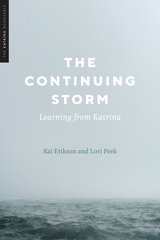 The Continuing Storm: Learning from Katrina
Kai Erikson and Lori Peek
University of Texas Press, 2022 More than fifteen years later, Hurricane Katrina maintains a strong grip on the American imagination. The reason is not simply that Katrina was an event of enormous scale, although it certainly was by any measure one of the most damaging storms in American history. But, quite apart from its lethality and destructiveness, Katrina retains a place in living memory because it is one of the most telling disasters in our recent national experience, revealing important truths about our society and ourselves. The final volume in the award-winning Katrina Bookshelf series The Continuing Storm reflects upon what we have learned about Katrina and about America. Kai Erikson and Lori Peek expand our view of the disaster by assessing its ongoing impact on individual lives and across the wide-ranging geographies where displaced New Orleanians landed after the storm. Such an expanded view, the authors argue, is critical for understanding the human costs of catastrophe across time and space. Concluding with a broader examination of disasters in the years since Katrina—including COVID-19—The Continuing Storm is a sobering meditation on the duration of a catastrophe that continues to exact steep costs in human suffering.
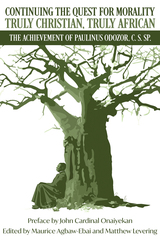 Continuing the Quest for Morality Truly Christian, Truly African: The Achievement of Paulinus Odozor, C,S,Sp.
Maurice Ashley Agbaw-Ebai
St. Augustine's Press, 2025 Paulinus Ikechukwu Odozor is among the preeminent moral theologians of our time. He has reached the pinnacle of his profession after serving more than two decades as a professor of theology at the University of Notre Dame. Among African theologians, he stands at the forefront of the generation that came of age in the early postconciliar period. Fr. Odozor’s work in Morality Truly Christian, Truly African: Foundational, Methodological, and Theological Considerations (2014) has become a classic in the field of Catholic moral theology. His contribution to reuniting moral theology to dogmatics is a key element to processing the contention in theological scholarship in the wake of Vatican II and the shifting of the socio-economic global landscape. Understanding the influence of theologians such as Richard McCormick, Charles Curran, and Edward Schillebeeckx, Fr. Odozor, he is unable to ignore the work of John Paul II, Joseph Ratzinger, Joseph Boyle, and John Cavadini as essential to the age of renewal in the field of moral theology. The essays in this volume highlight the fruits of Fr. Odozor's ability to move between the spheres of moral and dogmatic theology, and his particular treatment of the nature of God, ecclesiology, and interreligious dialogue. He is a theologian who is rightly positioned within a postconciliar moral theological context, and his thought is critical as we enter a new era in the Church that no longer takes Vatican II as its reference point––that is, the Church is reorienting toward the future, in continuity but seeking to discern what lies ahead. Claiming postconciliar theologians shared basic agreement regarding the mission of the Church, within the foggy contention among pre- and postconciliar moral theologians Odozor sees a legitimate albeit complex connection. Fr. Odozor's appreciation for Humanae Vitae and Veritatis Splendor is clear, and his fidelity to seeing issues like contraception as a "God question" and representing the concerns and voices of Africa make him an indispensable leader of the Church in this field of study. His mission to "bring Africa to the University of Notre Dame, and Notre Dame to Africa," has been more successful than former dean John Cavadini expected: African theology is no longer separated from the wider world thanks to this partnership and Fr. Odozor's acumen to establish moral theology's stature in the wider field. Contributions include: Maurice Agbaw-Ebai, "Ratzinger's Theological Anthropology in Conversation with Aspects of Paulinus Odozor's Understanding of the Human Person in Christ"; Raymond Olusesan Aina, MSP, "Paulinus Ikechukwu Odozor’s Unfinished Quest for a Truly African and Christian Moral Theology of Marriage"; Anthony Akinwale, OP, "Politics, the Common Good and Holiness"; Melanie Susan Barrett, "Aquinas, Balthasar, and African Tradition: Christian Conversion of Individuals and Cultures"; Jana M. Bennett, "The Importance of Anamnesis for Moral Life"; John Berkman, "Abominations and Absolute Prohibitions: Killing the Innocent According to Anscombe and Odozor"; John C. Cavadini, "African Theology and a Classical Theory of Inculturation"; David A. Clairmont, "Catholic Comparative Theological Ethics: Elements of an Approach to Tradition, Ethics, and Dialogue (with Odozor and Clooney, in the Church)"; David Elliot, "The Legacy of the African Church Fathers to St. Thomas Aquinas’ Account of Virtue Growth and Spiritual Practice"; Dennis Kasule, "Facing Up to the Challenge of Moral Formation in African Catechumenates Today: Drawing on African Catechumenates of the Past and Paulinus Odozor’s Seven Guidelines for Inculteration"; Matthew Levering, "Natural Law in Bénézet Bujo, Paulinus Odozor, and Stephen L. Brock"; Tegha Afuhwi Nji, "Paulinus Odozor and Joseph Ratzinger on the Question of Moral Objectivity: A Morality Truly African and Truly Christian?"; Emmanuel Ojeifo, "African and Christian: Black Sanctity and the Future of African Catholicism"; Bede Ukwuije, C.S.Sp., "Trinitarian Conception of God as Basis for an African Christian Ethics"; Paulinus Odozor, C.S.Sp., "Continuing the Quest for a Morality Truly Christian and African."
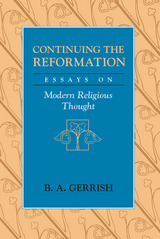 Continuing the Reformation: Essays on Modern Religious Thought
B. A. Gerrish
University of Chicago Press, 1993 Modern Christian religious thought, B. A. Gerrish argues, has constantly revised the inherited faith. In these twelve essays, written or published in the 1980s, one of the most distinguished historical theologians of our time examines the changes that occurred as the Catholic tradition gave way to the Reformation and an interest in the phenomenon of believing replaced adherence to unchanging dogma.
Gerrish devotes three essays to each of four topics: Martin Luther and the Reformation; religious belief and the Age of Reason; Friedrich Schleiermacher and the renewal of Protestant theology; and Schleiermacher's disciple Ernst Troeltsch, for whom the theological task was to give a rigorous account of the faith prevailing in a particular religious community at a particular time. Gerrish shows how faith itself has become a primary object of inquiry, not only in the newly emerging philosophy of religion but also in a new style of church theology which no longer assumes that faith rests on immutable dogmas. For Gerrish, the new theology of Protestant liberalism takes for its primary object of inquiry the changing forms of the religious life. This important book will interest scholars of systematic Christian theology, modern intellectual and cultural history, and the history and philosophy of religion.
Continuities in Popular Culture: The Present in the Past and the Past in the Present and Future
Edited by Ray B. Brown and Ronald J. Ambrosetti
University of Wisconsin Press, 1993 The humanities are the strongest dynamic that runs from the past into the future. Throughout history, except for the past one hundred fifty years, the strongest element in the humanities has been the culture of the folk. Now it is the everyday culture of a democratic society—popular culture, a key to people’s understanding themselves and their society. These sixteen essays by leading popular culture scholars demonstrate how elements in our everyday life flourished in the past, came to flower today, and will continue to shape us in the future.
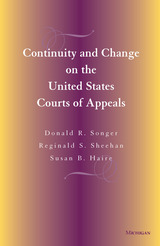 Continuity and Change on the United States Courts of Appeals
Donald R. Songer, Reginald S. Sheehan, and Susan B. Haire
University of Michigan Press, 2000 While many fine works of scholarship examine the role of the Supreme Court in American politics, there has been a dearth of scholarly books that focus on the Courts of Appeals. Continuity and Change on the United States Courts of Appeals is unique both in its focus on this level of the judiciary and its approach that examines major trends over the twentieth century. Since the Supreme Court has the discretion to refuse to hear almost all cases appealed to it, the Courts of Appeals are usually the final option for litigants in the federal system. Unless overturned by the Supreme Court or, in cases decided on the basis of statute, by Congressional action, the rulings can have a significant impact on government policy.
The authors present the first comprehensive examination of the shifting role of the Courts of Appeals, investigating changes over time and presenting the first systematic analyses of those changes. Their work is the first book to utilize the database of the U.S. Courts of Appeals, analyzing over 15,000 cases to examine trends between 1925 and 1988. The book answers questions such as who are the judges? What are their decisional tendencies? What has been the role of region and partisan politics? Who are the litigants? And who has won and who has lost throughout the twentieth century? It is the only current, up-to-date book on the Courts of Appeals and an essential read for all scholars and students interested in American politics and judicial behavior.
Donald R. Songer is Professor of Political Science, University of South Carolina. Reginald S. Sheehan is Associate Professor of Political Science and Director of the Program for Law and Juridical Politics, Michigan State University. Susan B. Haire is Assistant Professor of Political Science, University of Georgia
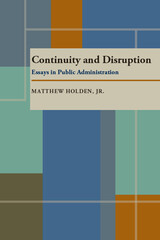 Continuity and Disruption: Essays in Public Administration
Matthew Holden Jr.
University of Pittsburgh Press, 1996 • Choice 1997 Outstanding Academic Book • Winner of the National Conference of Black Political Scientists 1997 Outstanding Book Award
Through thoughtful essays linking historical concepts, current issues, and areas for future research, Matthew Holden, Jr., argues that the study of public administration is indispensable to understanding politics. Essentially, public administration consists of making decisions about information, money, and force-three crucial sources of power: politics and administration cannot be separated, and no political system can be sustained when its administrative core collapses.
Holden explores issues in administration as reflected in political theory and discusses the specifics of organization, bureaucratic, and management theory. He considers such concepts as executive leadership and the emergence of administrative law and turns an unblinking eye on the practice of public administration today, buffeted by changes in communications technology and by ethnic diversity.
 Continuity in History and Other Essays
Alexander Gerschenkron
Harvard University Press This collection of essays by Alexander Gerschenkron, who has been called “the doyen of economic history in the United States,” is a companion volume to the author’s highly acclaimed Economic Backwardness in Historical Perspective. The essays range over a wide variety of subjects, but the major theme, as in Gerschenkron’s previous book, is the conditions of industrial development, particularly in regard to nineteenth-century Europe.
The book is divided into three parts. In Part I, Methodology, the essays are: “On the Concept of Continuity in History,” “Some Methodological Problems in Economic History,” and “Reflections on Ideology as a Methodological and Historical Problem.” Part II, Problems in Economic History, deals with “The Typology of Industrial Development as a Tool of Analysis,” “The Industrial Development of Italy: A Debate with Rosario Romeo,” “The Modernization of Entrepreneurship,” “Russia: Agrarian Policies and Industrialization, 1861–1914,” and “City Economies Then and Now.” In Part III, The Political Framework, the essays are: “Reflections on the Economic Aspects of Revolution,” “The Changeability of a Dictatorship,” and “The Stability of Dictatorships.” A series of appendices presents reviews and review articles by Gerschenkron.
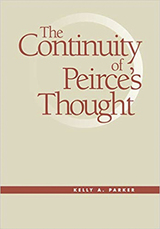 The Continuity of Peirce's Thought
Kelly A. Parker
Vanderbilt University Press, 1998 A comprehensive and systematic reconstruction of the philosophy of Charles S. Peirce, perhaps America's most far-ranging and original philosopher, which reveals the unity of his complex and influential body of thought. We are still in the early stages of understanding the thought of C. S. Peirce (1839-1914). Although much good work has been done in isolated areas, relatively little considers the Peircean system as a whole. Peirce made it his life's work to construct a scientifically sophisticated and logically rigorous philosophical system, culminating in a realist epistemology and a metaphysical theory ("synechism") that postulates the connectedness of all things in a universal evolutionary process. In The Continuity of Peirce's Thought, Kelly Parker shows how the principle of continuity functions in phenomenology and semeiotics, the two most novel and important of Peirce's philosophical sciences, which mediate between mathematics and metaphysics. Parker argues that Peirce's concept of continuity is the central organizing theme of the entire Peircean philosophical corpus. He explains how Peirce's unique conception of the mathematical continuum shapes the broad sweep of his thought, extending from mathematics to metaphysics and in religion. He thus provides a convenient and useful overview of Peirce's philosophical system, situating it within the history of ideas and mapping interconnections among the diverse areas of Peirce's work. This challenging yet helpful book adopts an innovative approach to achieve the ambitious goal of more fully understanding the interrelationship of all the elements in the entire corpus of Peirce's writings. Given Peirce's importance in fields ranging from philosophy to mathematics to literary and cultural studies, this new book should appeal to all who seek a fuller, unified understanding of the career and overarching contributions of Peirce, one of the key figures in the American philosophical tradition.
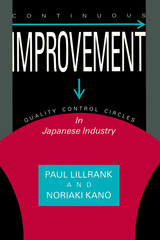 Continuous Improvement: Quality Control Circles in Japanese Industry
Paul Lillrank; Noriaki Kano
University of Michigan Press, 1989 Quality Control Circles (QCCs) are small groups of workers from the same workshop, which meet, often on their own time, to discuss ways to improve the quality of their work. They are supported by management; the circles and the support structure together are called Quality Control Circle (QCC) activity. The phenomenon is widespread in Japan: as of December 1987, 264,899 circles had been registered with more than two million members. QCC activities have spread to more than fifty countries worldwide and can be considered the most famous Japanese organizational innovation to date. The Japanese QCC, in its contribution to business application and theory, may rival the discovery of the informal organization of Hawthorne Studies frame. The Japanese QCC movement has achieved quite impressive results, which are well described in the Japanese-language literature. Of concern, however, is what sustains and causes the phenomenon. The existing literature is quite thin on these mechanisms and forces. Our aim in this research is to develop a systematic model of the organizational nature and management of Japanese QCC activities. Quality engineering and group dynamics are not part of this study; the focus is on the supporting arrangements, not on what happens within a circle. [1]
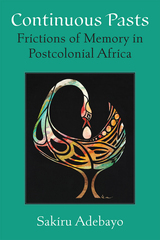 Continuous Pasts: Frictions of Memory in Postcolonial Africa
Sakiru Adebayo
University of Michigan Press, 2023 In Continuous Pasts, author Sakiru Adebayo claims that the post-conflict fiction of memory in Africa depicts the intricate ways in which the past is etched on bodies and topographies, resonant in silences and memorials, and continuous even in experiences as well as structures of migration. Adebayo argues that the post-conflict fiction of memory in Africa invites critical deliberations on the continuity of the past within the realm of positionality and the domain of subjectivity—that is to say, the past is not merely present; instead, it survives, lives on, and is mediated through the subject positions of victims, perpetrators, as well as secondary and transgenerational witnesses. The book also argues that post-conflict fiction of memory in Africa shows the unfinished business of the past produces fragile regimes of peace and asynchronous temporalities that challenge progressive historicism. It contends that, in most cases in Africa, the post-conflict present is beset with a tight political economy wherein the scramble for survival trumps the ability to imagine a just future among survivors—and that it is precisely this despairing disposition toward the future that the some writers of post-conflict fiction attempt to confront in their works. On the whole, Continuous Pasts shows how post-conflict fictions of memory in Africa recalibrate discourses of futurity, solidarity, responsibility, justice, survival, and reconciliation. It also contends that post-conflict fictions of memory in Africa provide the tools for imagining and theorizing a collective African memory. Each text analyzed in the book provides, in very interesting ways, an imaginative possibility and template for how post-independence African countries can ‘remember together’ using what the author describes as an African transnational memory framework.
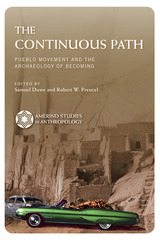 The Continuous Path: Pueblo Movement and the Archaeology of Becoming
Edited by Samuel Duwe and Robert W. Preucel
University of Arizona Press, 2019 Southwestern archaeology has long been fascinated with the scale and frequency of movement in Pueblo history, from great migrations to short-term mobility. By collaborating with Pueblo communities, archaeologists are learning that movement was—and is—much more than the result of economic opportunity or a response to social conflict. Movement is one of the fundamental concepts of Pueblo thought and is essential in shaping the identities of contemporary Pueblos.
The Continuous Path challenges archaeologists to take Pueblo notions of movement seriously by privileging Pueblo concepts of being and becoming in the interpretation of anthropological data. In this volume, archaeologists, anthropologists, and Native community members weave multiple perspectives together to write histories of particular Pueblo peoples. Within these histories are stories of the movements of people, materials, and ideas, as well as the interconnectedness of all as the Pueblo people find, leave, and return to their middle places. What results is an emphasis on historical continuities and the understanding that the same concepts of movement that guided the actions of Pueblo people in the past continue to do so into the present and the future.
Movement is a never-ending and directed journey toward an ideal existence and a continuous path of becoming. This path began as the Pueblo people emerged from the underworld and sought their middle places, and it continues today at multiple levels, integrating the people, the village, and the individual.
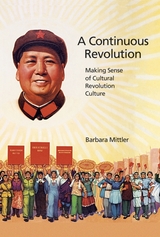 A Continuous Revolution: Making Sense of Cultural Revolution Culture
Barbara Mittler
Harvard University Press, 2012 Cultural Revolution Culture, often denigrated as nothing but propaganda, was liked not only in its heyday but continues to be enjoyed today. A Continuous Revolution sets out to explain its legacy. By considering Cultural Revolution propaganda art—music, stage works, prints and posters, comics, and literature—from the point of view of its longue durée, Barbara Mittler suggests it was able to build on a tradition of earlier art works, and this allowed for its sedimentation in cultural memory and its proliferation in contemporary China.
Taking the aesthetic experience of the Cultural Revolution (1966–1976) as her base, Mittler juxtaposes close readings and analyses of cultural products from the period with impressions given in a series of personal interviews conducted in the early 2000s with Chinese from diverse class and generational backgrounds. By including much testimony from these original voices, Mittler illustrates the extremely multifaceted and contradictory nature of the Cultural Revolution, both in terms of artistic production and of its cultural experience.
Continuous Time Controller Design
R. Balasubramanian
The Institution of Engineering and Technology, 1989 This book covers theoretical methods for the design of continuous time controllers for linear multivariate systems. It is intended for use by those wishing to build on a first course in control systems, either to expand their knowledge as practising engineers or as postgraduate students doing higher degrees in control engineering.
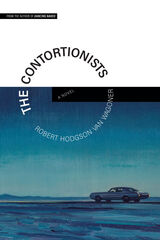 The Contortionists
Robert Hodgson Van Wagoner
Signature Books, 2020 When five-year-old Joshua Christopher disappears off the street as he walks to a friend’s birthday party, his family is forced to confront the unimaginable. What happened? Why? Who took him? The convicted sex offender caught lurking near the search? Why won’t police leave his family, his parents, alone?
In his second novel, his first in twenty years, Robert H. Van Wagoner explores a family in extremis tottering at the edge of faith: in God and church, in family, and in marriage, in the institutions that promise safety and meaning. Both lyrical and explosive, The Contortionists unfolds as a page-turning mystery. Van Wagoner’s wrenching narrative propels the reader forward, toward the novel’s harrowing climax, while deftly unpacking its major themes—mental illness, sexuality, and substance abuse in a culture that would rather not confront them. Does the truth ever set anyone ultimately free? The stakes for Joshua and his family could not be greater.
 The Contours of America’s Cold War
Matthew Farish
University of Minnesota Press, 2010 In The Contours of America's Cold War, Matthew Farish explores new ways of conceptualizing space as part of post-World War II American militarism. He demonstrates how the social sciences were militarized in the early Cold War period, producing spatial knowledge that was of immediate use to the state as it sought to expand its reach across the globe.
Geographic knowledge generated for the Cold War was a form of power, Farish argues, and it was given an urgency in the panels, advisory boards, and study groups established to address the challenges of an atomic world. He investigates how the scales of the city, the continent, the region, the globe, and, by extension, outer space, were brought together as strategic spaces, categories that provided a cartographic orientation for the Cold War and influenced military deployments, diplomacy, espionage, and finance.
Farish analyzes the surprising range of knowledge production involved in the project of claiming and classifying American space. Backed by military and intelligence funding, physicists and policy makers, soldiers and social scientists came together to study and shape the United States and its place in a divided world.
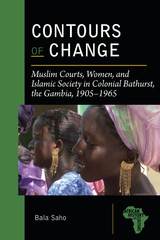 Contours of Change: Muslim Courts, Women, and Islamic Society in Colonial Bathurst, the Gambia, 1905-1965
Bala Saho
Michigan State University Press, 2018 Based on a previously unexamined body of qadi court records as well as two hundred oral interviews in Wolof and Mandinka, Contours of Change: Muslim Courts, Women, and Islamic Society in Colonial Bathurst, the Gambia, 1905–1965, offers a new perspective on the impact of British rule in West Africa. It focuses on the formation of present-day Banjul and the role of law, religion, and gender relations. Specifically, this volume explores how colonization affected the evolution of women’s understanding of the importance of law in securing their rights, and how urban women used the new qadi court system to fight for greater rights in the domestic sphere. The fascinating cases discussed in the text show that male Muslim judges often were sympathetic to women’s claims, and that, as a result, the qadi court created opportunities for women to acquire property rights and negotiate patriarchal relationships. Contours of Change sheds light on African subjectivities and the broader social, economic, and political changes taking place in colonial Gambian society during the first half of the twentieth century. This text breaks new ground in Senegambian history and makes a significant contribution to British colonial studies, African legal studies, Islam in Africa studies, and women’s history studies.
 Contours of Israeli Politics: Jewish Ethnicity, Religious Nationalism, and Democracy
Hannah M. Ridge
Temple University Press, 2025 There is no single Jewish ethnicity, and no single Jewish ethnic group constitutes a clear majority of Jewish Israelis. These intra-Jewish differences permit a social hierarchy within the “in-group” – Jewish Israelis – that privileges the Ashkenazi Jews of European descent over Mizrahi/Sephardi Jews of Middle Eastern backgrounds.
The timely Contours of Israeli Politics focuses on the socio-political ramifications of this hierarchy within the upper stratum of Israeli society. Using public opinion studies and qualitative data, Hannah Ridge examines the effects of this social hierarchy to address attitudes on Israeli ethnicity and religious majoritarianism, support for Israeli democracy, and preference for an expanded territorial state and peace with its neighbors.
As various Jewish ethnic groups face greater pressure to assert their in-group membership (their Jewishness), they are more likely to protect the status privileges of that group. This can strengthen their ideas about identity, nationalism, democratic values, and conflict attitudes. Ridge’s findings reveal the ways in which Jewish ethnicity continues to influence the politics of Israel, a Jewish ethno-religious state.
 Contours Of The Heart
Sunaina Maira
Rutgers University Press, 1998 This book comes at a critical time in the history of South Asians in North America. As the number of South Asian immigrants increases in the United States and Canada, a familiar tension has been the immigrant conflict between home as a physical site in North America and home as an emotional concept tied to the ancestral country, and the second generation's questioning of both notions. This anthology critically explores this familiar tension and the concept of "home." It focuses on the transformative experiences that lead individuals to declare or reject new forms of belonging in North America. Setting up "home" may require contesting existing roles, inventing hybrid identities, or seeking social and political change. The anthology challenges undifferentiated, stereotypical images of South Asians in North America, portraying instead the subtleties of their varied, sometimes invisible experiences. It includes fiction, poetry, essays, and photography.
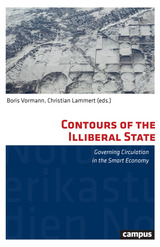 Contours of the Illiberal State: Governing Circulation in the Smart Economy
Edited by Boris Vormann and Christian Lammert
Campus Verlag, 2019 The post-Cold War era was marked by the emergence of unprecedented new networks of international private trade, cooperation, and circulation of goods that promised to render the state nearly obsolete—at least in theory. The essays collected in this book dissect the notions of this so-called “smart economy,” revealing the crucial role that government interventions still play in facilitating the production and the global flow of goods. The contributors focus particularly on the role played by the United States, often incorrectly assumed to be the most liberal and least interventionist in the global order. More than a mere market fixer, the United States has long assumed an outsized position in expediting the global circulation of goods through its supply chains and communication channels. Drawing from such diverse fields as political science, urban sociology, and cultural studies, Contours of the Illiberal State takes a broad interdisciplinary look at how nations became active market enablers.
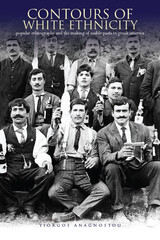 Contours of White Ethnicity: Popular Ethnography and the Making of Usable Pasts in Greek America
Yiorgos Anagnostou
Ohio University Press, 2009 In Contours of White Ethnicity, Yiorgos Anagnostou explores the construction of ethnic history and reveals how and why white ethnics selectively retain, rework, or reject their pasts. Challenging the tendency to portray Americans of European background as a uniform cultural category, the author demonstrates how a generalized view of American white ethnics misses the specific identity issues of particular groups as well as their internal differences. Interdisciplinary in scope, Contours of White Ethnicity uses the example of Greek America to illustrate how the immigrant past can be used to combat racism and be used to bring about solidarity between white ethnics and racial minorities. Illuminating the importance of the past in the construction of ethnic identities today, Anagnostou presents the politics of evoking the past to create community, affirm identity, and nourish reconnection with ancestral roots, then identifies the struggles to neutralize oppressive pasts. Although it draws from the scholarship on a specific ethnic group, Contours of White Ethnicity exhibits a sophisticated, interdisciplinary methodology, which makes it of particular interest to scholars researching ethnicity and race in the United States and for those charting the directions of future research for white ethnicities.
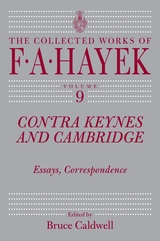 Contra Keynes and Cambridge: Essays, Correspondence
F. A. Hayek
University of Chicago Press, 1995 In 1931, when the young F. A. Hayek challenged the economic theories of John Maynard Keynes, sixteen years his senior, and one of the world's leading economists, he sparked a spirited debate that would influence economic policy in democratic countries for decades. Their extensive exchange lasted until Keynes's death in 1946, and is reprinted in its entirety in this latest volume of The Collected Works of F. A. Hayek.
When the journal Economica published a review of Keynes's Treatise on Money by Hayek in 1931, Keynes's response consisted principlally of an attack on Hayek's own work on monetary theory, Prices and Production. Conducted almost entirely in economics journals, the battle that followed revealed two very different responses to a world in economic crisis. Keynes sought a revision of the liberal political order—arguing for greater government intervention in the hope of protecting against the painful fluctuations of the business cycle. Hayek instead warned that state involvement would cause irreparable damage to the economy.
This volume begins with Hayek's 1963 reminiscence "The Economics of the 1930s as Seen from London," which has never been published before. The articles, letters, and reviews from journals published in the 1930s are followed by Hayek's later reflections on Keynes's work and influence. The Introduction by Bruce Caldwell puts the debate in context, providing detailed information about the economists in Keynes's circle at Cambridge, their role in the acceptance of his ideas, and the ways in which theory affected policy during the interwar period.
Caldwell calls the debate between Hayek and Keynes "a battle for the minds of the rising generation of British-trained economists." There is no doubt that Keynes won the battle during his lifetime. Now, when many of Hayek's ideas have been vindicated by the collapse of collectivist economies and the revival of the free market around the world, this book clarifies Hayek's work on monetary theory—formed in heated opposition to Keynes—and illuminates his efforts to fight protectionism in an age of economic crisis.
F. A. Hayek (1899-1992), recipient of the Medal of Freedom in 1991 and co-winner of the Nobel Memorial Prize in Economics in 1974, was a pioneer in monetary theory and the principal proponent of classical liberal thought in the twentieth century. He taught at the University of London, the University of Chicago, and the University of Freiburg.
 Contraband Cultures: Reframing Smuggling across Latin America and the Caribbean
Edited by Jennifer Cearns and Charles Beach
University College London, 2024 A fresh and non-stereotypical take on smuggling in Latin America.
Contraband Cultures reframes smuggling activities across Latin America (including the Caribbean) and its diasporas through the lenses of kinship, political movements, economic exchange, and resistance to capitalist state hegemony, countering the popular representations of smuggling in the region as chaotic, lawless, violent, and exotic.
This book includes a broad range of chapters from social science and humanities scholars, and it uses various methodologies, theoretical traditions, and analytic approaches to explore the efficacy and valence of smuggling as a lens to examine personhood, materiality, statehood, and political (dis)connection across Latin America. Its combination of historic documentation and contemporary ethnographic research highlights the development of these cultural practices while grounding them in the capitalist and colonial refashioning of the entire region since the sixteenth century.
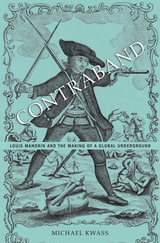 Contraband: Louis Mandrin and the Making of a Global Underground
Michael Kwass
Harvard University Press, 2014 Louis Mandrin led a gang of bandits who brazenly smuggled contraband into eighteenth-century France. Michael Kwass brings new life to the legend of this Gallic Robin Hood and the thriving underworld he helped to create. Decades before the storming of the Bastille, surging world trade excited a revolution in consumption that transformed the French kingdom. Contraband exposes the dark side of this early phase of globalization, revealing hidden connections between illicit commerce, criminality, and popular revolt.
France's economic system was tailor-made for an enterprising outlaw like Mandrin. As French subjects began to crave colonial products, Louis XIV lined the royal coffers by imposing a state monopoly on tobacco from America and an embargo on brilliantly colored calico cloth from India. Vigorous black markets arose through which traffickers fed these exotic goods to eager French consumers. Flouting the law with unparalleled panache, Mandrin captured widespread public attention to become a symbol of a defiant underground.
This furtive economy generated violent clashes between gangs of smugglers and customs agents in the borderlands. Eventually, Mandrin was captured by French troops and put to death in a brutal public execution intended to demonstrate the king's absolute authority. But the spectacle only cemented Mandrin's status as a rebel folk hero in an age of mounting discontent. Amid cycles of underground rebellion and agonizing penal repression, the memory of Mandrin inspired ordinary subjects and Enlightenment philosophers alike to challenge royal power and forge a movement for radical political change.
Contraband of Hoopoe
Ewa Chrusciel
Omnidawn, 2014 Contraband of Hoopoe explores issues of dislocation, immigration and desire. Chrusciel invents a poetics of smuggling as she crosses national, historical and linguistic borders. The migratory narrative is distinctly errant, haunted by a childhood lived under a Communist regime, by the austerity of Eastern block politics, and by the possibility of discovering a fleeting language to carry the seeds of illicit revelation, spiritual transformation, and insight. The book elevates smuggling to a noble art, recording how the Jewish people were hidden and transported during the Holocaust. Chrusciel tracks a series of historical objects and secret messages that immigrants throughout history have been sneaking through customs, past border checkpoints, and across the seas.
Contraception: A History of Its Treatment by the Catholic Theologians and Canonists, Enlarged Edition
John T. Noonan Jr.
Harvard University Press, 1986 Originally published in 1965, Contraception received unanimous acclaim from all quarters as the first thorough, scholarly, objective analysis of Catholic doctrine on birth control. More than ever this subject is of acute concern to a world facing serious population problems, and the author has written an important new appendix examining the development of and debates over the doctrine in the past twenty years. John T. Noonan, Jr., traces the Church’s position from its earliest foundations to the present, and analyzes the conflicts and personal decisions that have affected the theologians’ teachings on the subject.
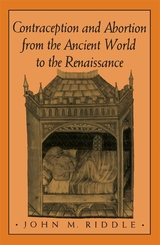 Contraception and Abortion from the Ancient World to the Renaissance
John M. Riddle
Harvard University Press, 1992 John Riddle uncovers the obscure history of contraception and abortifacients from ancient Egypt to the seventeenth century with forays into Victorian England—a topic that until now has evaded the pens of able historians.
Riddle’s thesis is, quite simply, that the ancient world did indeed possess effective (and safe) contraceptives and abortifacients. The author maintains that this rich body of knowledge about fertility control—widely held in the ancient world—was gradually lost over the course of the Middle Ages, becoming nearly extinct by the early modern period. The reasons for this he suggests, stemmed from changes in the organization of medicine. As university medical training became increasingly important, physicians’ ties with folk traditions were broken. The study of birth control methods was just not part of the curriculum.
In an especially telling passage, Riddle reveals how Renaissance humanists were ill equipped to provide accurate translations of ancient texts concerning abortifacients due to their limited experience with women’s ailments. Much of the knowledge about contraception belonged to an oral culture—a distinctively female-centered culture. From ancient times until the seventeenth century, women held a monopoly on birthing and the treatment of related matters; information passed from midwife to mother, from mother to daughter. Riddle reflects on the difficulty of finding traces of oral culture and the fact that the little existing evidence is drawn from male writers who knew that culture only from a distance. Nevertheless, through extraordinary scholarly sleuthing, the author pieces together the clues and evaluates the scientific merit of these ancient remedies in language that is easily understood by the general reader. His findings will be useful to anyone interested in learning whether it was possible for premodern people to regulate their reproduction without resorting to the extremities of dangerous surgical abortions, the killing of infants, or the denial of biological urges.
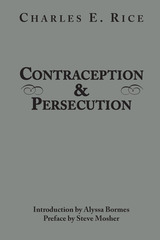 Contraception and Persecution
Charles E. Rice
St. Augustine's Press, 2014 “Contraceptive sex,” wrote social science researcher Mary Eberstadt in 2012, “is the fundamental social fact of our time.” In this important and pointed book, Charles E. Rice, of the Notre Dame Law School, makes the novel claim that the acceptance of contraception is a prelude to persecution. He makes the striking point that contraception is not essentially about sex. It is a First Commandment issue: Who is God? It was at the Anglican Lambeth Conference of 1930 when for the first time a Christian denomination said that contraception could ever be a moral choice. The advent of the Pill in the 1960s made the practice of contraception practically universal. This involved a massive displacement of the Divine Law as a normative measure of conduct, not only on sex but across the board. Nature abhors a vacuum. The State moved in to occupy the place formerly held by God as the ultimate moral Lawgiver. The State put itself on a collision course with religious groups and especially with the Catholic Church, which continues to insist on that traditional teacher. A case in point is the Obama Regime’s Health Care Mandate, coercing employees to provide, contrary to conscience, abortifacients and contraceptives to their employees. The first chapter describes that Mandate, which the Catholic bishops have vowed not to obey. Rice goes on to show that the duty to disobey an unjust law that would compel you to violate the Divine Law does not confer a general right to pick and choose what laws you will obey. The third chapter describes the “main event,” which is the bout to determine whether the United States will conform its law and culture to the homosexual (LGBTQ) lifestyle in all its respects. “The main event is well underway and LGBTQ is well ahead on points.” Professor Rice follows with a clear analysis of the 2013 Supreme Court decision on same-sex marriage. Part II presents some “underlying causes” of the accelerating persecution of the Catholic Church. The four chapter headings in this part outline the picture: The Dictatorship of Relativism; Conscience Redefined; The Constitution: Moral Neutrality; and The Constitution: Still Taken Seriously? The answer to the last question, as you might expect, is: No. Part III, the controversial heart of the book, prese nts contraception as “an unacknowledged cause” of persecution. The first chapter argues that contraception is not just a “Catholic issue.” The next chapter describes the “consequences” of contraception and the treatment of women as objects. The third chapter spells out in detail the reality that contraception is a First Commandment issue and that its displacement of God as the ultimate moral authority opened the door for the State to assume that role, bringing on a persecution of the Church. The last chapter, “A Teaching Untaught,” details the admitted failure of the American Catholic bishops to teach Pope Paul VI’s 1968 encyclical, Humanae Vitae. But Rice offers hope that the bishops are now getting their act together Part IV offers as a “response” to the persecution of the Church three remedies: Speak the Truth with clarity and charity; Trust God; and, most important, Pray. As the last sentence in the book puts it: “John Paul II wrote in a letter to U.S. bishops in 1993: ‘America needs much prayer – lest it lose its soul.’” This readable and provocative book is abundantly documented with a detailed index of names and subjects.
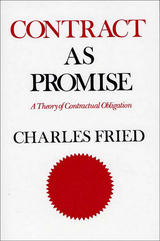 Contract as Promise
Charles Fried
Harvard University Press, 1981 This book displays the underlying structure of a complex body of law and integrates that structure with moral principles.
Charles Fried grounds the basic legal institution of contract in the morality of promise, under which individuals incur obligations freely by invoking each other's trust. Contract law and the promise principle are contrasted to the socially imposed obligations of compensation, restitution, and sharing, which determine the other basic institutions of private law, and which come into control where the parties have not succeeded in invoking the promise principle--as in the case of mistake or impossibility. Professor Fried illustrates his argument with a wide range of concrete examples; and opposing views of contract law are discussed in detail, particularly in connection with the doctrines of good faith, duress, and unconscionability.
For law students and legal scholars, Contract asPromise offers a coherent survey of an important legal concept. For philosophers and social scientists, the book is a unique demonstration of the practical and detailed entailments of moral theory.
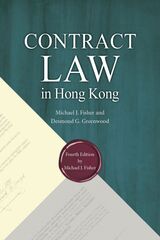 Contract Law in Hong Kong
Michael J. Fisher and Desmond G. Greenwood
Hong Kong University Press, 2024 A new edition of the textbook for Hong Kong contract law students.
This fourth edition of Contract Law in Hong Kong is the most comprehensive contemporary textbook on Hong Kong contract law written primarily for law students. The sixteen chapters of the book cover all basic contract concepts in a reader-friendly style and make ample use of case illustrations, including over 200 new cases since the third edition. The book deals with the core areas of contract law. The new legislative rules, such as the Contract Ordinance regarding the rights of third parties, have also been covered.
The first two chapters introduce the major themes and explain the multiple sources of law in Hong Kong. The subsequent thirteen chapters cover the formation of a valid contract, its contents, "vitiating" elements, the consequences of illegality, the termination of contracts, and remedies for breach of contract. The book concludes with an explanation of the doctrine of privity and the legislative reform of the operation of privity in Hong Kong. Particular attention is given to what makes Hong Kong law different from other common law jurisdictions, and to the continuing significance of English case law in Hong Kong.
|
|
